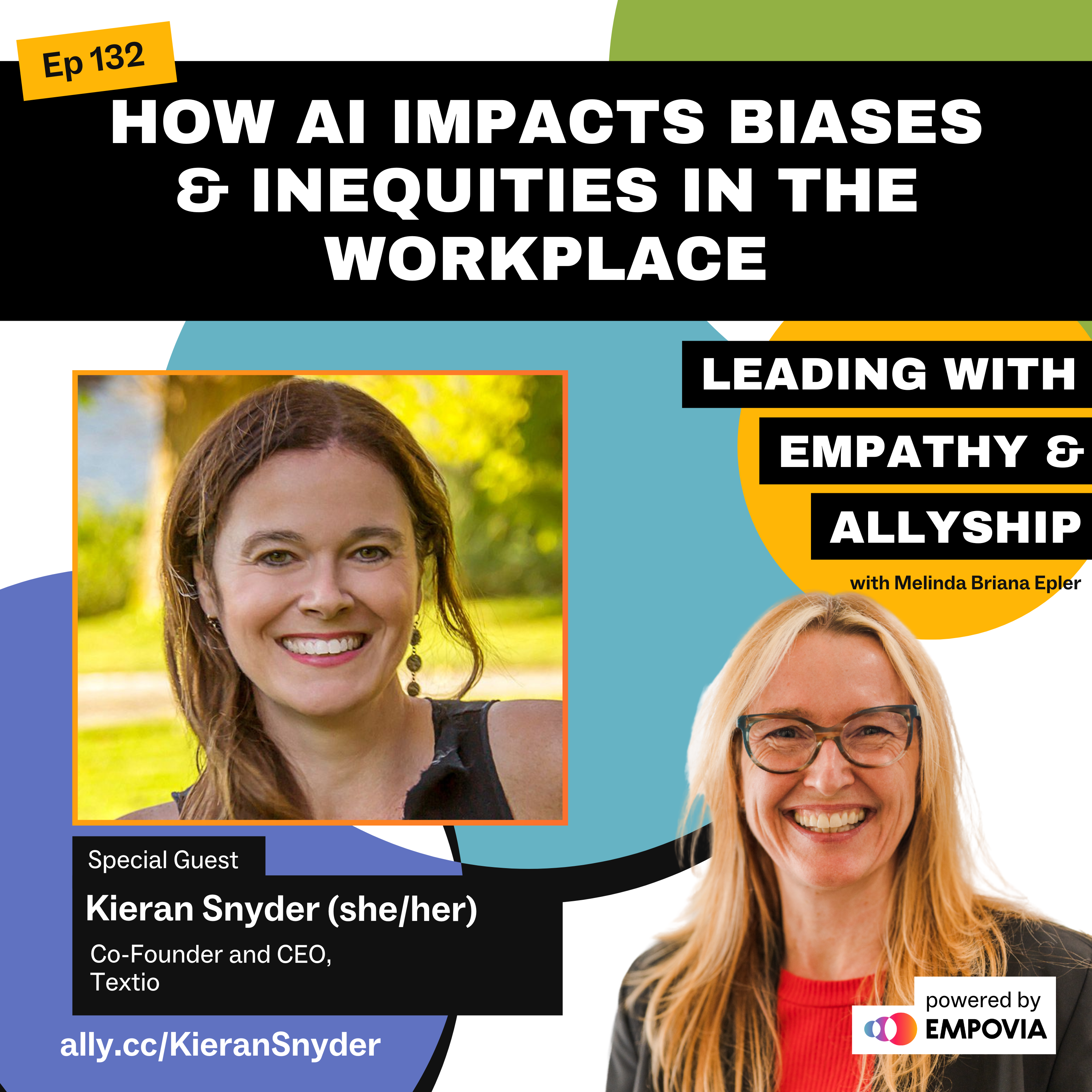
| 47 min
How does generative AI impact teams? And what can we do to mitigate the impact of biased AI?
In Episode 132, Kieran Snyder, Co-Founder and CEO at Textio, joins Melinda in an insightful discussion about the impact of AI on workplace biases and inequities. They explore the potential harm and social biases perpetuated by generative AI, and look closely at how this applies to performance reviews. They also discuss key factors business leaders should consider when they adopt AI solutions in their teams, including recognizing these biases, establishing accountability systems that support DEI efforts, and safeguarding confidential employee information.
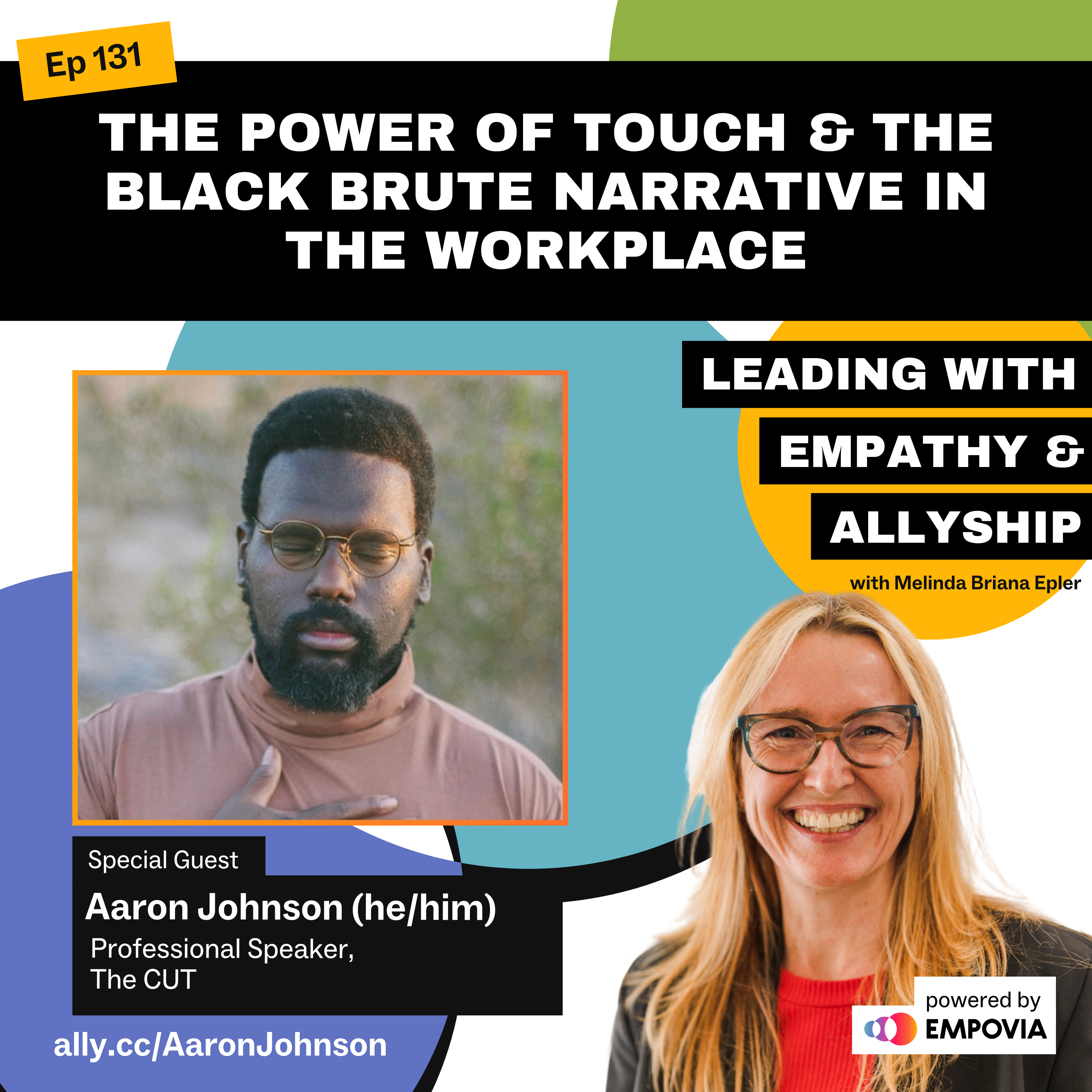
| 46 min
What is holistic resistance? How can we practice it to break historical narratives and challenge oppression in the workplace?
In Episode 131, Aaron Johnson, Professional Speaker at The CUT, joins Melinda in an honest conversation on the power of touch and the Black brute narrative in the workplace. They explore holistic resistance as a response to the profound impact of the Black brute narrative on African heritage men. They discuss ways this narrative shows up in the workplace, including through a lack of safe space where Black men can be vulnerable, set boundaries, and protect themselves when those boundaries are violated. They also discuss the relationship between White women and Black men and how each of us can advocate for anti-racism in the fight against oppression.
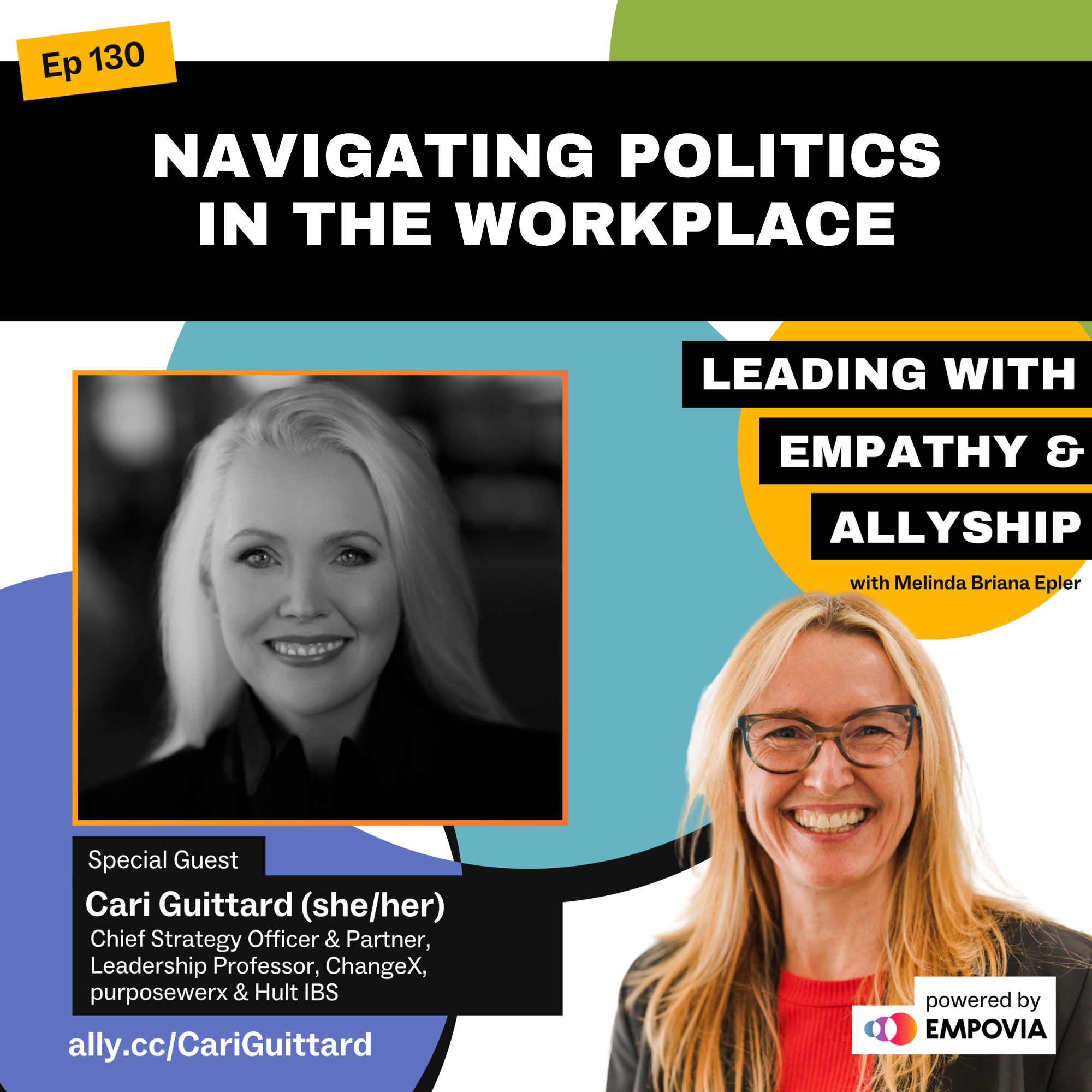
| 56 min
What exactly is political intelligence? And why is it important to have in the workplace?
In Episode 130, Cari Guittard, Chief Strategy Officer & Partner at ChangeX & purposewerx and Leadership Professor at Hult International Business School, joins Melinda in a conversation around the constructive approach to addressing politics within the workplace. Drawing from her multiple experiences in the DEI, ESG, and political fields, Cari delves into practical tools to develop our political intelligence. She discusses why this skill set can be necessary for advancing our careers and positioning ourselves as purpose-driven leaders, the importance of curiosity in political conversations, and how it can enhance our situational awareness to adapt effectively to moments of transition or crisis. She also taps into how organizations can respond to anti-wokeness in a way that opens the door for creativity and creates positive change at work.

Welcome To Leading With Empathy & Allyship
Join us each week for deep, real conversations about how we can all lead the change in our workplaces and communities. In intimate conversations with advocates, activists, and allies, host Melinda Briana Epler provides a safe space to learn, build empathy for each other, and understand tangible actions we can all take to create diverse, equitable, and inclusive workplaces.
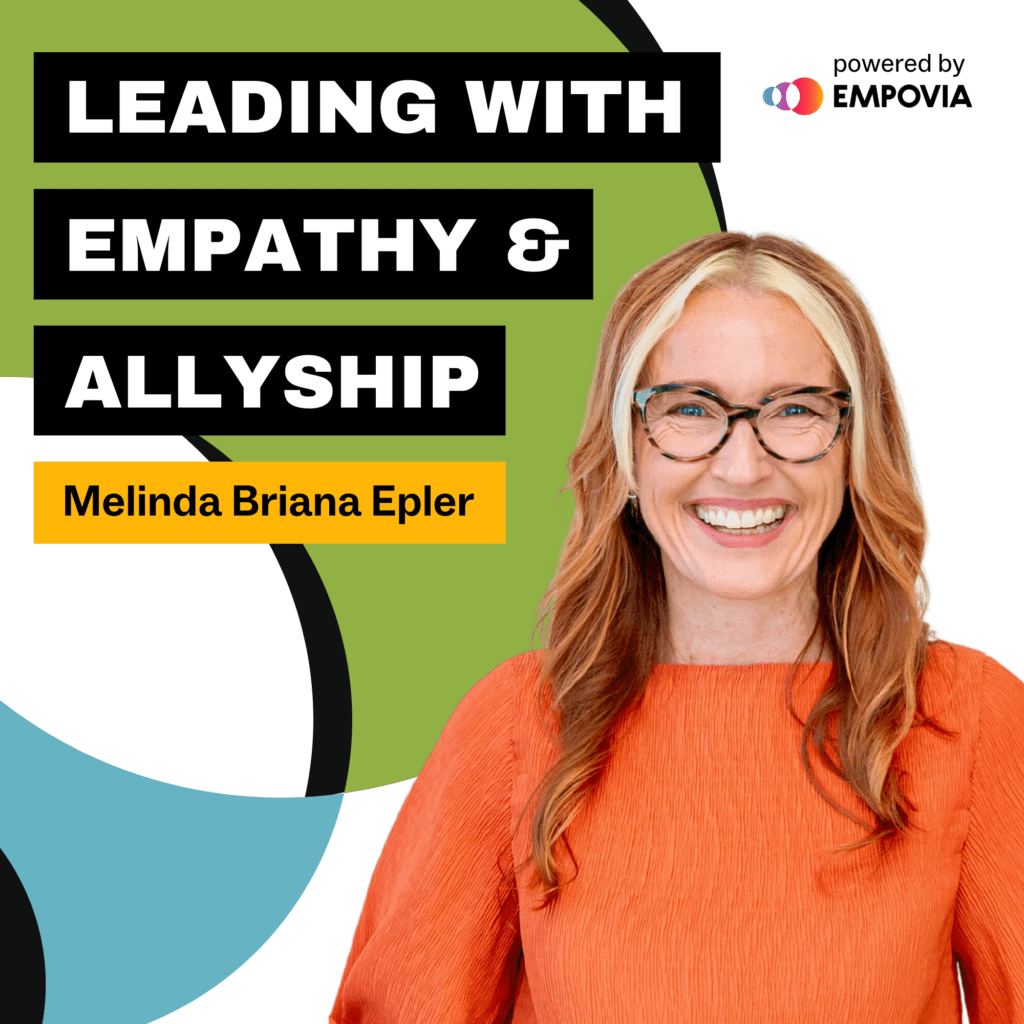
Thank You

A special thank our sponsor, Interpreter-Now, for supporting Leading With Empathy & Allyship. Learn more at interpreter-now.com
Featured In…




Explore Our Episodes
- Season 1
- Season 2
- Season 3
- Season 4
- Season 5
- Season 6
- Season 7
- Season 8
- Season 9
- Season 10
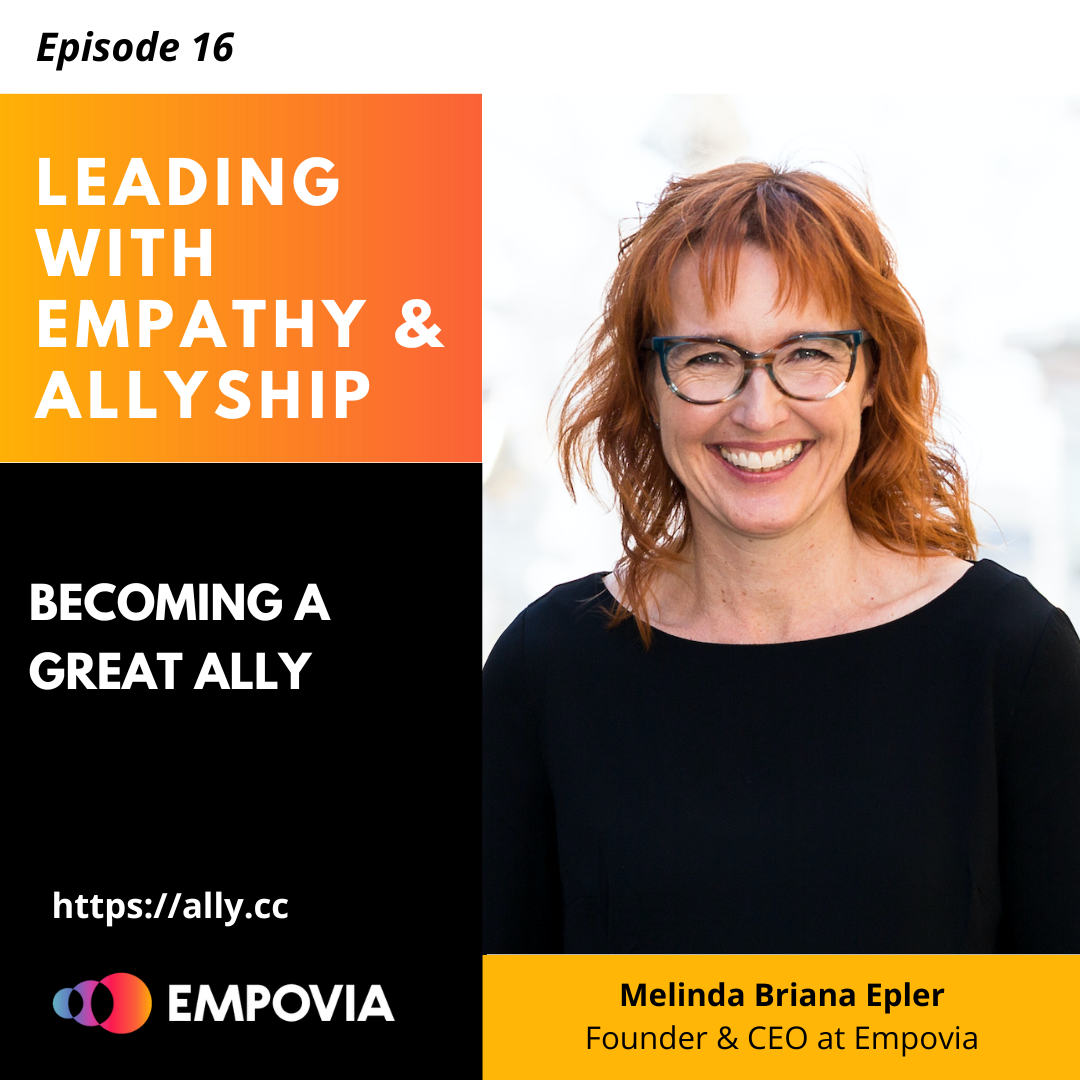
| 44 min
Join Leading With Empathy and Allyship Host Melinda Briana Epler, Founder & CEO of Change Catalyst, as she shares what it means to be an ally in 2020. She’ll discuss her own path to allyship and the Stages of Allyship. She touches on ways to be anti-racist, interrupt microaggressions, and address systemic inequities in the workplace, and of course some very tangible ways you can be a better ally in the workplace.
This is the end of Season 1 – we will be back with Season 2 in early September!
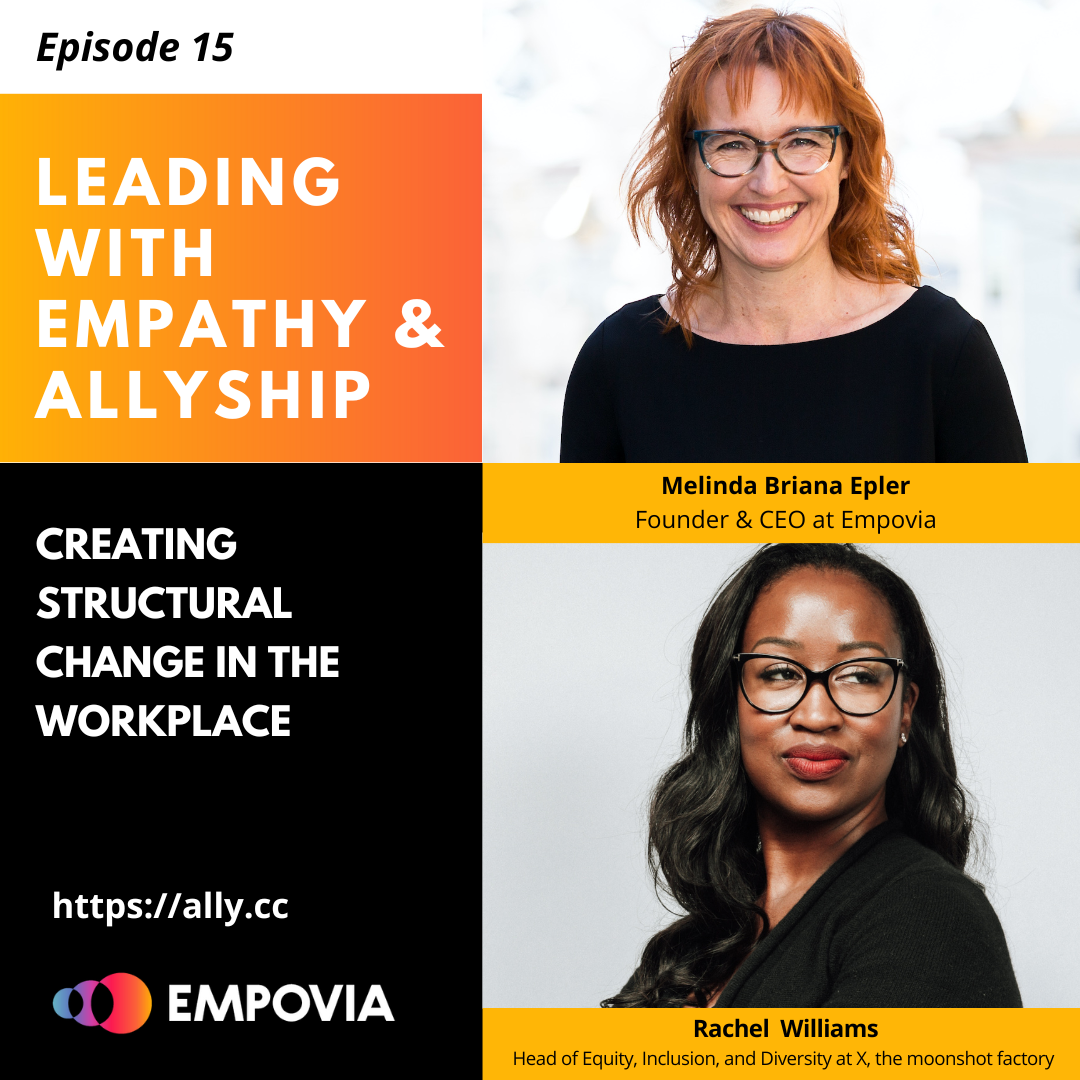
| 49 min
Join Change Catalyst Founder & CEO Melinda Briana Epler with Rachel Williams, Head of Equity, Inclusion & Diversity at X – the moonshot factory to discuss Creating Structural Change in the Workplace.
Learn more about Rachel on her website: www.rachelannwilliams.com/
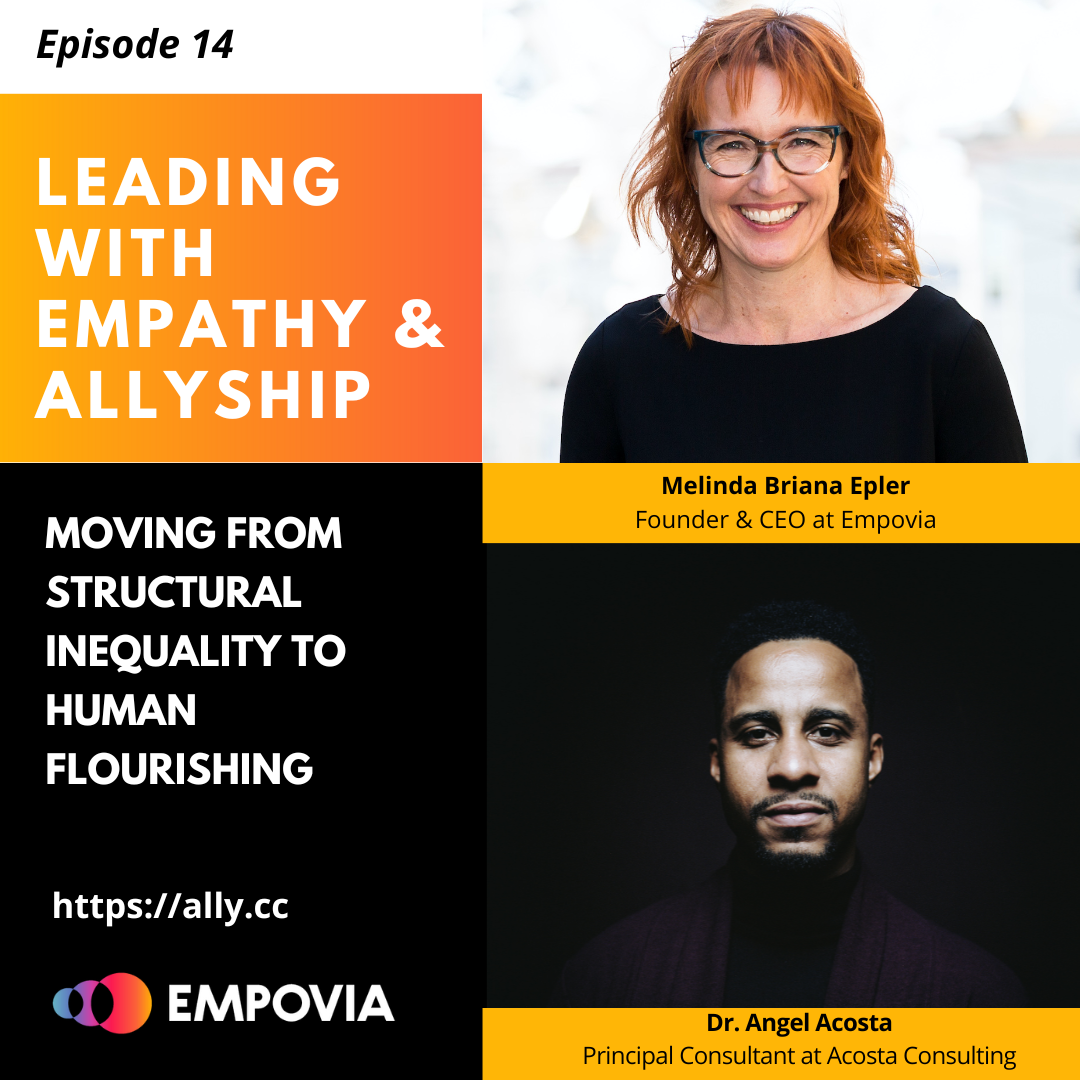
Join Change Catalyst Founder & CEO Melinda Briana Epler with Dr. Angel Acosta, Principal Consultant at Acosta Consulting to discuss Moving From Structural Inequality to Human Flourishing.
Learn more about Dr. Angel Acosta at www.drangelacosta.com/
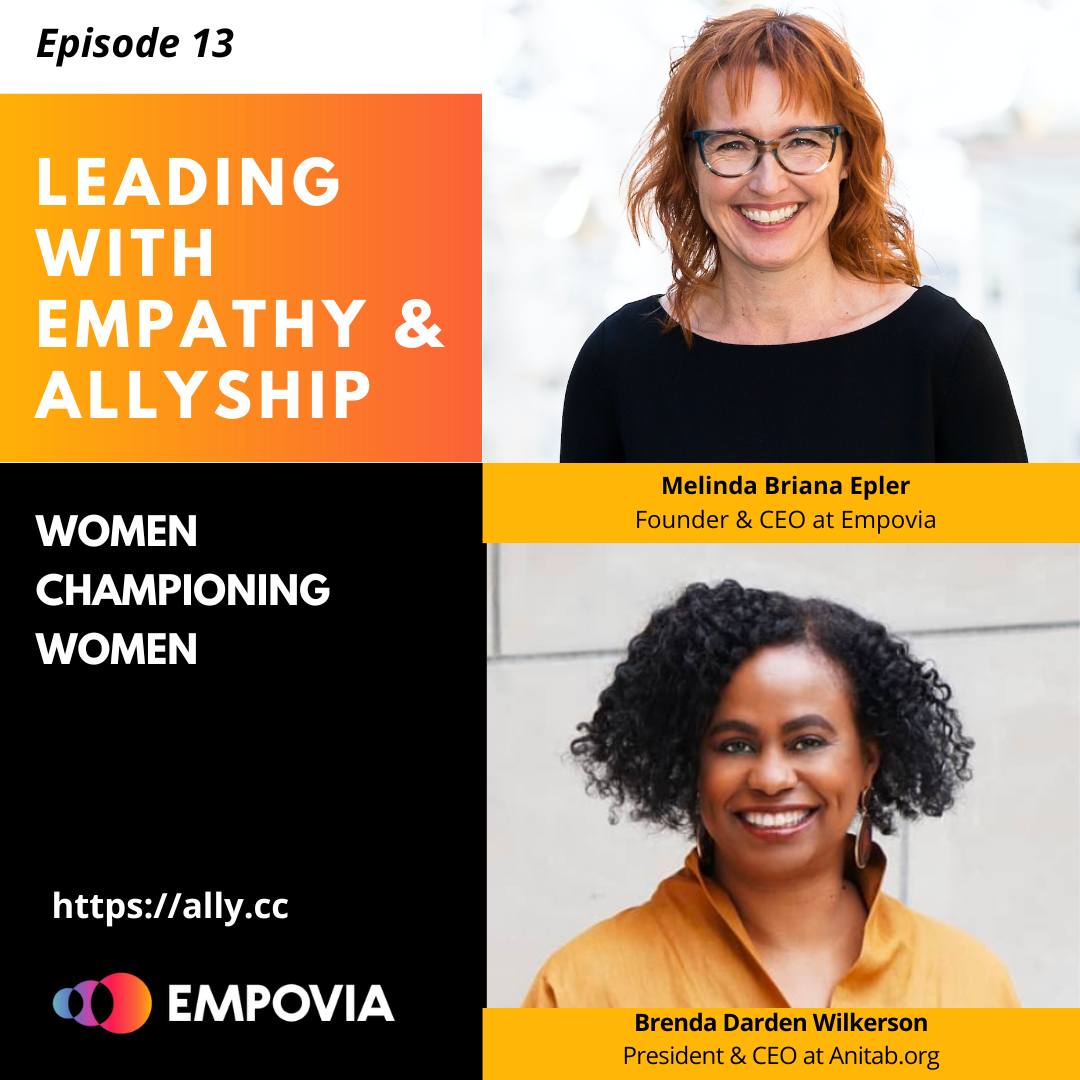
| 46 min
Join Change Catalyst Founder & CEO Melinda Briana Epler with Brenda Darden Wilkerson, President & CEO at Anitab.org to discuss Women Championing Women.
We address the role allyship plays in advancing gender and racial equity for Black women, how women can better support and champion other women, and how companies can support women and build allyship between women.
Learn more about Brenda’s work at https://anitab.org/
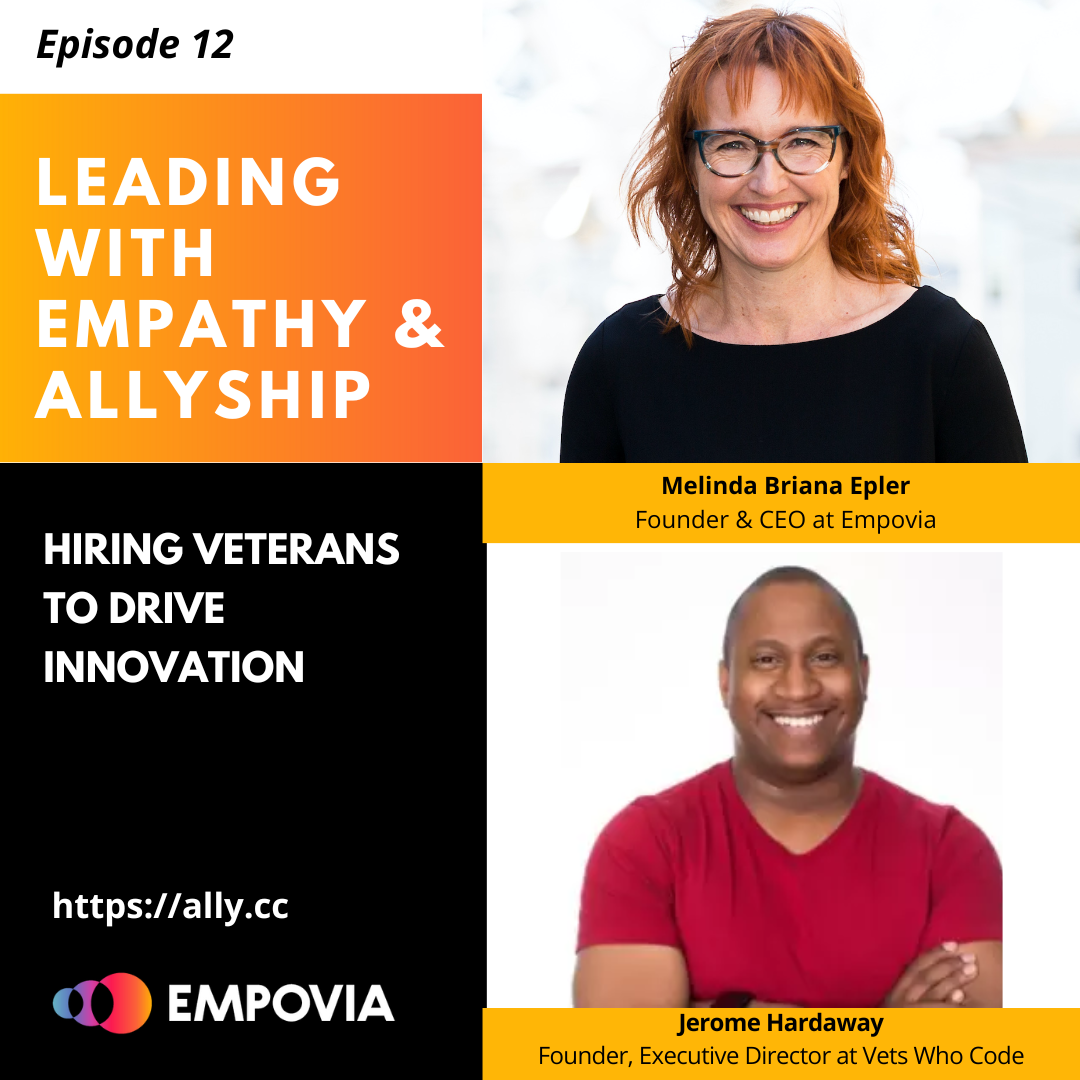
Join Change Catalyst Founder & CEO Melinda Briana Epler with Jerome Hardaway, Founder & Executive Director at Vets Who Code to discuss Hiring Veterans to Drive Innovation.
Learn more about Jerome’s work at vetswhocode.io/ or donate at vetswhocode.io/donate/
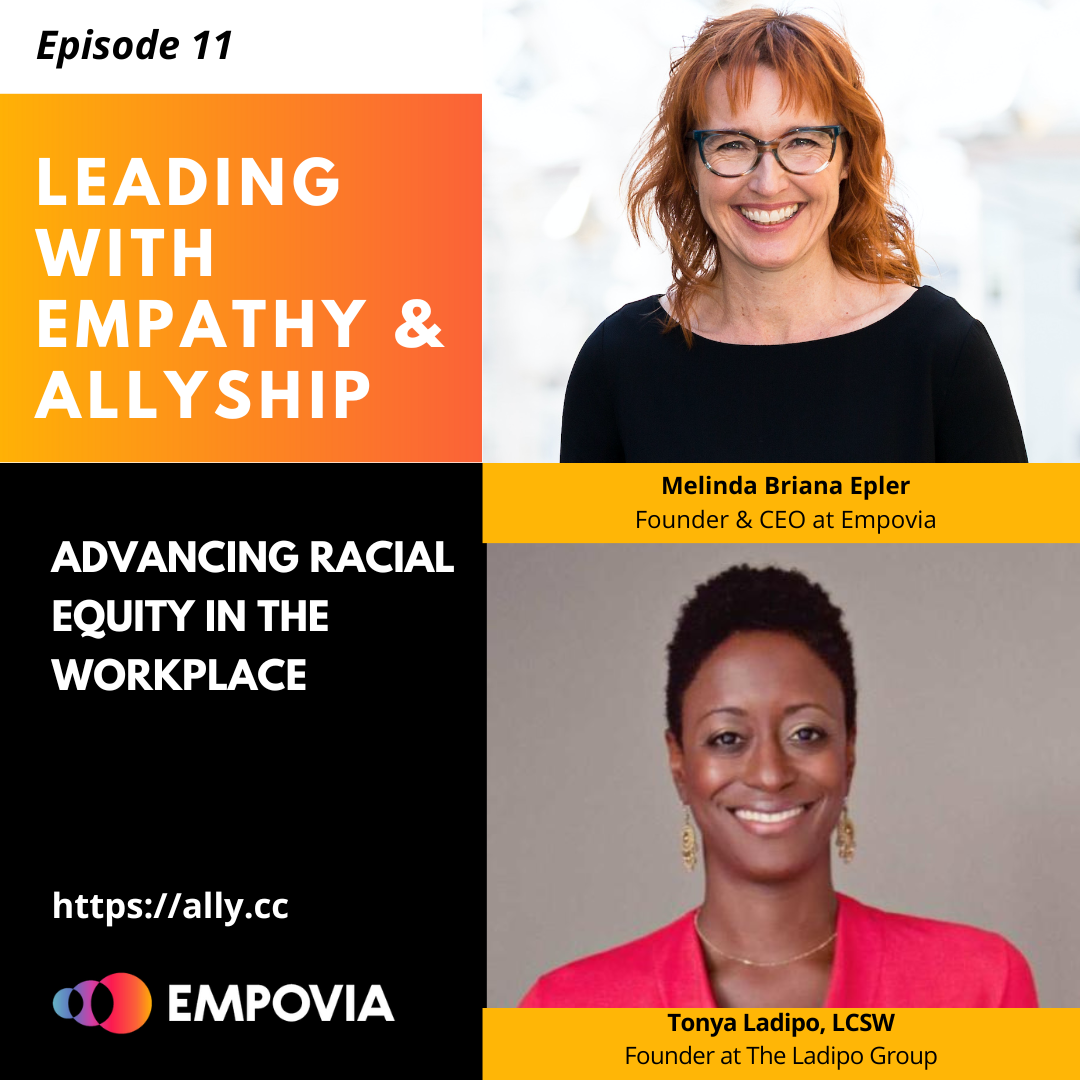
| 42 min
Join Change Catalyst Founder & CEO Melinda Briana Epler with Tonya Ladipo, Founder of The Ladipo Group to discuss Advancing Racial Equity in the Workplace.
Learn more about Tonya’s work at theladipogroup.com/.
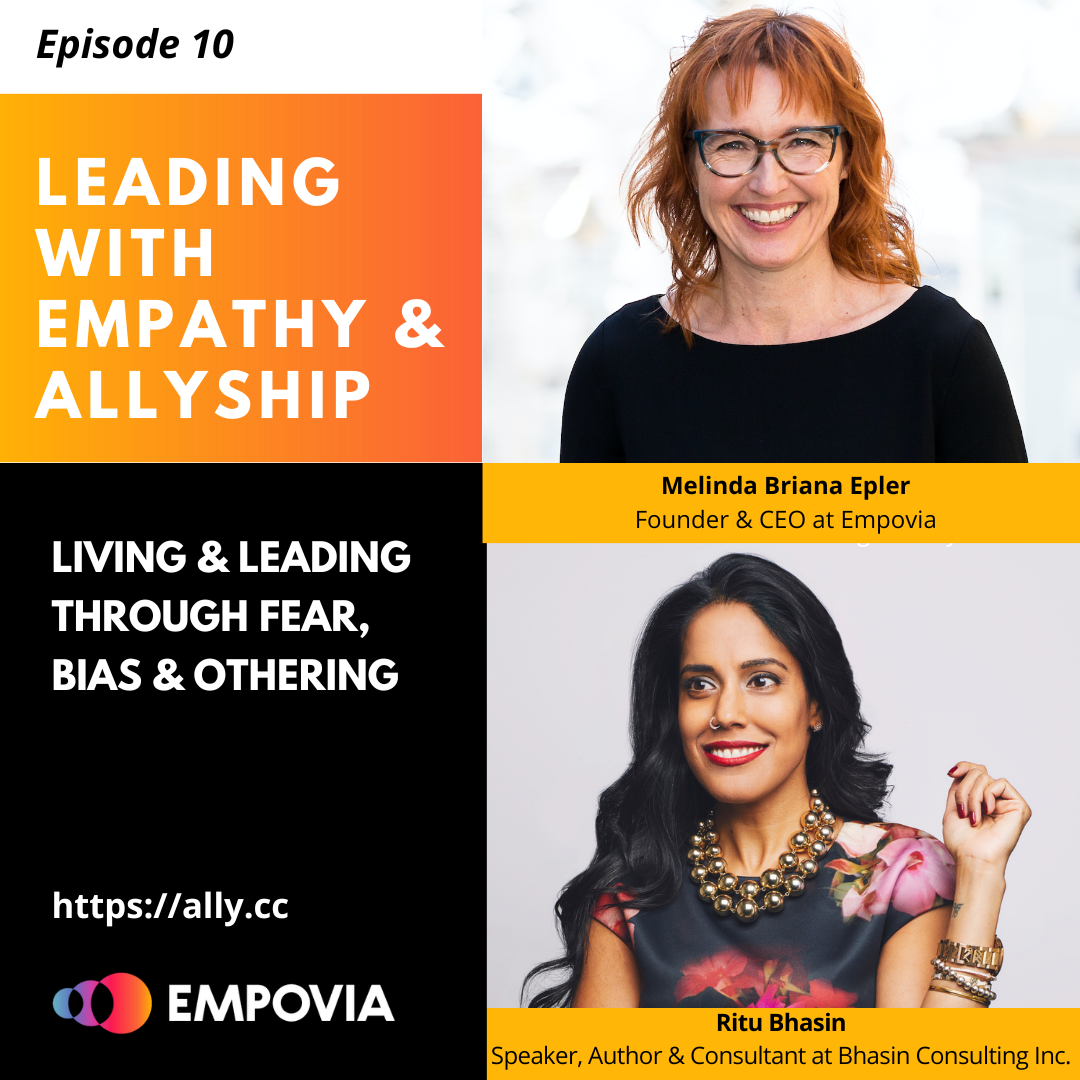
| 48 min
Join Change Catalyst Founder & CEO Melinda Briana Epler with Ritu Bhasin, Speaker, Author & Consultant at Bhasin Consulting Inc. to discuss Living & Leading through Fear, Bias & Othering.
Learn more about Ritu’s work at bhasinconsulting.com/
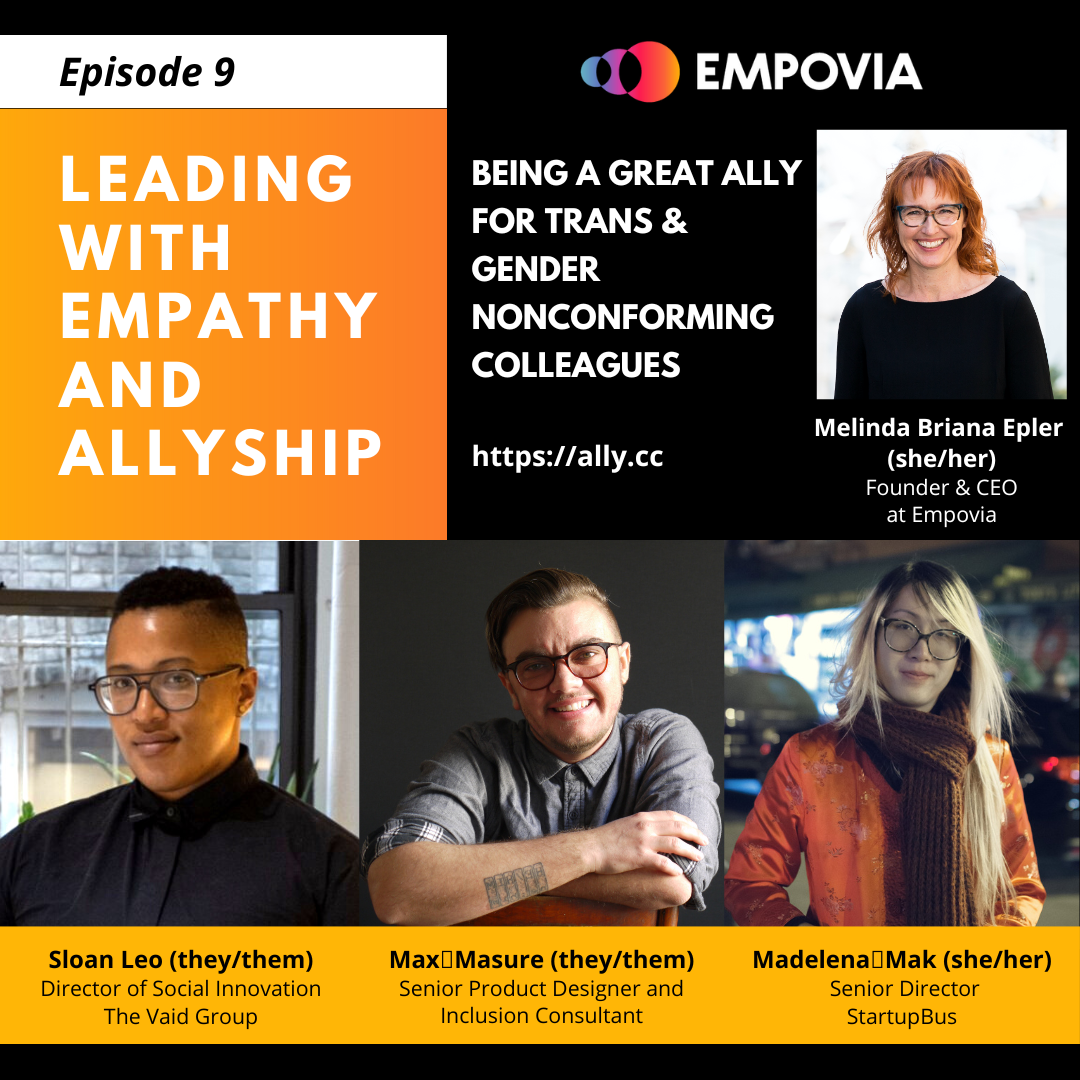
| 42 min
Join Change Catalyst Founder & CEO Melinda Briana Epler (she/her) with Sloan Leo (they/them), Max Masure (they/them) and Madelena Mak (she/her) to discuss Being a Great Ally for Trans and Gender Nonconforming Colleagues.
Learn more about Sloan’s work at sloanleo.com/ and thevaidgroup.com/
Learn more about Max’s work at www.maxmasure.com/
Learn more about Madelena’s work at startupbus.com/
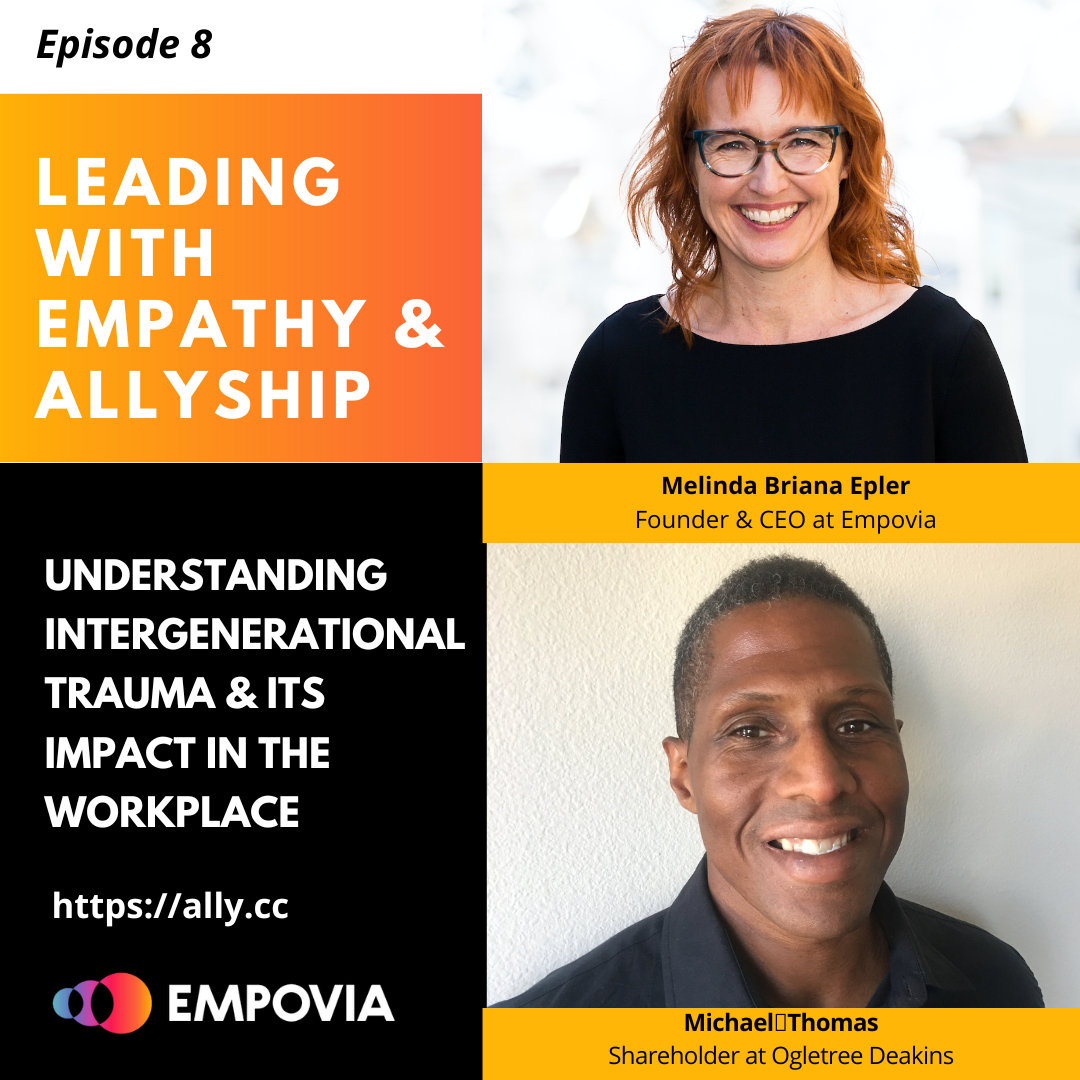
| 44 min
Join Change Catalyst Founder & CEO Melinda Briana Epler with Michael Thomas, Shareholder at Ogletree Deakins to discuss Intergenerational Trauma & Its Impact in the Workplace.
We discuss deep, intergenerational racial trauma that can be passed from generation to generation. We explore how that can show up physically, emotionally and spiritually; what some triggers are; how we can recognize and heal these in ourselves; and how we can collectively recognize and correct continued trauma and make space for healing.
Please note this episode does talk about trauma, as well as ways to heal. Please make sure you watch in a safe space where you have time to reflect and practice self-care afterward.
Learn more about Michael’s work at ogletree.com/ and www.linkedin.com/in/michael-thomas-46b7a212/.
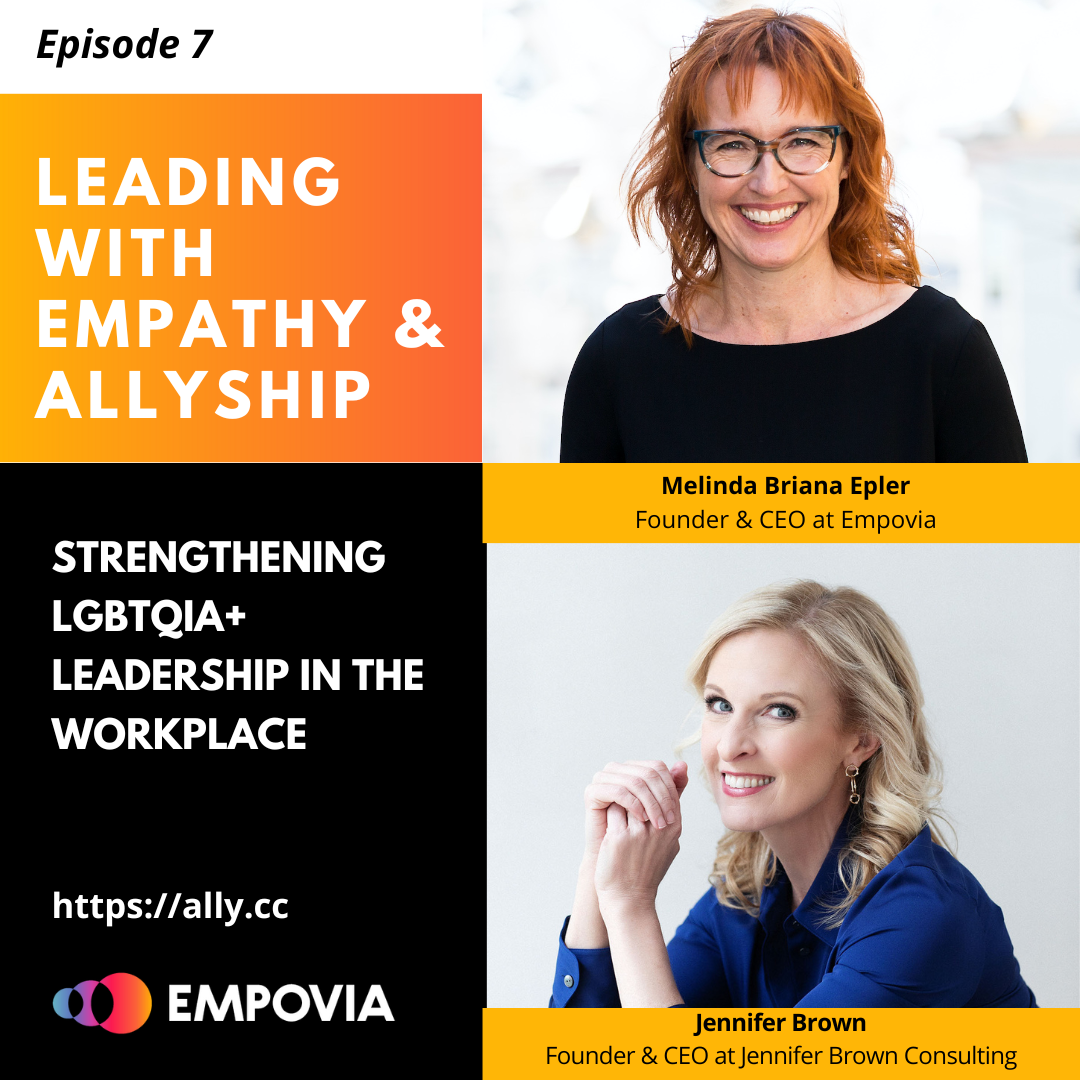
| 47 min
In this episode, Change Catalyst CEO Melinda Briana Epler speaks with Jennifer Brown, Founder & CEO of Jennifer Brown Consulting, about Strengthening LGBTQIA+ Leadership in the Workplace. We discuss language, covering, coming out, intersectionality, employee resource groups, and creating safe and inclusive workplaces.
Learn more about Jennifer’s work at jenniferbrownspeaks.com/

| 42 min
In this episode, Change Catalyst Founder & CEO Melinda Briana Epler speaks with Najeeba Syeed, Associate Professor of Interreligious Education at Claremont School of Theology on Empathy, Islamophobia and Muslim Identity.
Learn more about Najeeba’s work at najeeba.com and twitter.com/NajeebaSyeed

| 39 min
Join Change Catalyst Founder & CEO Melinda Briana Epler with Tiffany Yu, CEO & Founder at Diversability to discuss ways to be an effective ally and advocate for people with a wide diversity of disabilities.
In this episode, we talk about Tiffany’s disability origin story, and her path to growing into her disability identity. We speak a bit about #NoBodyIsDisposable and what people with disabilities are experiencing during COVID19. Tiffany shares her experience as a person with intersectional identities as an Asian disabled woman, we discuss the significance of the 30th Anniversary of the Americans with Disabilities Act (ADA), and go over disability identity language. And we go over many ways that leaders can better lead with empathy and allyship for people with disabilities.

| 40 min
Join Change Catalyst Founder & CEO Melinda Briana Epler with Daisy Auger-Domínguez, CEO of Auger-Domínguez Ventures, to discuss Amplifying the Latinx Experience in the Workplace. Daisy has been an executive at Moody’s, Time Warner, Disney, Google and Viacom, and is the new Chief People Officer at Vice Media Group.
In this episode, we talk about Daisy’s path to leadership as a Dominican-Puerto Rican – a journey full of sponsors and allies that believed in her, promoted her, pushed her and supported her. We discuss the difference between Hispanic, Latino/Latina, and Latinx, and we dive deep into how to create change through amplification. Finally, we discuss what individuals can do to be great allies and create culture change within organizations.
Learn more about Daisy’s work at daisyauger-dominguez.com

| 39 min
Join Change Catalyst Founder & CEO Melinda Briana Epler with Vanessa Roanhorse, CEO at Roanhorse Consulting to discuss Indigenous Power, Leadership and Community. In this episode, we talk about Vanessa’s path to leadership and helping entrepreneurs access capital, what’s happening with Native American tribes during COVID-19, what Power really means and why it’s so important, and how allies can help repair the deep inequities created by years of colonialism and marginalization. Vanessa also talks about her own path as an ally and advocate for other people.

| 47 min
Join Change Catalyst Founder & CEO Melinda Briana Epler in Episode 2 of a new series: Leading With Empathy & Allyship. In this episode we discuss Mental Health During COVID-19 with Dr. Jessi Gold and Dr. Ayana Jordan.

| 32 min
Join Change Catalyst Founder & CEO Melinda Briana Epler for the first installment in a new series: Leading With Empathy & Allyship. In the first episode we discuss Countering Xenophobia In The Workplace with Co-Founder and CEO of Awaken, Michelle MiJung Kim.
Defining xenophobia and anti-Asian racism, harassment and bullying during COVID-19 and beyond; intersectionality and the myth of the “model minority”; holding ourselves accountable as allies and accomplices; practical ways companies can address these issues in the workplace; and more!
This videocast is made accessible thanks to Interpreter-Now. Learn more about our show sponsor Interpreter-Now at www.interpreter-now.com.
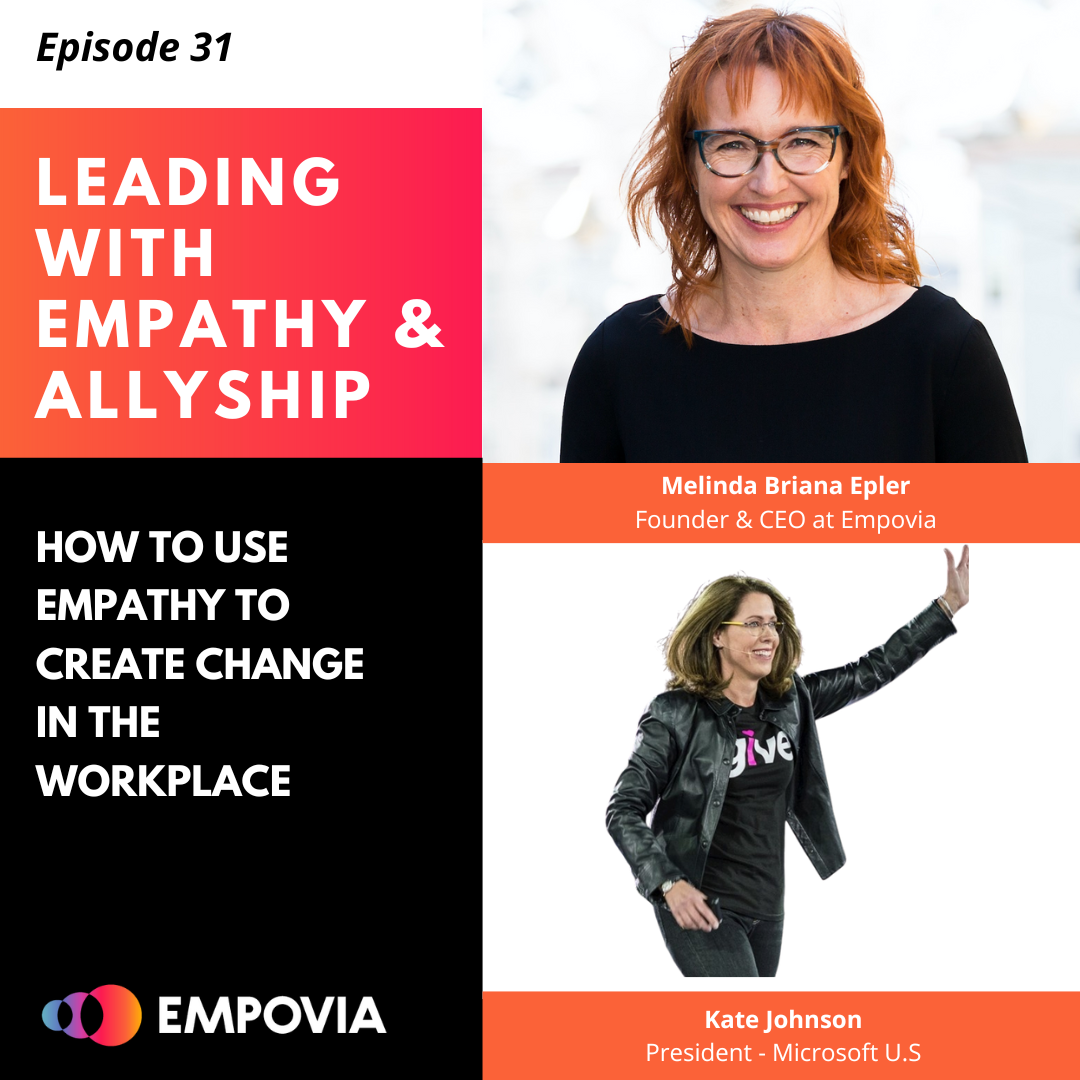
Join Change Catalyst Founder & CEO Melinda Briana Epler with Kate Johnson, President Microsoft U.S, for a deep dive on how Microsoft is creating changes within the company by leading with Empathy.
We talked about:
- Microsoft’s ongoing program to building an inclusive workplace
- Leading with Empathy and how to foster vulnerability and courage
- The need for top-down clarity on the company’s goals, values and outcomes
- The importance of processes and data analytics
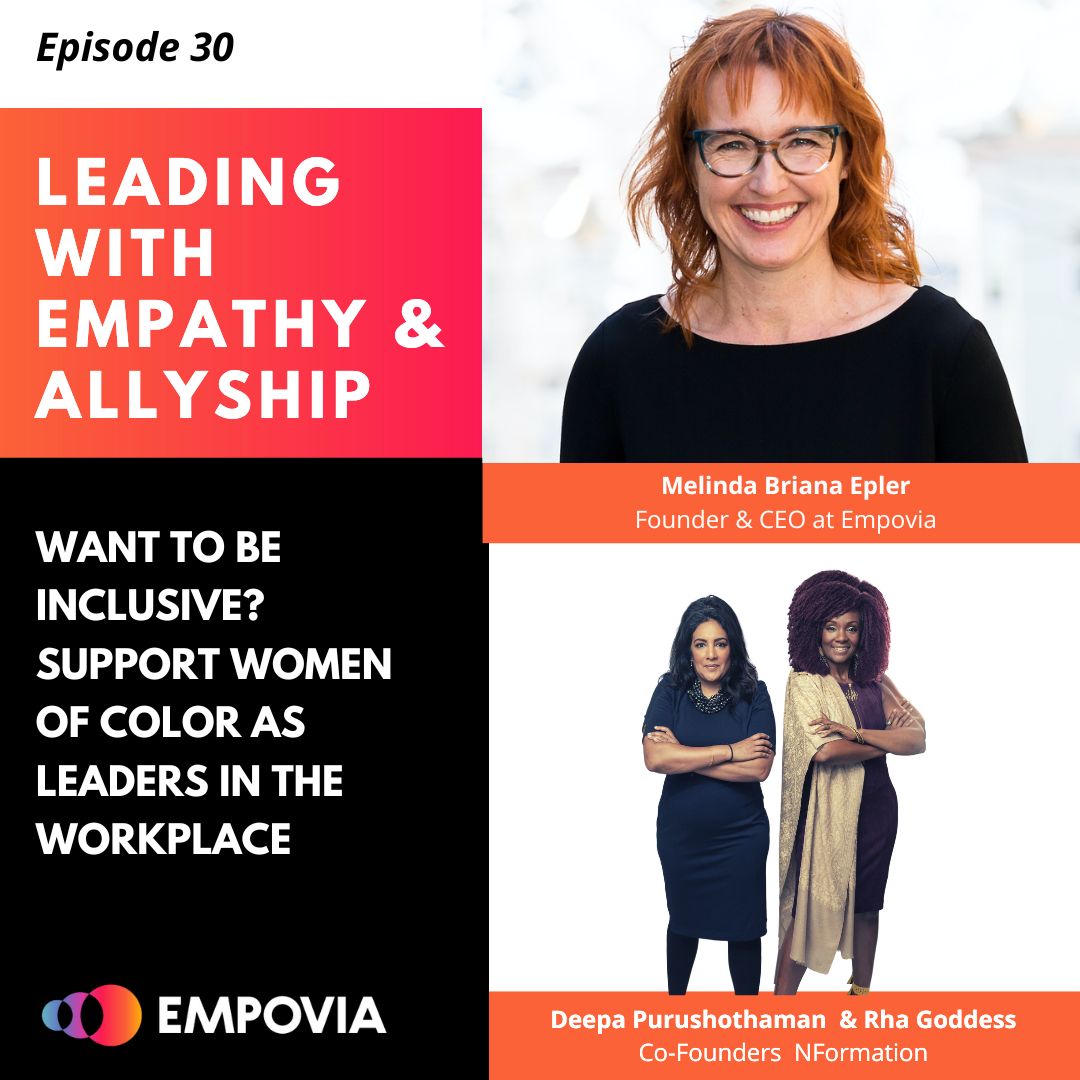
Join Change Catalyst Founder & CEO Melinda Briana Epler with Deepa Purushothaman and Rha Goddess, co-founders at nFORMATION on how to support women of color as leaders in the workplace.
We talked about
- The future of work and what managers can do to become real allies for WOC
- The new mobile app for women of color that nFORMATION is launching to support the community
- How to address systemic oppression and create a safe space for WOC to bring their full self to work and lead in the workplace.
- How the concept of power might differ for WOC and how it can benefit everyone in the workplace
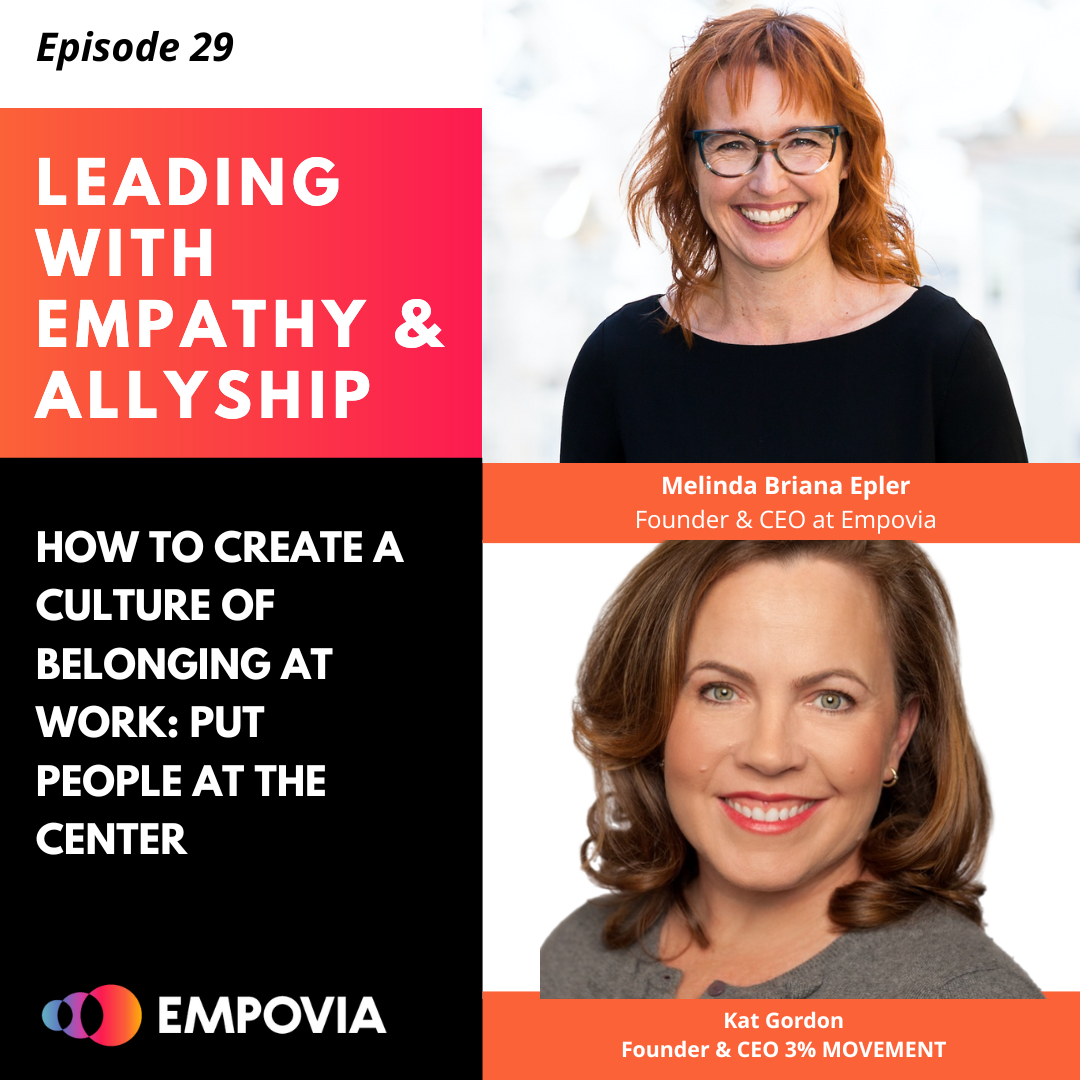
Join Change Catalyst Founder & CEO Melinda Briana Epler with Kat Gordon, CEO and Founder of the 3% Kat Gordon talk to us about the evolution of gender equity in the advertising space.
We talked about:
- Kat’s background as a creative director and what led her to create the 3%movement.
- How she helped move the industry from 3% of creative directors to 29%.
- And how to create a culture of belonging in the workplace, with the importance of putting people at the center.
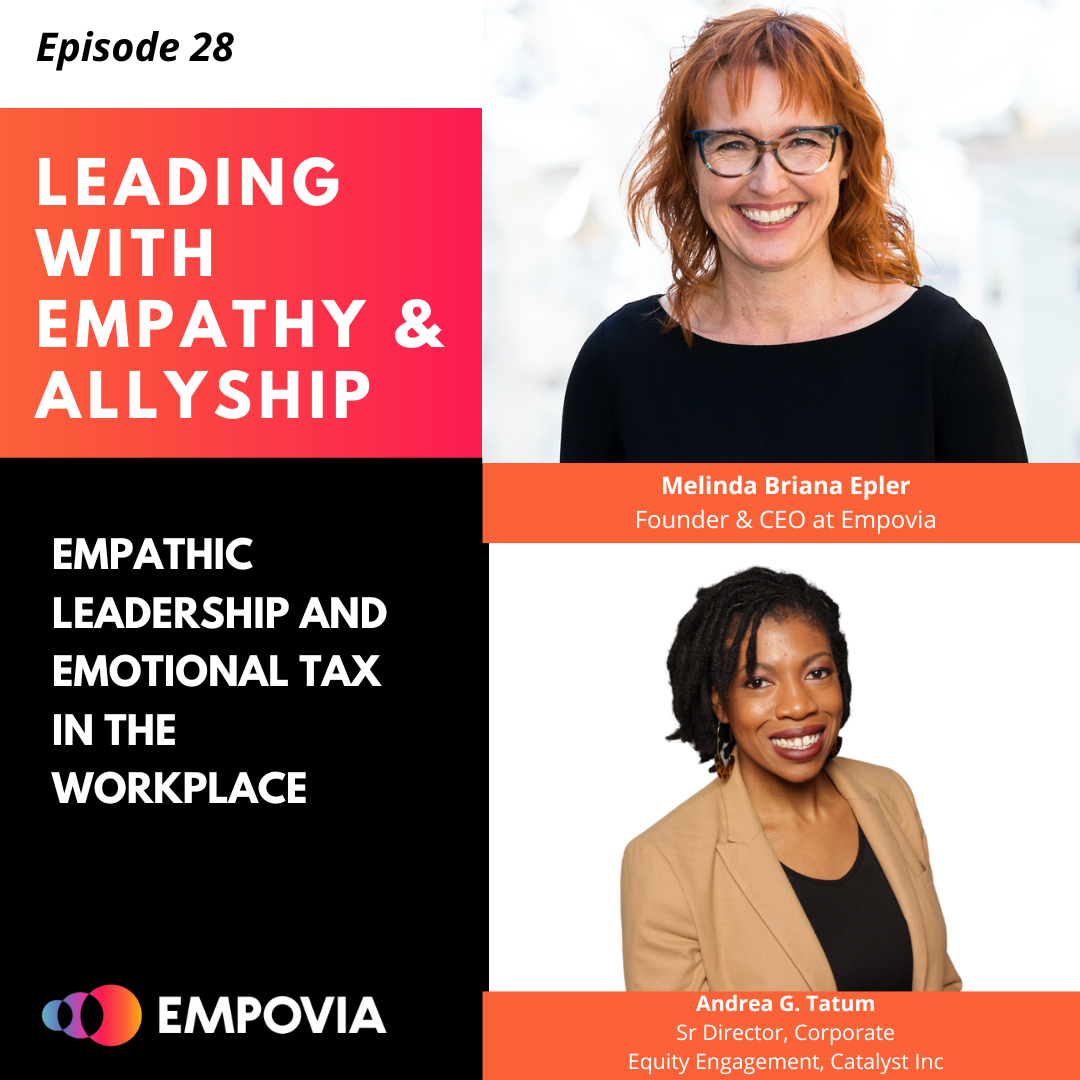
Join Change Catalyst Founder & CEO Melinda Briana Epler with Andrea G. Tatum Senior Director, Corporate Equity Engagement, Catalyst Inc on discussing how to create a supportive working environment.
We discuss the Catalyst’s research and the challenges of the emotional tax for women, particularly women of color: the state of being highly “on guard” at work, which can impact well-being and ability to thrive in the workplace.
In this rich conversation, we learned about:
- Andrea’s personal experience experiencing racism in the workplace and how that led her to become an advocate.
- The role of inclusive leaders to develop workplace cultures where people feel valued and enabled to contribute their skills and expertise fully.
- The powerful change leading with empathy can create in the workplace.
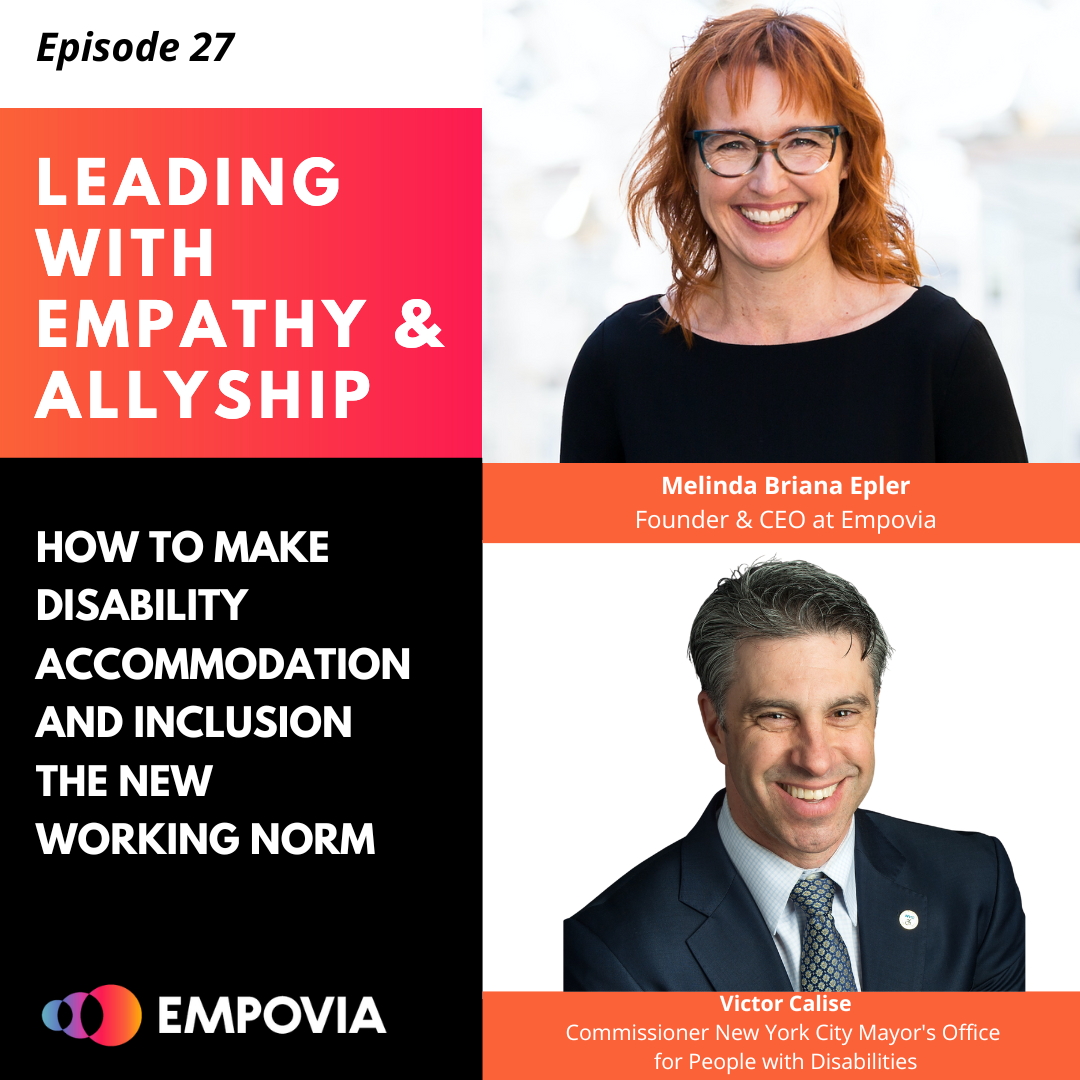
Join Change Catalyst Founder & CEO Melinda Briana Epler with Commissioner Victor Calise, on discussing how to make disability accommodation the new norm in the working environment.
We talked about Commissioner Victor Calise’s disability journey and how he turned it into a strength, becoming one of the most innovative advocates for disability. In this rich conversation, we learned about:
- The forward-thinking work NY is doing in collaboration with other cities to build inclusive working environments.
- The need for ‘accommodation’ of the disabled community and how Covid-19 has helped accelerate the workplace’s transformation.
- The impact of outdated regulations on the community
- How we should not separate disability from the other movement fighting for a more inclusive working environment.
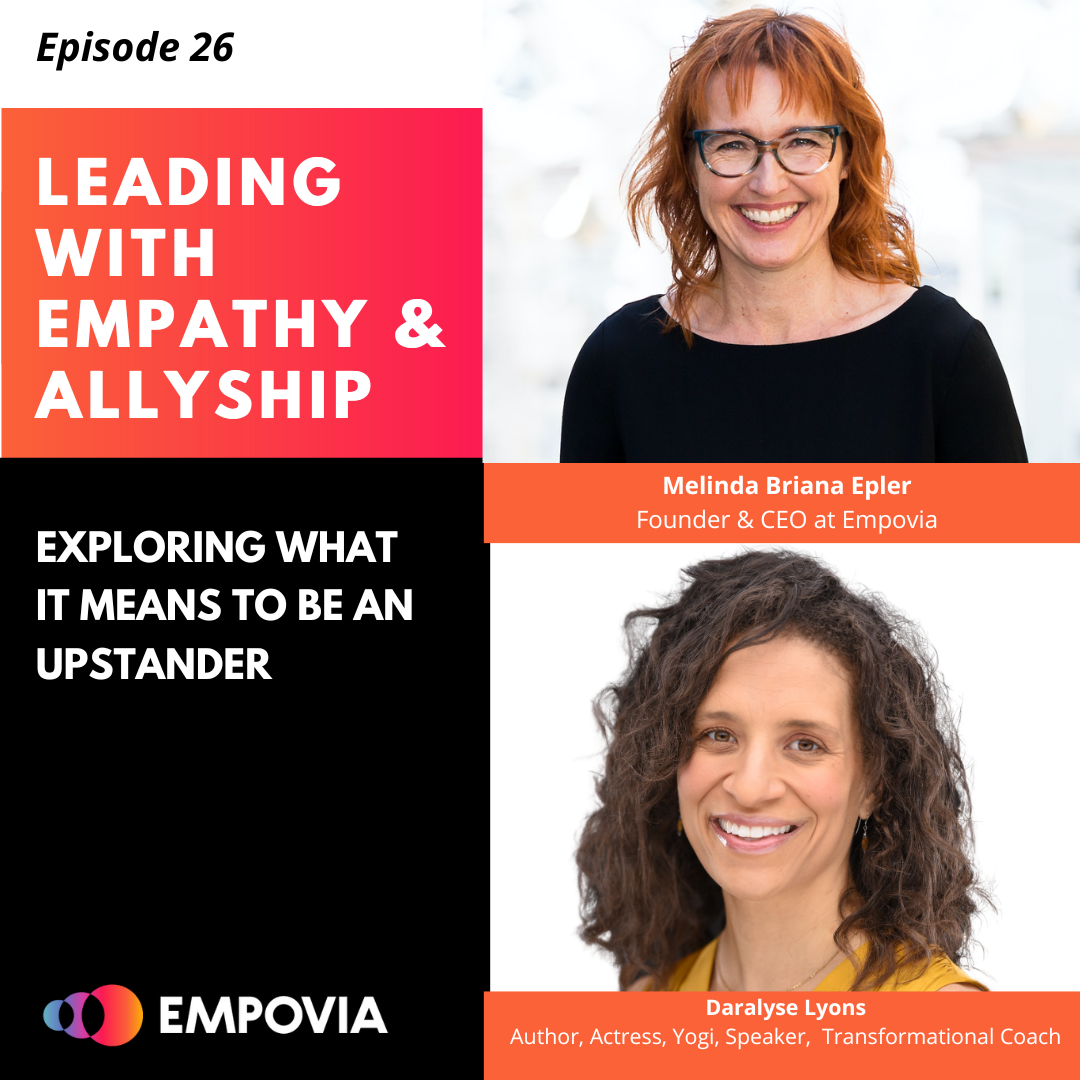
Join Change Catalyst Founder & CEO Melinda Briana Epler with Daralyse Lyons on understanding what it means to be an upstander. An upstander is an individual who sees wrong and acts also called an ally.
We talked about Daralyse Lyons’s upbringing as a biracial kid and what led her to become an advocate and an upstander. In this fascinating conversation,
We learned about:
- Colorism and the dangerous path to rank people based on their skin colors.
- The difference between an upstander and bystander and how can we become an ally.
- The intersectionality of diversity and its assets to the corporate world and product development process.
- The inclusive leadership path people can choose in a corporate environment to lead by example.
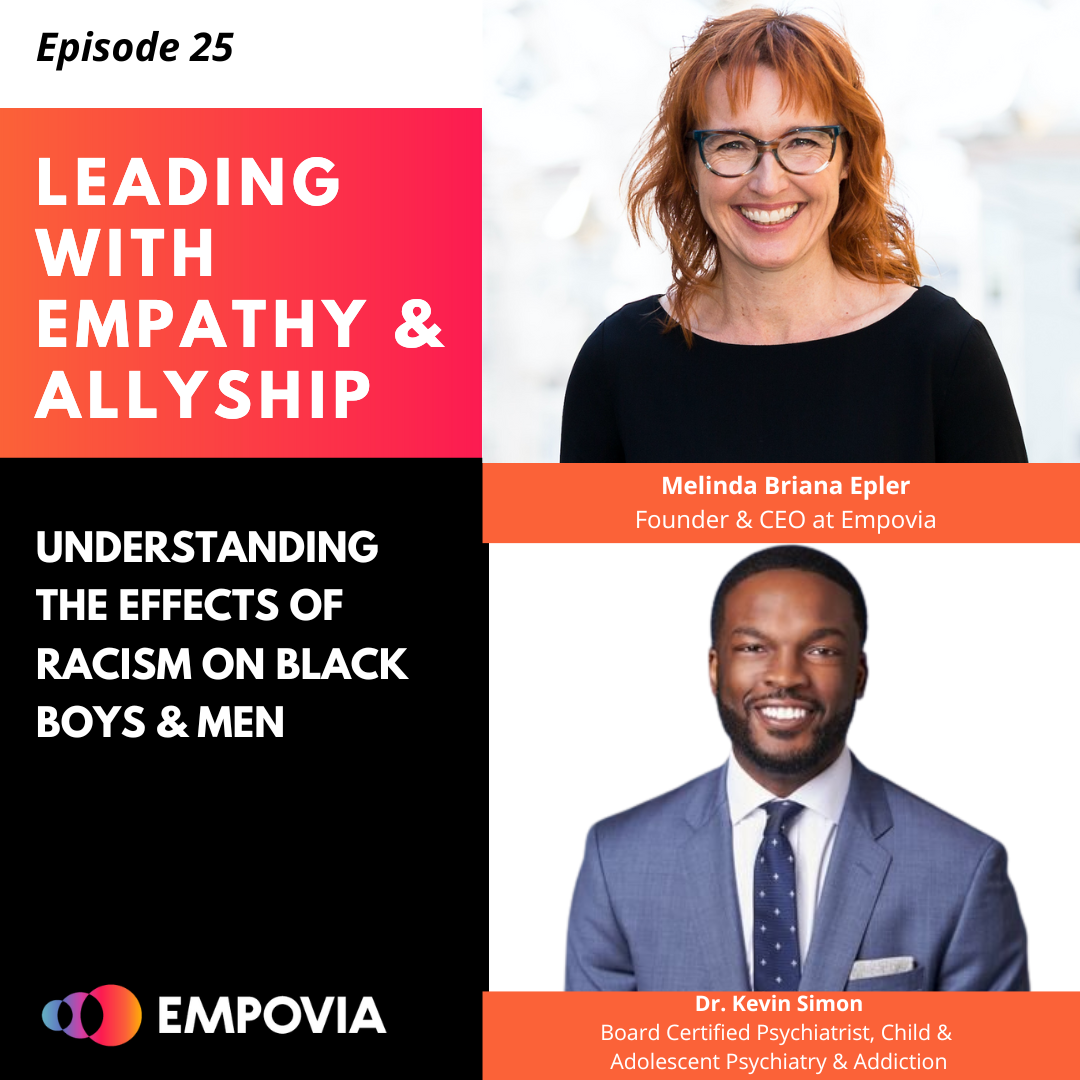
Join Change Catalyst Founder & CEO Melinda Briana Epler with Dr. Kevin Simon on Understanding the Effects of Racism on Black Boys & Men.
We talked about Dr. Kevin Simon’s journey to becoming a force for good and his work during COVID-19, helping Black and Brown kids and their families understand intergenerational trauma and historical trauma, and how the effects can manifest through depression and addiction.
We learned:
- What ally can do to support this community
- What are intergenerational trauma and historical trauma and their impact on mental and physical health
- How important is to communicate with teenagers in a time of Covid-19 and social justice protest
- How Adverse Childhood Experiences (ACEs) like trauma are the roots of addiction and depression in teenage years
Learn more about Dr. Kevin Simon: www.kevinsimonmd.com/.

Join Change Catalyst Founder & CEO Melinda Briana Epler interview with Muna Hussaini, Chief of staff to Indeed CTO in conversation about how to navigate parenthood during the pandemic.
We talked about Muna’s own story as an American Muslim of building more inclusive workplaces. the impact of Black Live Matters on her kids and family and the new norm of handling Zoom calls with kids.
We learned:
- The opportunity to redefine success in this tumultuous time.
- The fact that it is ok not to handle everything.
- The need for companies to walk the talk when they say that their employees are their most important assets.
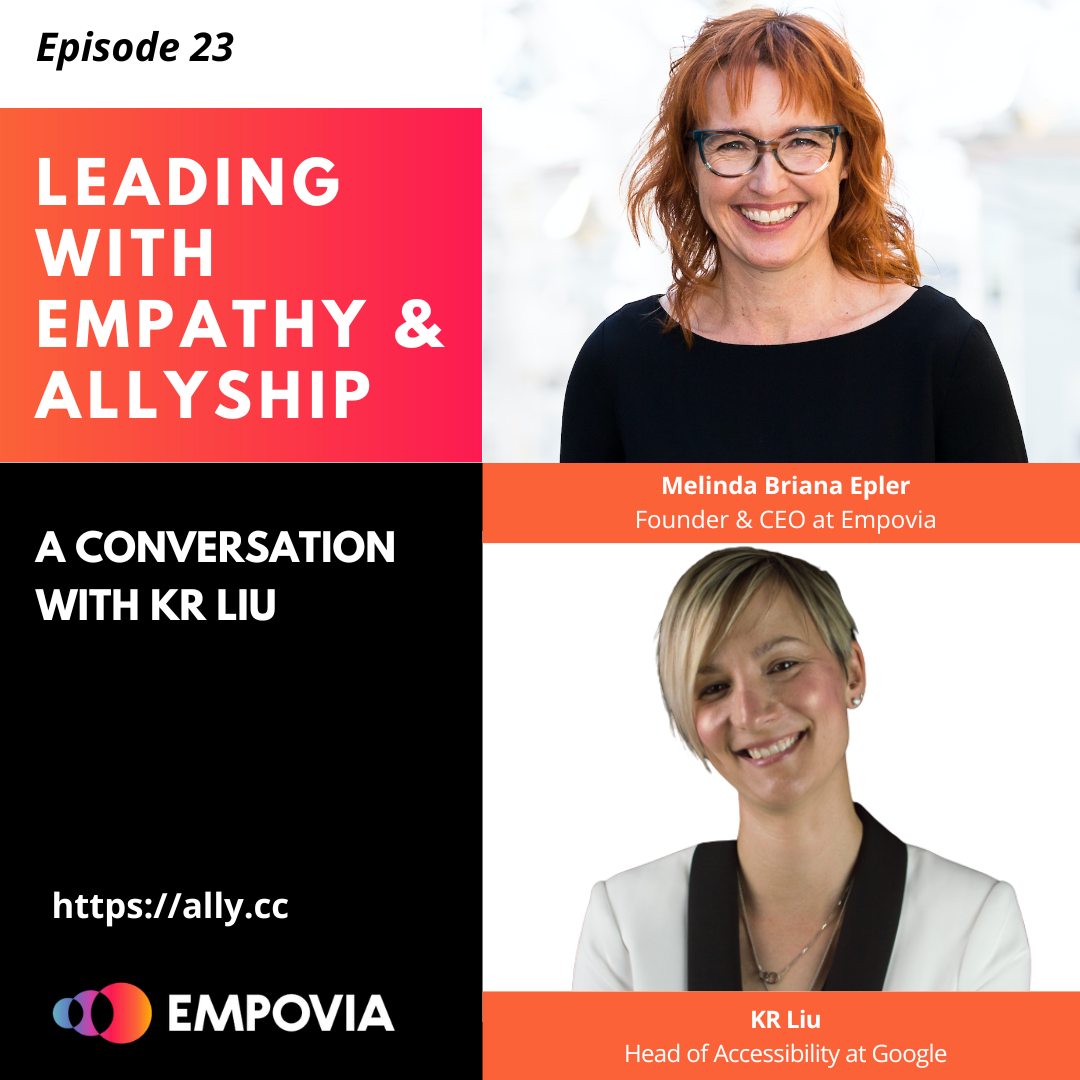
Join Change Catalyst Founder & CEO Melinda Briana Epler with KR Liu, Head of Brand Accessibility at Google in conversation about how we can make the working environment more inclusive for people with disabilities.
We talked about KR Liu’s incredible journey to becoming an advocate, based on her own story of struggling in the workplace with dealing with hearing loss.
We learned:
- The importance of speaking up and making the disabled community part of every department in a company.
- The dramatic statistic with regards to the representation of the disabled community in the workplace and even more for the Black disabled community
- The simple actions you can put in place to help to make this community more visible. 1 in 4 people experience disability at some points including permanent, temporary or situational.
Learn more about KR Liu www.krliu.com/
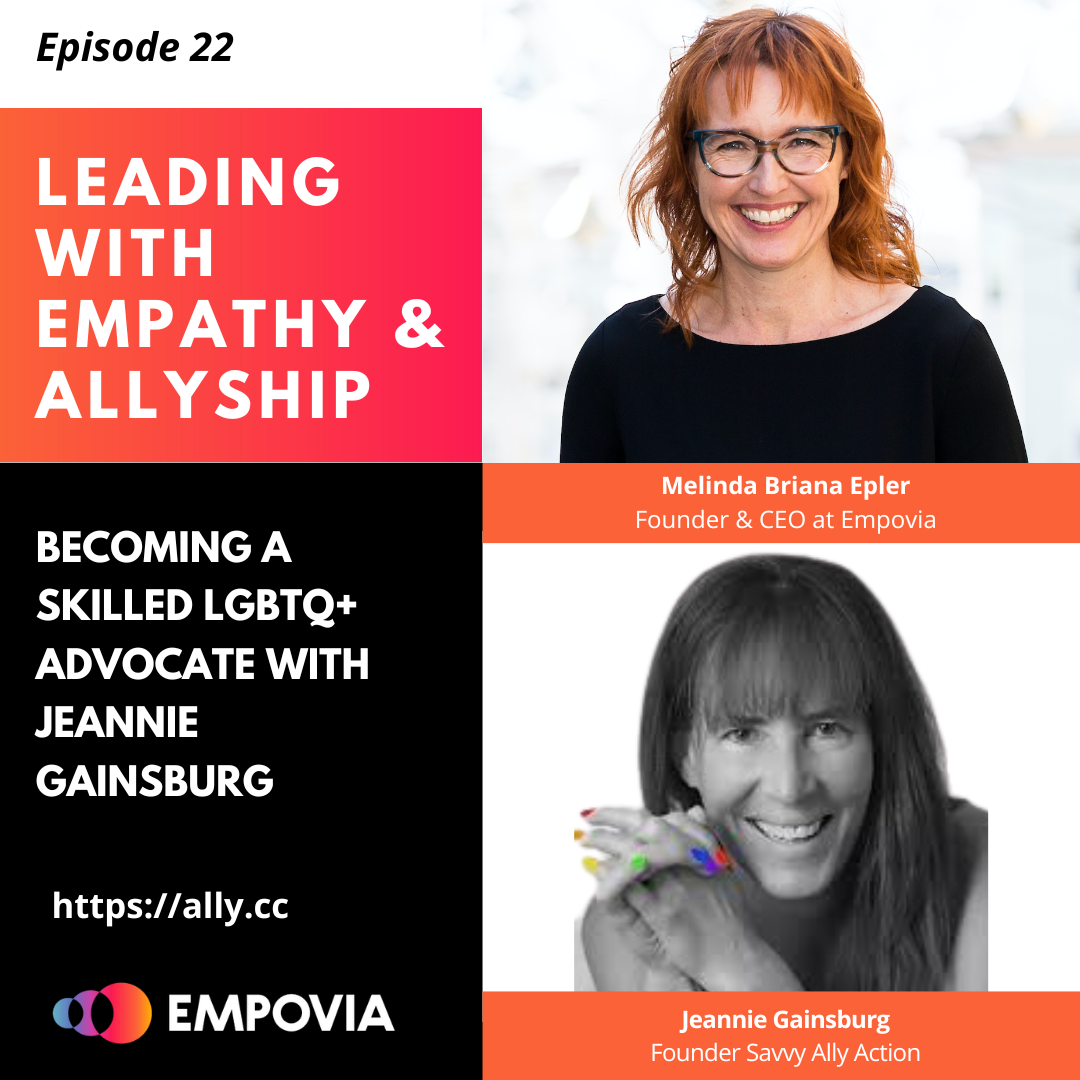
Join Change Catalyst Founder & CEO Melinda Briana Epler with Jeannie Gainsburg, Founder Savvy Ally Action in conversation about how we can become a better advocate for the LGBTQ+ community.
We talk about actionable steps companies can make to create a more inclusive environment for the LGBTQ+ employees and some tips about having difficult conversations with people who might not think like us. Jeannie shares some tips based on her 15 years of practice leading workshops for companies.
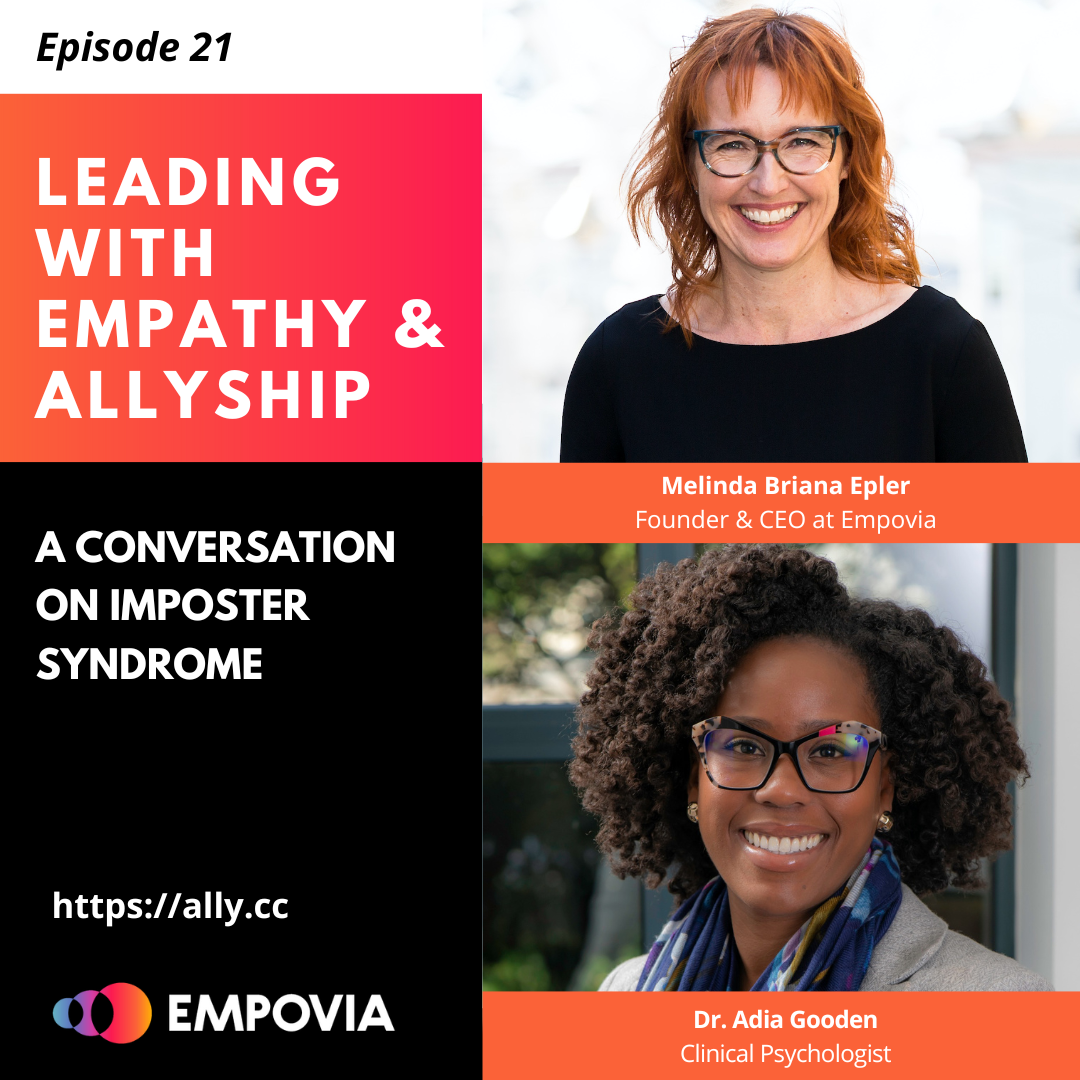
Join Change Catalyst Founder & CEO Melinda Briana Epler with Dr Adia Gooden, Clinical psychologist in conversation about how we can support ourselves and each other to overcome Impostor Syndrome.
We talk about how Impostor Syndrome shows up and how it is affecting our lives preventing us from reaching our full potential. The pervasive influence of Impostor Syndrome is underestimated, and often exacerbated by discrimination and stereotype threat. It can prevent us from asking questions, and speaking up. It can hold our career and relationships back. Dr. Adia Gooden discusses with us some of the solutions and practices we can implement to overcome this well-spread syndrome.
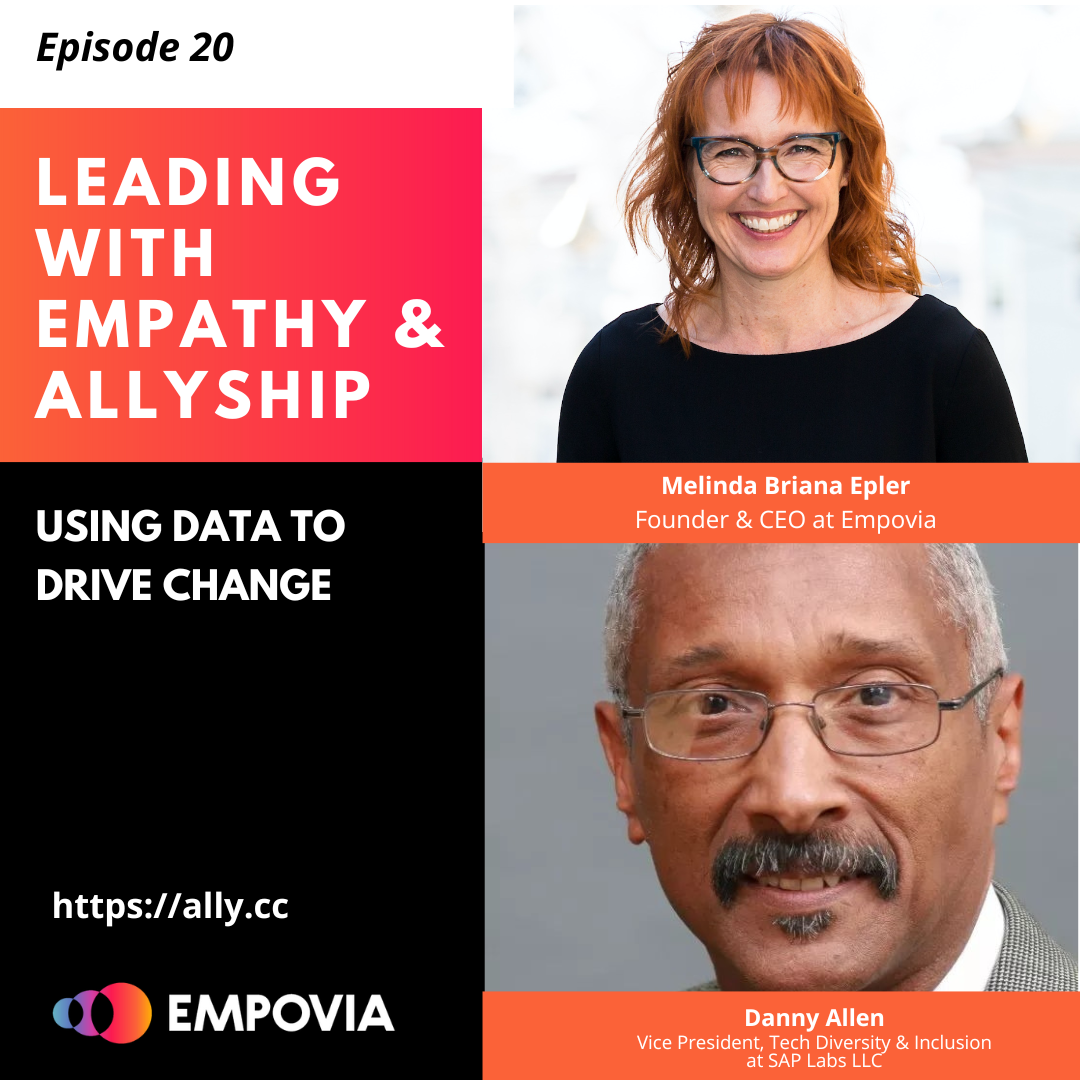
Join Change Catalyst Founder & CEO Melinda Briana Epler with Danny Allen, VP of Tech Diversity & Inclusion at SAP Labs in conversation about Using Data to Drive Change.
Learn more about Diversity and Inclusion at SAP – including their integrated report.
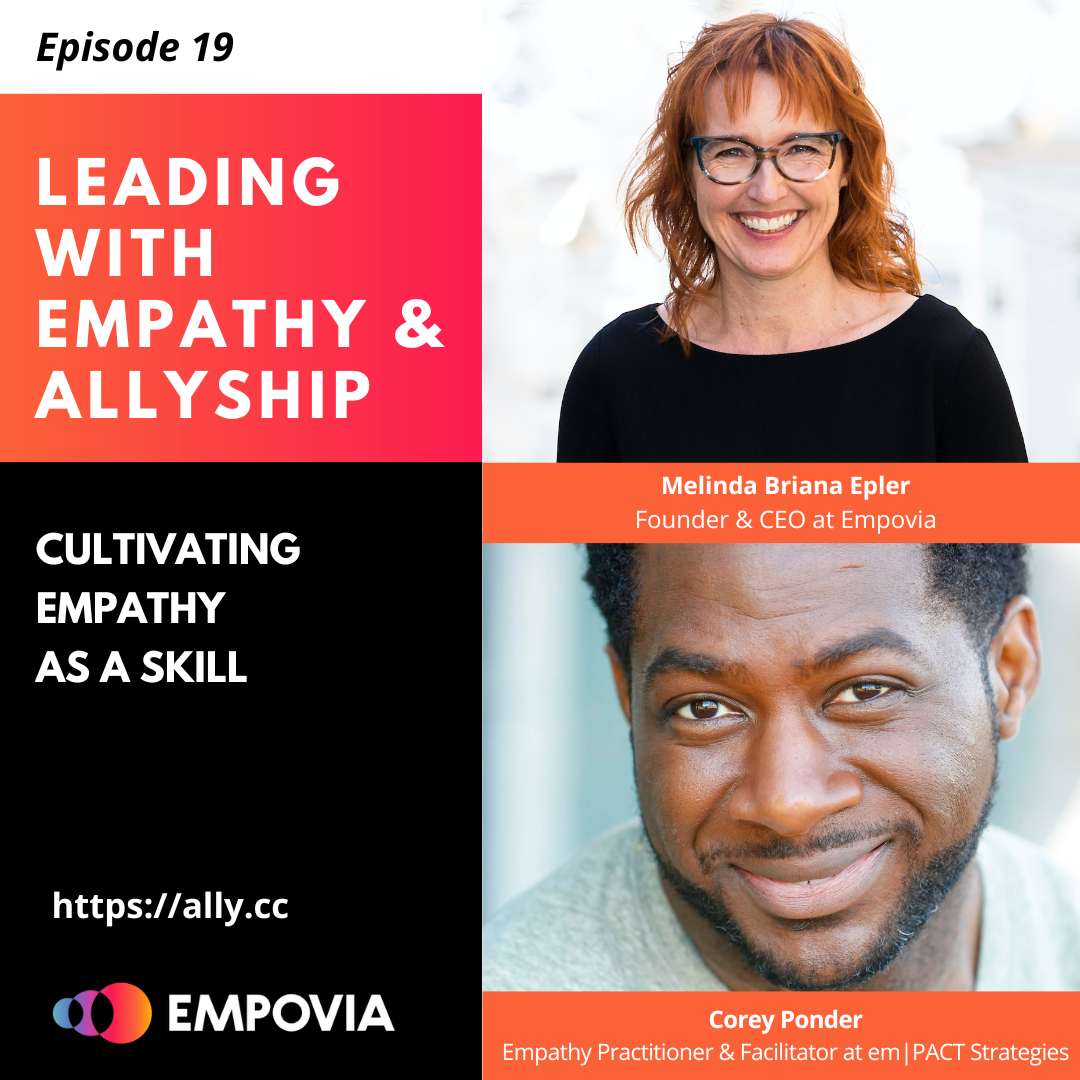
Join Change Catalyst Founder & CEO Melinda Briana Epler with Corey Ponder, Empathy Practitioner & Facilitator at em|PACT Strategies, in conversation about Cultivating Empathy as a Skill.
We talk about Corey’s story, and how he started emPACT Strategies after the deaths of Philando Castile and Alton Sterling. Then we dive into three types of empathy, and ways to build empathy inside organizations by using design thinking frameworks. We talk about allies as being the “trusted sidekick” in a super hero movie, and how to show up as an ally in this crucial moment – to ensure we are moving racial equity forward. And we discuss ways that we can facilitate difficult conversations so that people with widely different backgrounds find common ground to move toward solutions. We end with a conversation with the audience about what barriers they face as allies, and talk through some solutions.
Learn more about Corey’s work at www.empactstrategies.com/
⭑⭑If this is helpful, don’t forget to subscribe to our podcast and like this episode!⭑⭑
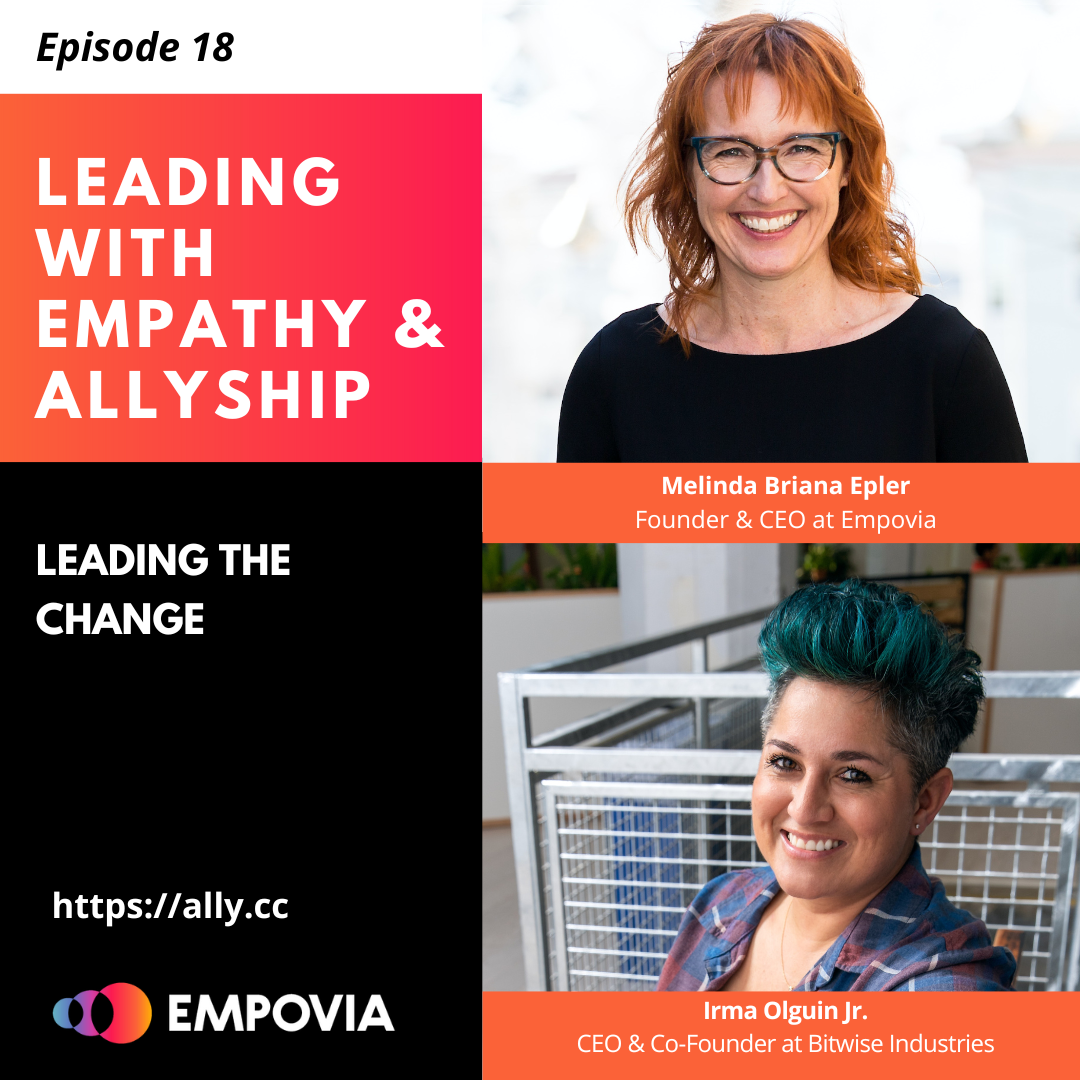
| 44 min
Join Change Catalyst Founder & CEO Melinda Briana Epler with Irma Olguin Jr, CEO & Co-Founder at Bitwise Industries, in conversation about Leading the Change.
We talk about Irma’s story as a granddaughter of immigrants, who starting out working as a farm laborer in the California Central Valley. After earning an engineering degree, she eventually became CEO of a company working to improve diversity and inclusion in tech through technology education. Irma recently closed a Series A round of fundraising of $27M, one of the largest ever led by a Latinx female founder. We discuss innovative ways that leaders can build empathy and allyship across the organization, how to build a sense of belonging during unprecedented times, and what allyship looks like for Irma.
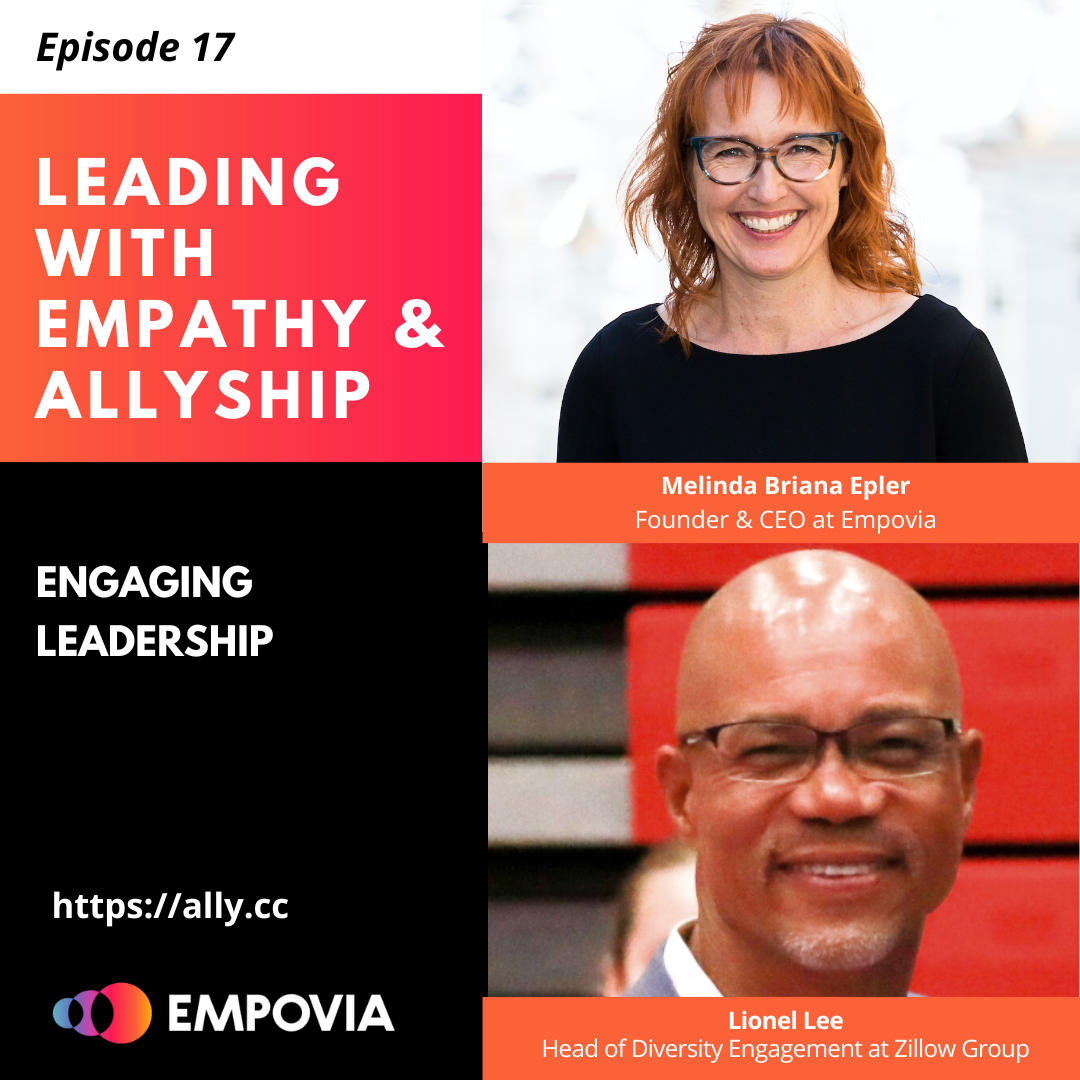
| 49 min
Join Change Catalyst Founder & CEO Melinda Briana Epler with Lionel Lee, Head of Diversity Engagement at Zillow Group, in conversation about Engaging Leadership. We talk about Lionel’s story, what empathy looks like in 2020, how Lionel has worked with leadership to build allyship and deepen understanding for people from underrepresented identities, and the deep work of building empathy across the company.

In this last episode of Season 3, Melinda Briana Epler, Founder & CEO of Change Catalyst, talks about “How To Be An Ally In The Remote Workplace.” Melinda shares specific steps you can take in a virtual environment to be an active ally for others – often requested during the global pandemic – and answers questions submitted during the live broadcast.

Melinda Briana Epler, Founder & CEO of Change Catalyst, and Sam Sepah, Artificial Intelligence (AI) Research Product Manager at Google, have an open conversation around “Why Mentorship & Advocacy Are Key to Career Growth.” Sam describes his journey as a Deaf Persian in tech. He shares key takeaways from his work in HR and DEI, the difference between having a mentor and having an advocate, and how as allies and advocates we can work to make products and tools like AI universally useful.

Melinda Briana Epler, Founder & CEO of Change Catalyst, and Aubrey Blanche, Director of Equitable Design & Impact at Culture Amp, talk about why it’s critical to think beyond diversity and representation. With a shift to equitable design, we build equity, right the power dynamics, and create greater access and support for people in our workplaces and communities who are most marginalized. The conversation covers how to build our capacity to create and lead this change.
Learn more about Aubrey’s work on:
- Aubrey Blanche’s website
- “Why your CEO can’t be your Head of Inclusion” by Aubrey Blanche
- “Get your squad together” by Aubrey Blanche
- Culture Amp’s commitment to building an anti-racist culture

Melinda Briana Epler, Founder & CEO of Change Catalyst, and Jeff Tidwell, CEO & Co-Founder of Next For Me, explore the often overlooked topic of ageism at work, and share strategies for dealing with this type of discrimination – as the recipient or as a bystander.
Learn more about Jeff’s work on:
- Next For Me weekly newsletter
- Next For Me: A Guide To Change For Everybody by Carole McManus and Jeff Tidwell
- Online course: A Guide to Change For Everybody

Melinda Briana Epler, Founder & CEO of Change Catalyst, and Jeremy Sussman, Senior Product Manager at Google, explore “An Allyship Journey As A Straight, White Man.” Jeremy shared why becoming an ally is so critical to seeing real improvements in diversity, equity, and inclusion at work, and the role of allies in ERGs to actively create change.

Melinda Briana Epler, Founder & CEO of Change Catalyst, and Two Eagles Marcus, Founder of MPWRDX, talk about “Centering BIPOC Voices In Business & Social Justice.” They explore what it means to embrace your heritage, reimagine business and social justice to center Black, Hispanic, Asian Pacific, and Indigenous Native American experiences, and bridge our siloed communities through solidarity work.

Melinda Briana Epler, Founder & CEO of Change Catalyst, talks with TDo, Senior Solutions Engineer at Gladly, for “Influencing Your Company To Address Racism.” TDo describes her work to address racism and violence against the AAPI community in her workplace, as well as building coalitions, influencing leaders, and the role allies have in this work.

In this episode, Melinda Briana Epler, Founder & CEO of Change Catalyst, and Sonja Gittens Ottley, Head of Diversity & Inclusion at Asana, talk about “Expanding Anti-Racist Allyship.” You’ll learn about anti-racism, strategies to expand our anti-racist allyship to address intersectionality and many forms of racism, and how this can help you can level up DEI efforts in your workplace.

In this episode, Melinda Briana Epler, Founder & CEO of Change Catalyst, and Frieda McAlear, Senior Research Associate at the Kapor Center, talk about “Designing For Intersectional Inclusion.” Frieda described what we can do to redress the lack of Native American representation in Computer Science while applying an intersectional lens. She’ll also share principles we can use in our workplaces and communities to improve inclusion.

In this episode, Melinda Briana Epler, Founder & CEO of Change Catalyst, and Manisha Amin, CEO of the Centre for Inclusive Design, discuss “It’s OK To Make Mistakes As An Ally.” Our work as allies and advocates continues to shape society for the better. The work can also feel heavy – especially when we stumble. Manisha explores how to get over our fears when it comes to allyship; call each other in rather than out; own our truth; apologize and repair; and forgive others, as well as ourselves.

In this episode, Melinda Briana Epler, Founder & CEO of Change Catalyst, speaks with Sheree Atcheson, author of Demanding More. Sheree and Melinda dive into strategies for how to effectively help leaders succeed in advancing diversity, equity, and inclusion (DEI), even when we may not be in a position of power ourselves.

In this episode, Melinda Briana Epler, Founder & CEO of Change Catalyst, speaks with Tammy Cho, Co-Founder & CEO of Hate Is A Virus and BetterBrave. Tammy and Melinda discuss the work we must do together to combat racism against the Asian American and Pacific Islander (AAPI) communities, starting with raising awareness of what community members have experienced – historically and presently – in the United States. They address what allies and members of the AAPI community can do to create change.

In this episode Melinda Briana Epler, Founder & CEO of Change Catalyst and Karen Catlin, CEO of Karen Catlin Consulting and author of Better Allies, discuss how we can each build empathy and create positive change for others by first understanding our own privilege.

In this episode, Melinda Briana Epler, Founder & CEO of Change Catalyst and Terri Givens, CEO & Founder of Brighter Higher Ed, discuss how radical empathy can help bridge racial divides. Terri shares her journey researching her family’s history, the need for restorative justice, and what led her to write her latest book, “Radical Empathy: Finding a Path to Bridging Racial Divides.”
You’ll learn how to create change by practicing Terri’s six steps of radical empathy:
- A willingness to be vulnerable
- Becoming grounded in who you are
- Opening yourself to the experiences of others
- Practicing empathy
- Taking action
- Creating change and building trust

In this episode, Change Catalyst Founder & CEO Melinda Briana Epler engages in an important conversation with Margenett Moore-Roberts, Chief Inclusion & Diversity Officer of IPG – DXTRA, about how to raise our children as allies and advocates who can disrupt and redress race-based harm.
You’ll come away from this episode with an understanding of why and how to have tough conversations with children about racism, so that they can live in a just, fair, and peaceful world. We also discuss the critical need of reforming the white supremacy built into our American educational system, one that has often taught a one-sided and biased perspective of history.

In this episode, Change Catalyst Founder & CEO Melinda Briana Epler discusses “How To Advance Pay Equity & Reduce the Pay Gap” with Sharawn Connors, VP of Diversity Equality & Inclusion at Micron Technology.
You’ll learn:
- What “pay gap” and “pay equity” really mean
- How you can prepare for negotiating a salary
- The research you should do before talking numbers with a prospective employer
- How to know your professional worth
- How your company can improve the pay gap and pay equity, and the data and processes to consider implementing to reduce the pay gap across your organization in order to reach pay equity
Our Leading With Empathy & Allship host Melinda Briana Epler is a TED speaker, author of the upcoming book How to Be an Ally (McGraw Hill 2021), and Founder and CEO of Change Catalyst. She works with leaders to build empathy and inclusive leadership skills, and develop diverse, equitable, and inclusive companies.
The live show is made accessible thanks to Interpreter-Now and White Coat Captioning.
This episode of Leading With Empathy & Allyship is sponsored by AppDynamics – builders of the world’s only full-stack Business Observability platform. Join their team to help businesses thrive by turning performance into profit. Learn more at www.appdynamics.com/company/careers And by Interpreter-Now – providing high quality ASL interpreters.

Join Change Catalyst Founder & CEO Melinda Briana Epler with a conversation on ‘What Allies Can Do During Black History Month’ with Rachel Williams, Head of Equity, Inclusion & Diversity at X- the moonshot factory, Lionel Lee, Head of Diversity Engagement at Zillow Group and Almaz Negash, Founder & Executive Director at the African Diaspora Network.
In this episode, we talk about
- How Black History month goes far beyond a month of celebration.
- How Black history should be part of American history program in school.
- The importance of reflection on policies and KPI within communities and workplaces.
The live show is made accessible thanks to Interpreter-Now and White Coat Captioning.
This episode is sponsored by AppDynamics – builders of the world’s only full-stack Business Observability platform. Join their team to help businesses thrive by turning performance into profit. Learn more at www.appdynamics.com/company/careers.
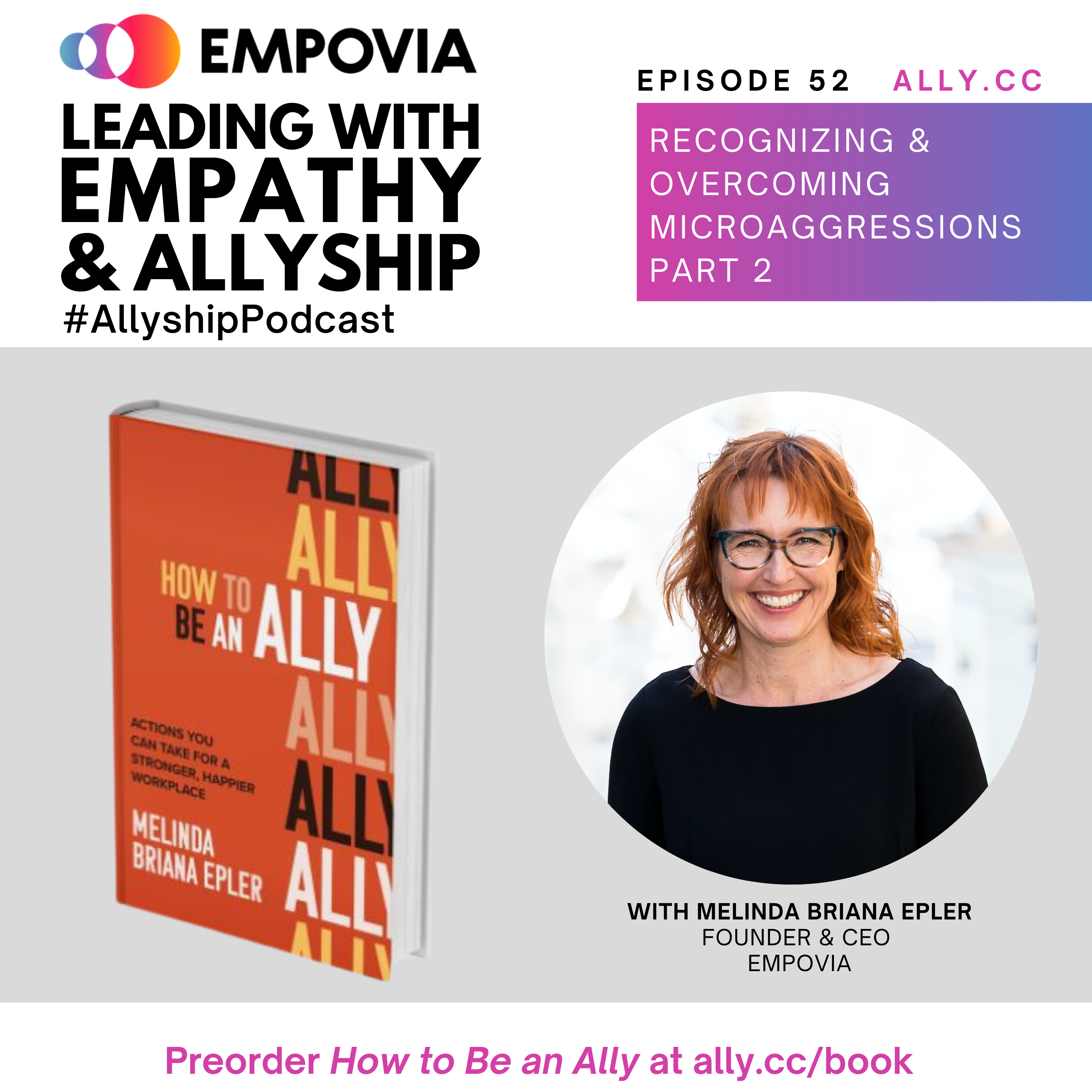
In Episode 52: “Recognizing & Overcoming Microaggressions – Part 2,” Melinda Briana Epler draws from her book How to Be an Ally (McGraw-Hill 2021) for the fundamentals of understanding, identifying, and interrupting microaggressions in the workplace. Melinda discusses nonverbal and environmental microaggressions, as well as some tactics for intervening and treating the impact of microaggressions. You can order How to Be an Ally at ally.cc/book for more on this topic.

In Episode 51: “Recognizing & Overcoming Microaggressions – Part 1,” Melinda Briana Epler answers the most often-asked questions about microaggressions: what they are, how humans are impacted by them, and examples of alternative language that can replace common verbal microaggressions in the workplace. This episode is based on fundamentals from Melinda’s book, How to Be an Ally (McGraw-Hill 2021). You can order your copy of How to Be an Ally at ally.cc/book for a deeper dive into the subject.

Welcome to Episode 50 in our special Season 4! In “Understanding & Correcting Our Biases,” Melinda Briana Epler, Founder & CEO of Change Catalyst, shares key learnings from a few chapters of her book, How to Be an Ally (McGraw-Hill 2021). She explores some common workplace biases, how they show up in the workplace, and how to correct them in ourselves, along with some intervention strategies for reducing biases in the workplace. Melinda also addresses gaslighting and making sure we show empathy when people talk about their own experiences.

Episode 49 kicks off Season 4 with “Why Empathy & Allyship Matter In The Workplace.” Melinda Briana Epler, Founder & CEO of Empovia, shares some key learnings from a few chapters of her book, How to Be an Ally (McGraw-Hill 2021). She talks about what people with underrepresented identities need from allies, why empathy is the foundation of allyship work, and the business case for allyship. Valuable Q&A is incorporated from the live broadcast.
You can order your copy of How to Be an Ally: Actions You Can Take for a Stronger, Happier Workplace at ally.cc/book!
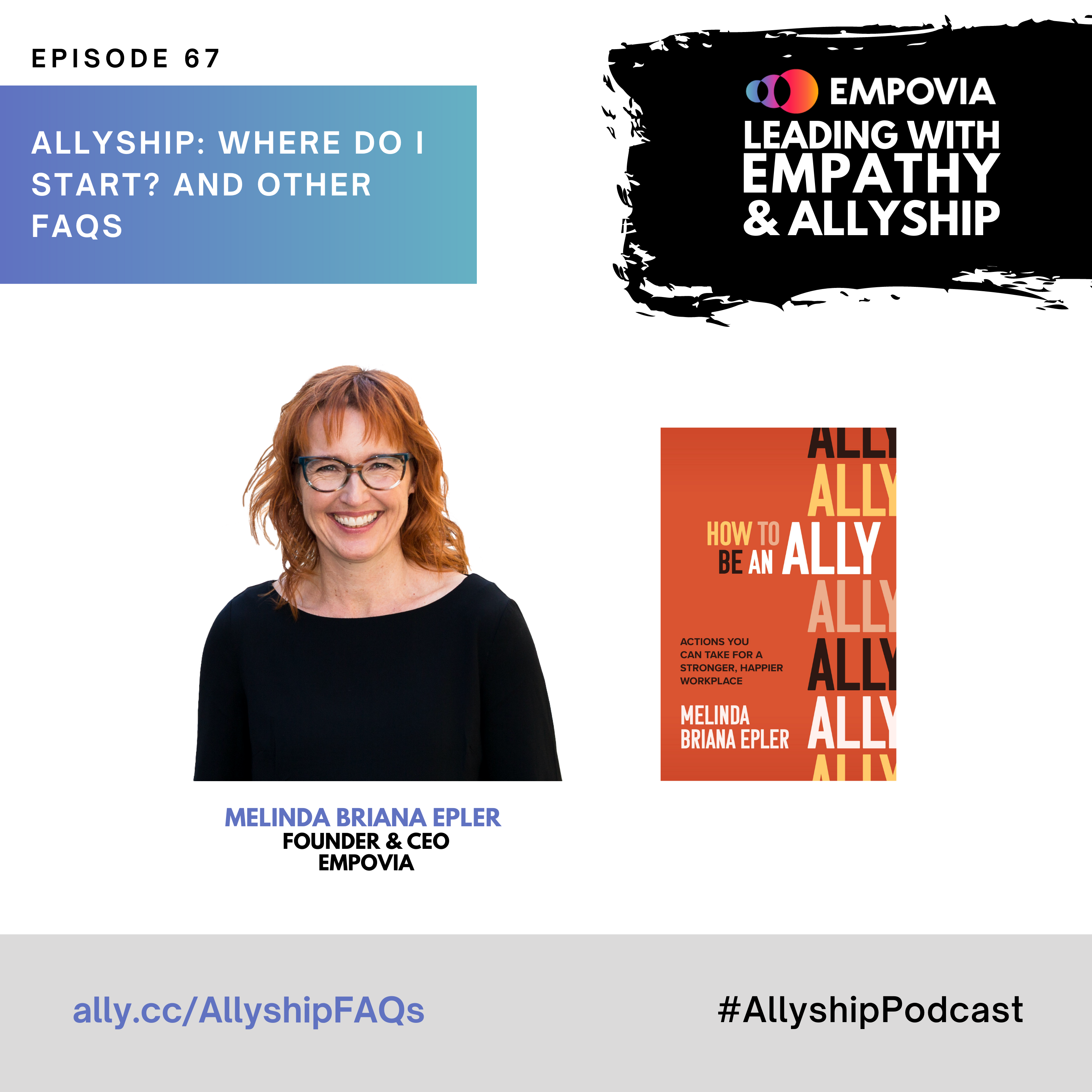
In Episode 67, Melinda Briana Epler concludes Season 5 of the Leading With Empathy & Allyship Show by guiding us through the first steps to becoming an ally. She provides some simple but powerful actions that managers and team members can take to help create a safe space in the workplace where learning, growth, and allyship are supported. She also answers the most often-asked questions around microaggressions, what performative allyship is, and how to talk about the business case for allyship.
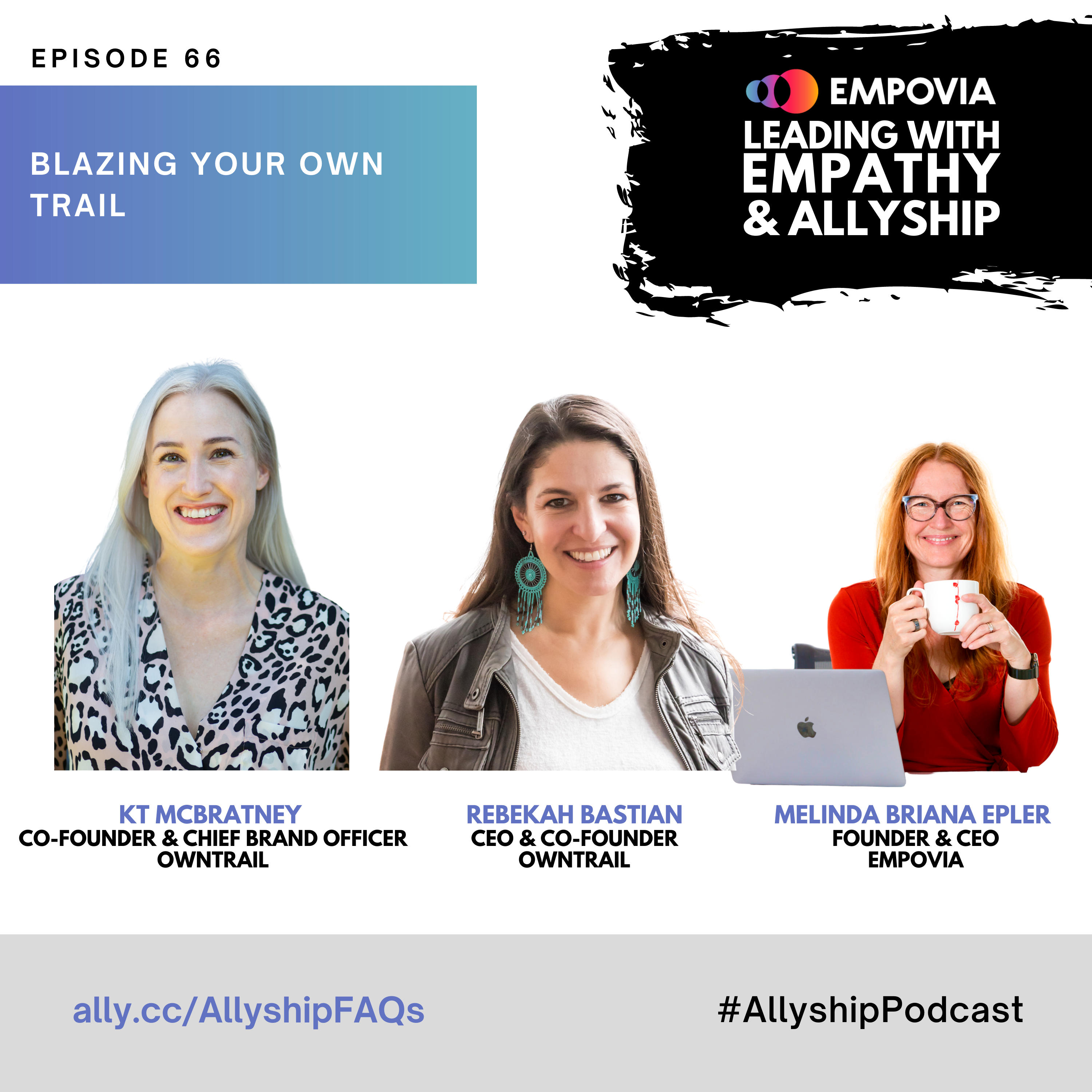
In Episode 66, Melinda is joined by the founders of Own Trail: Rebekah Bastian and Kt McBratney. Rebekah and Kt share their journey on how they’ve blazed their own trail as entrepreneurs building a platform that’s intentionally diverse, builds empathy, encourages authenticity, and creates impact for women globally. They also provide actionable takeaways on how you can increase allyship and incorporate DEI into your own platforms.
![Leading With Empathy & Allyship promo with the ] Empovia logo and photos of Jennifer Brown, a White cisgender woman with blonde wavy hair and royal blue blouse; Rohit Bhargava, an Indian-American male in his mid-40s with black hair and white shirt paired with navy blue suit; and host Melinda Briana Epler, a White woman with red hair, glasses, and orange shirt holding a white mug behind a laptop. Leading With Empathy & Allyship promo with the ] Empovia logo and photos of Jennifer Brown, a White cisgender woman with blonde wavy hair and royal blue blouse; Rohit Bhargava, an Indian-American male in his mid-40s with black hair and white shirt paired with navy blue suit; and host Melinda Briana Epler, a White woman with red hair, glasses, and orange shirt holding a white mug behind a laptop.](https://empovia.co/wp-content/uploads/2021/12/EP65.png)
In Episode 65, Melinda is joined by Jennifer Brown and Rohit Bhargava, the incredible authors of the book Beyond Diversity: 12 Non-Obvious Ways To Build A More Inclusive World. Jennifer and Rohit share their personal experiences and perspectives on creating a more inclusive world. They present key learnings from their book on storytelling, retail, and leadership, as well as their own educational moments they experienced while writing the book and how those moments helped them grow as allies.
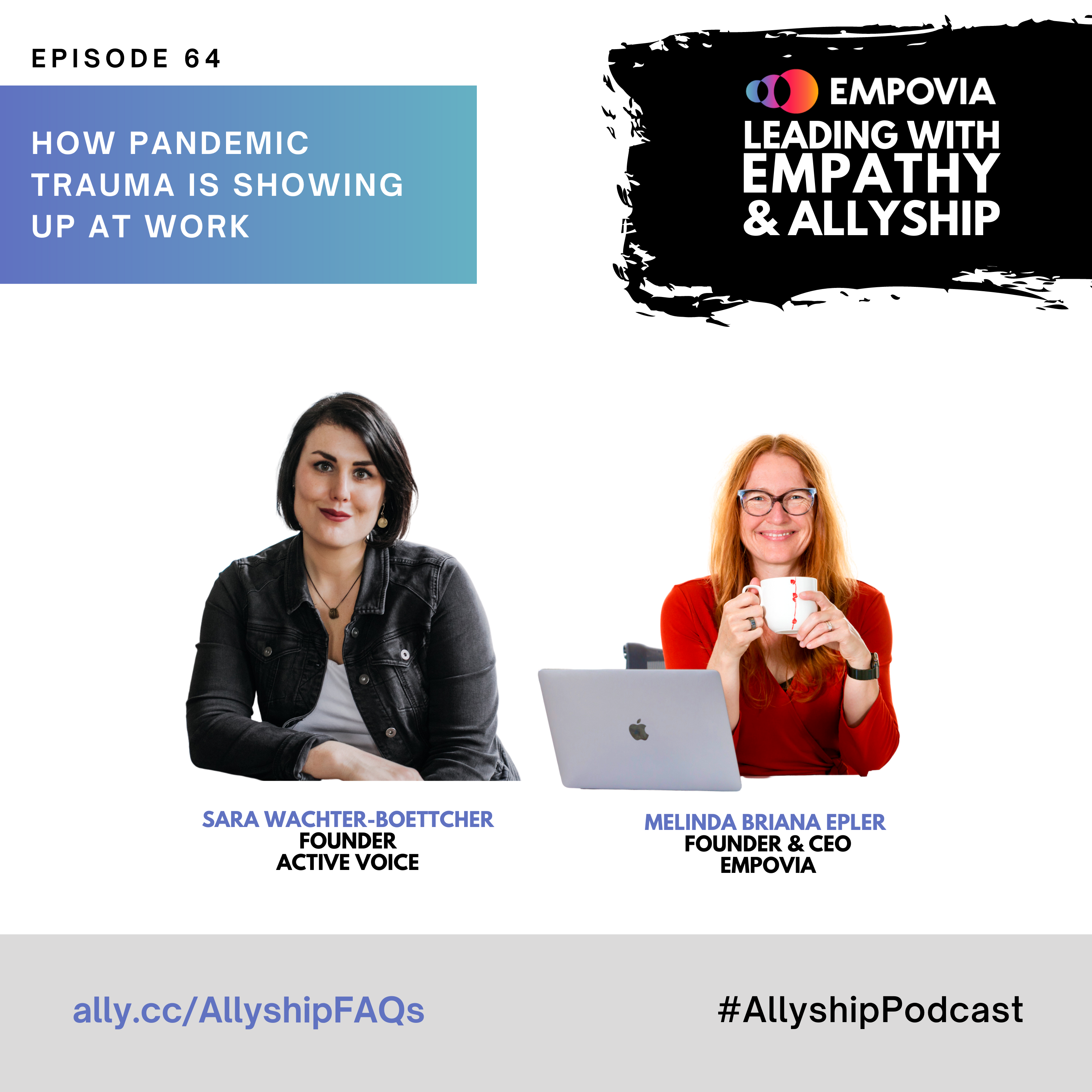
In Episode 64, Sara Wachter-Boettcher, Founder of Active Voice, joins Melinda in a discussion on how pandemic-related trauma affects leaders’ abilities to manage their teams. Sara provides practical tips on how we can regain access to our critical thinking and work through the trauma without harming people around us. She also touches on what organizations, managers, and allies can do to build trust and create a safe space for courageous conversations in the workplace.
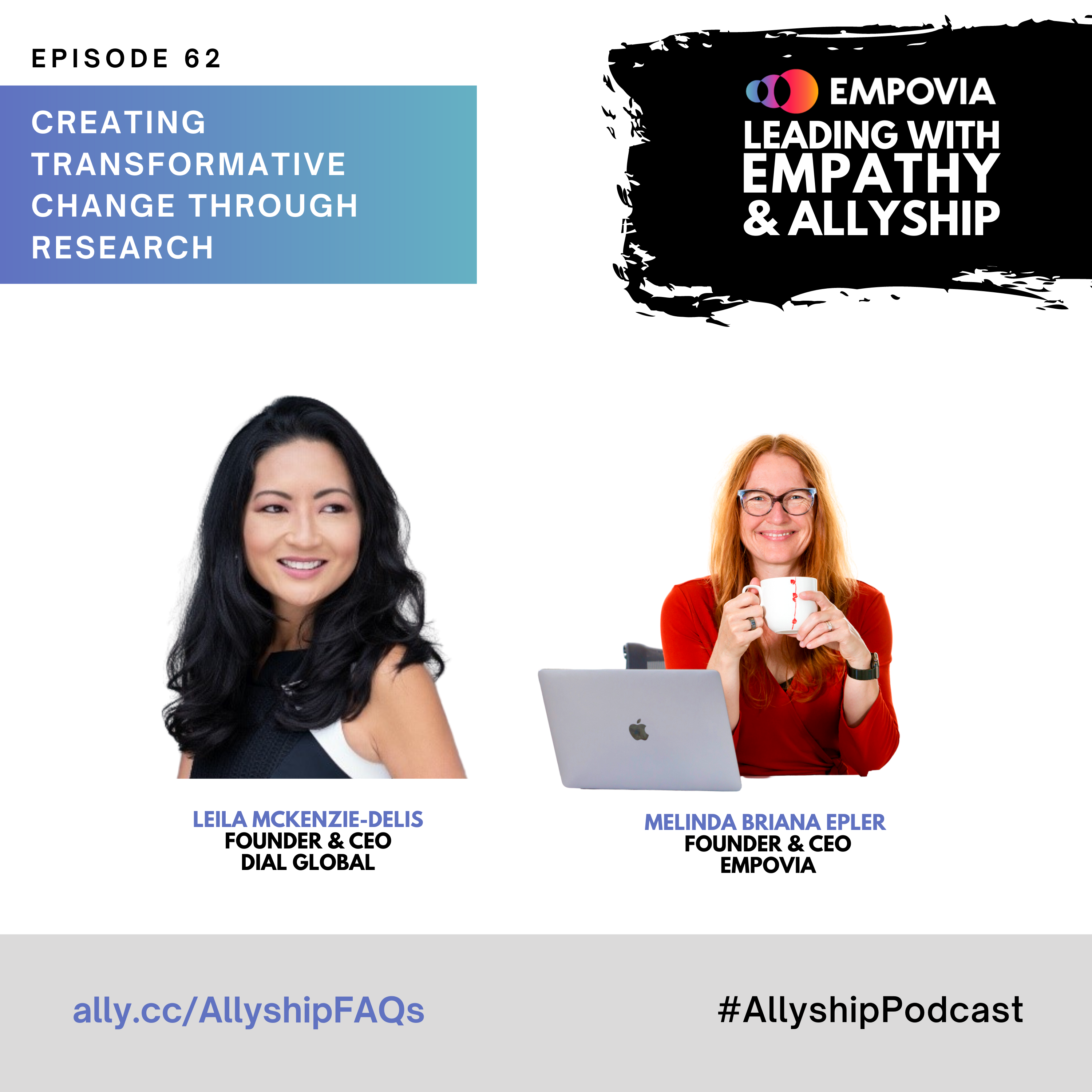
In Episode 62, Leila McKenzie-Delis, Founder and CEO of DIAL Global, Author, Activist, Speaker and Podcast Host shows how research is driving transformative change across industries and how data can enrich an organization’s decision-making processes around diversity, equity, and inclusion. Leila and Melinda also look into some key findings from the McKenzie Delis Packer Review 2020 study conducted in the UK workforce where a disconnect is observed between the company’s claimed priorities and the execution and strategy of said priorities.
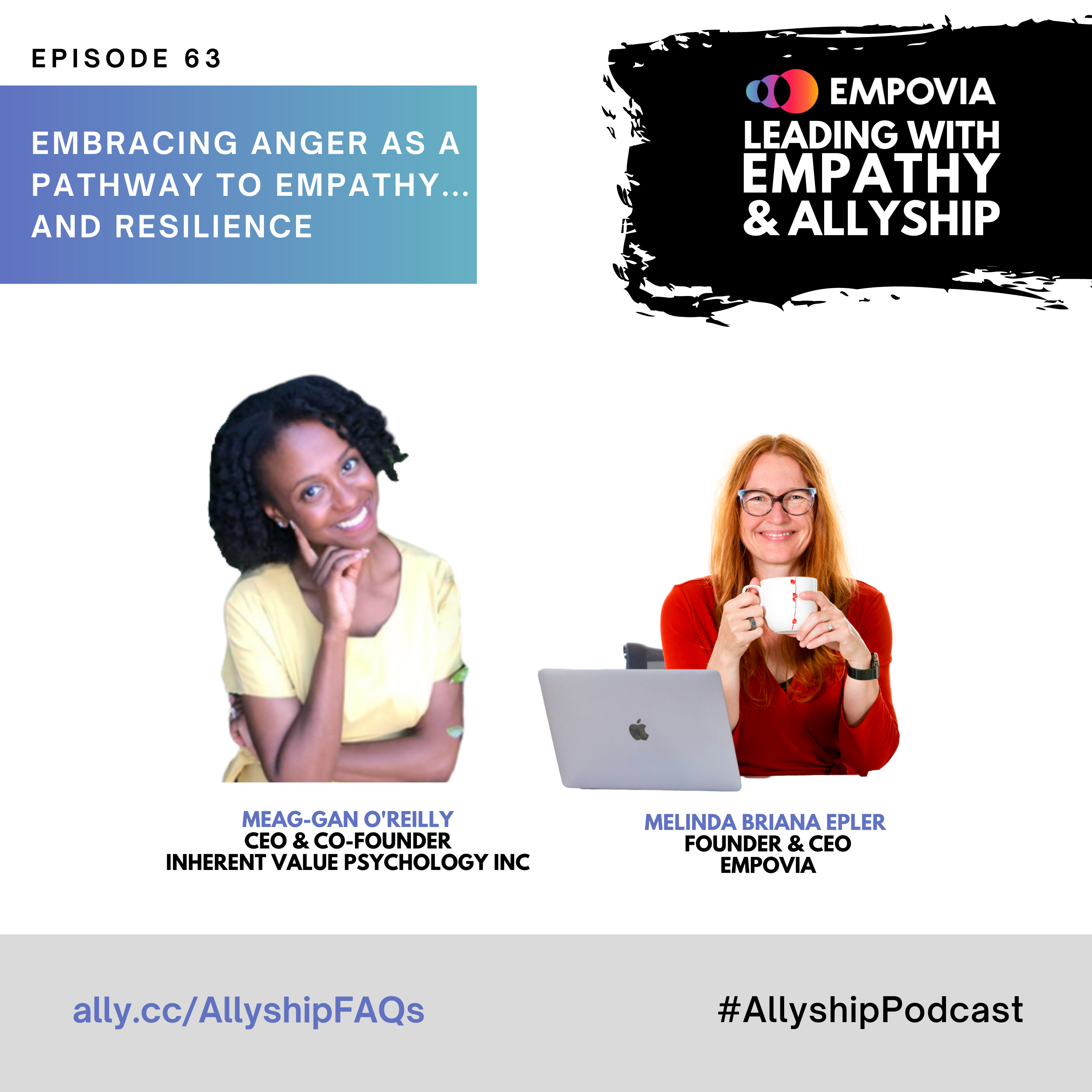
In Episode 63, Meag-gan O’Reilly, CEO & Co-Founder of Inherent Value Psychology INC, joins Melinda in an illuminating conversation about the importance of embracing your anger and how it helps us foster empathy with one another. They also discuss how anger helps us build resilience by allowing us to recognize our own needs and boundaries and how Systems Centered Language can be the first step to dismantling oppression and marginalization.
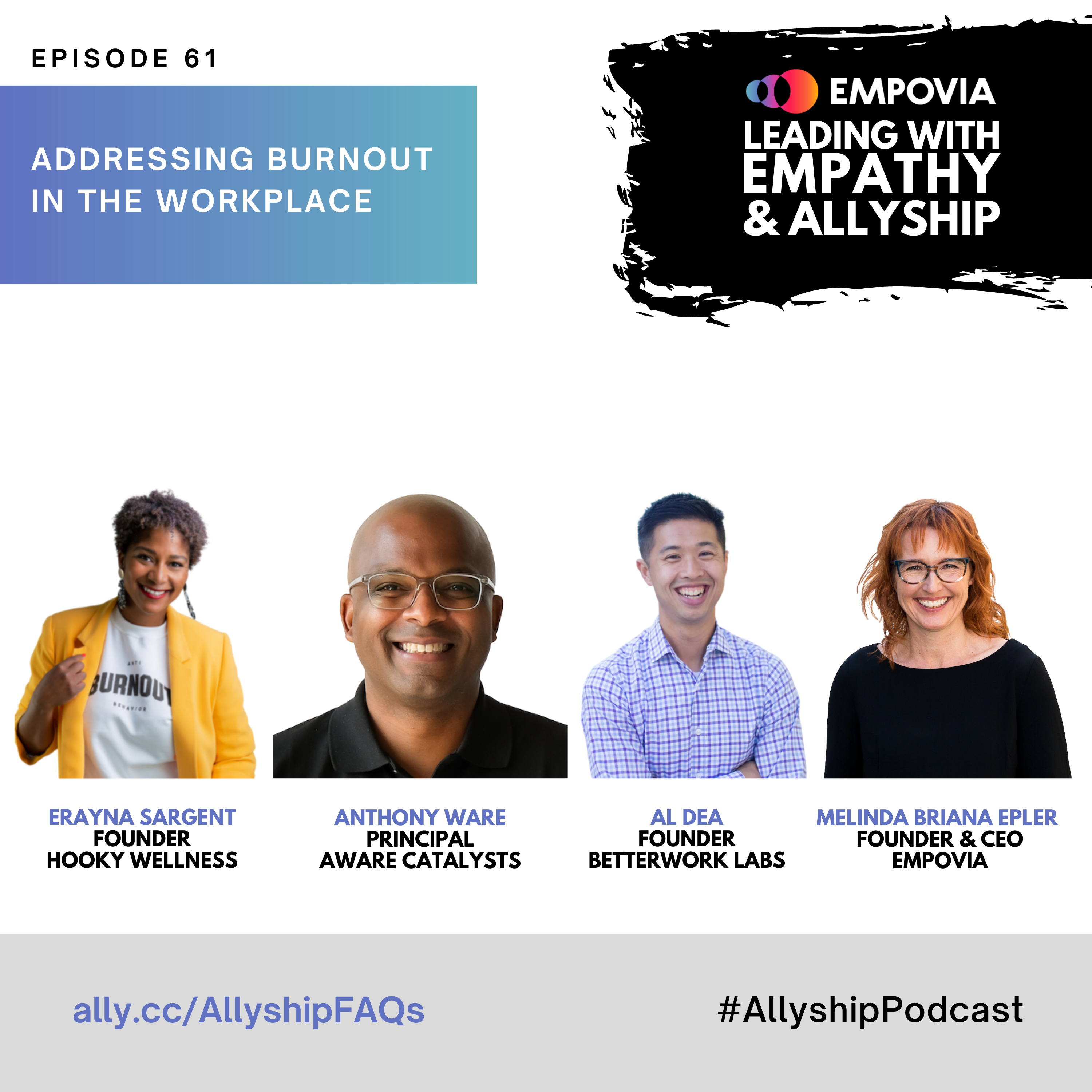
In Episode 61, Melinda Briana Epler is joined by an incredible panel of experts and catalysts for anti-burnout in the workplace: Erayna Sargent, Anthony Ware, and Al Dea. They examine the common drivers of burnout, how to spot its symptoms and take action for yourself and your team, and what managers can do to prevent burnout at work. They also share some tips on how to support teams through the emotional impact of an acquisition.
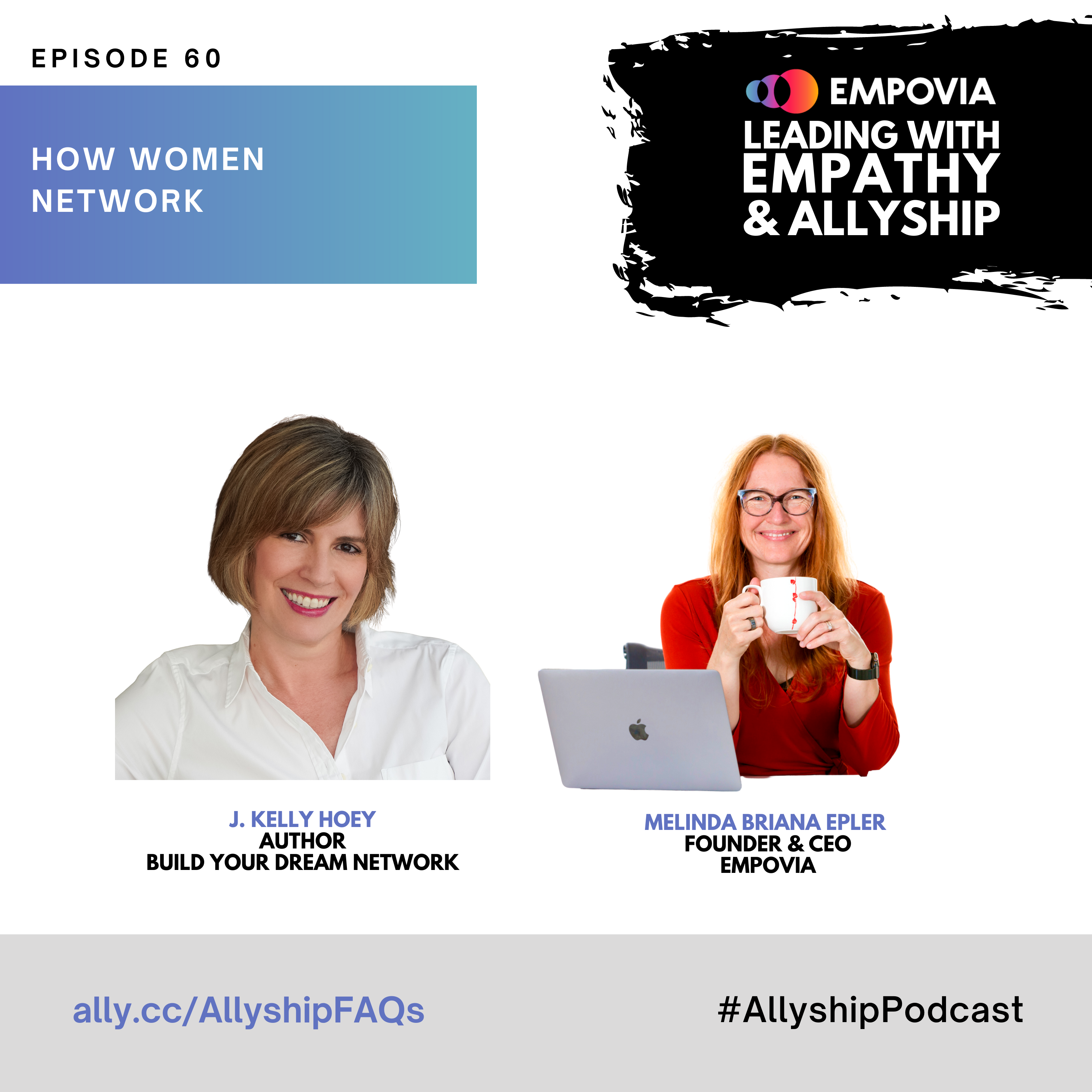
In Episode 60, J. Kelly Hoey, author of Build Your Dream Network, shows us how networking can be critical for women’s success and allyship. Kelly and Melinda discuss the strategies to diversifying your network, building a community that will help you reach your fullest potential, and cultivating relationships with people in the era of hybrid work environments.
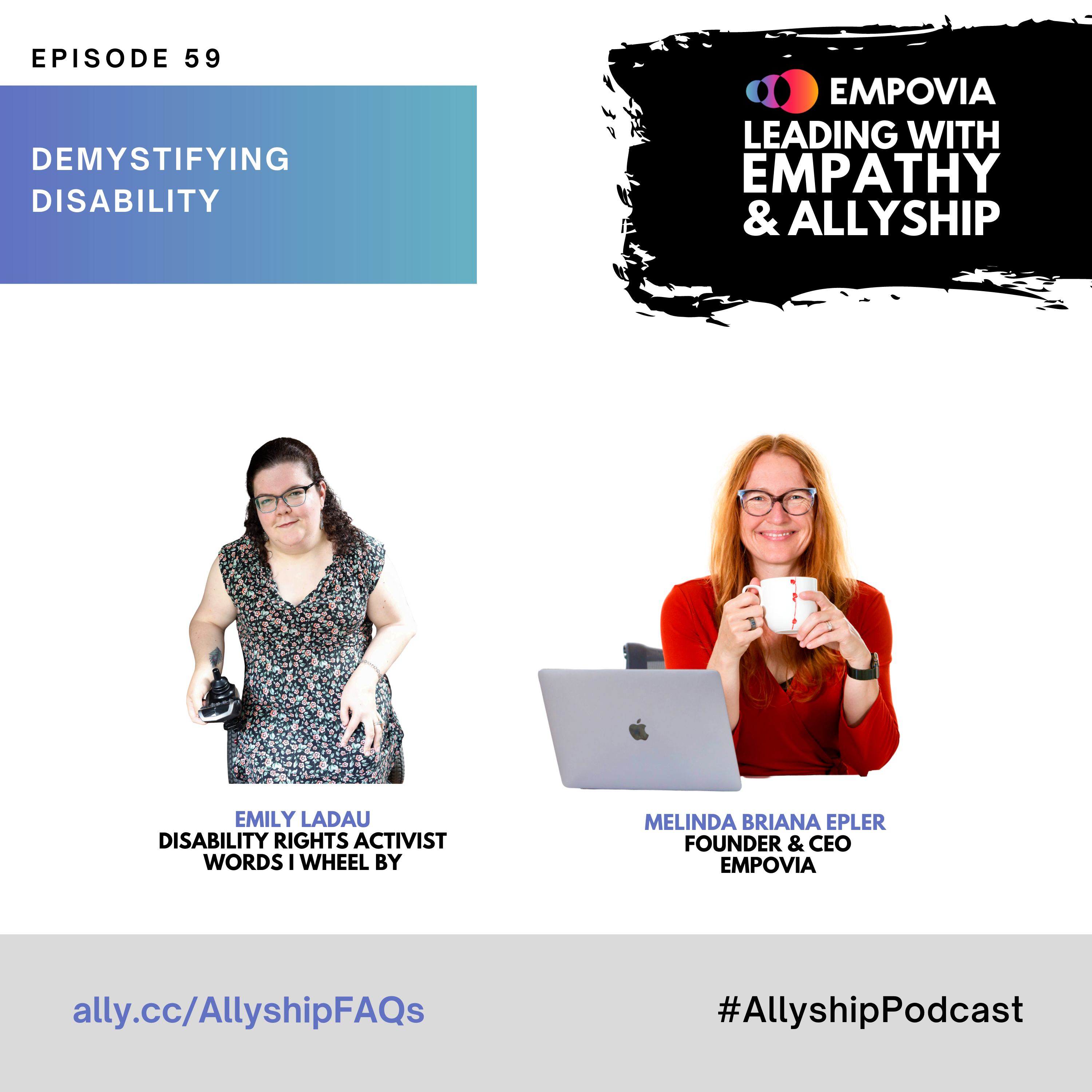
In Episode 59, Emily Ladau, Disability Rights Activist, Author, and Communications Consultant at Words I Wheel By, introduces the topic of disability through an insightful discussion with Melinda on systemic ableism, disability history, representation, and rights. Emily explains why it’s alright to use the term ‘disabled’, how accommodation and inclusion should be viewed upon, and how we can build allyship within the disability community.
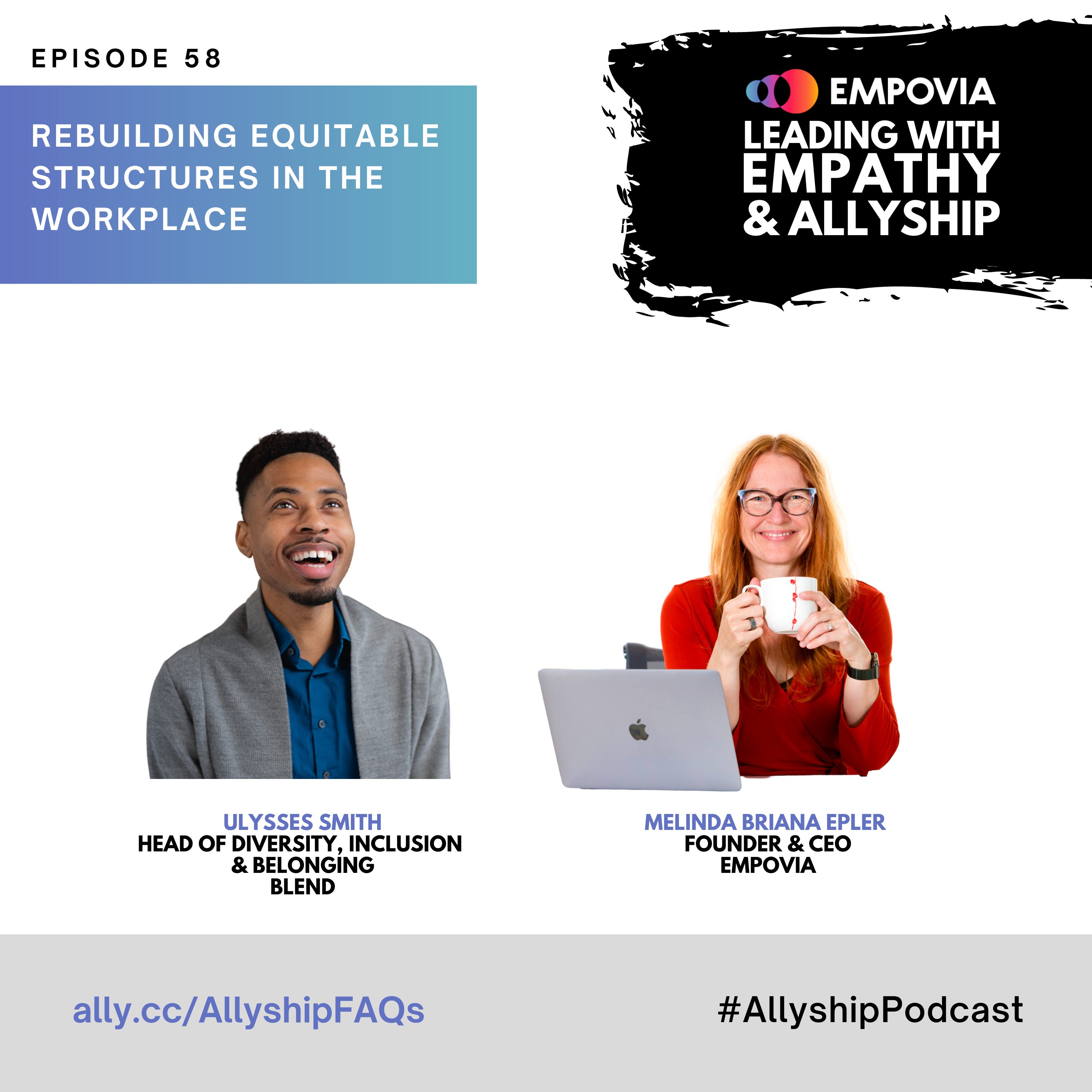
In Episode 58, Ulysses Smith, Head of Diversity, Inclusion & Belonging at Blend, joins Melinda in a conversation that focuses on the approach to rebuilding structures that are equitable across different organizations. Ulysses shares his take on collaborating with various business entities to develop the DEI vision, using the lens of DEI in product design and development to impact consumers, and how business leaders can contribute to creating structural change in the workplace.
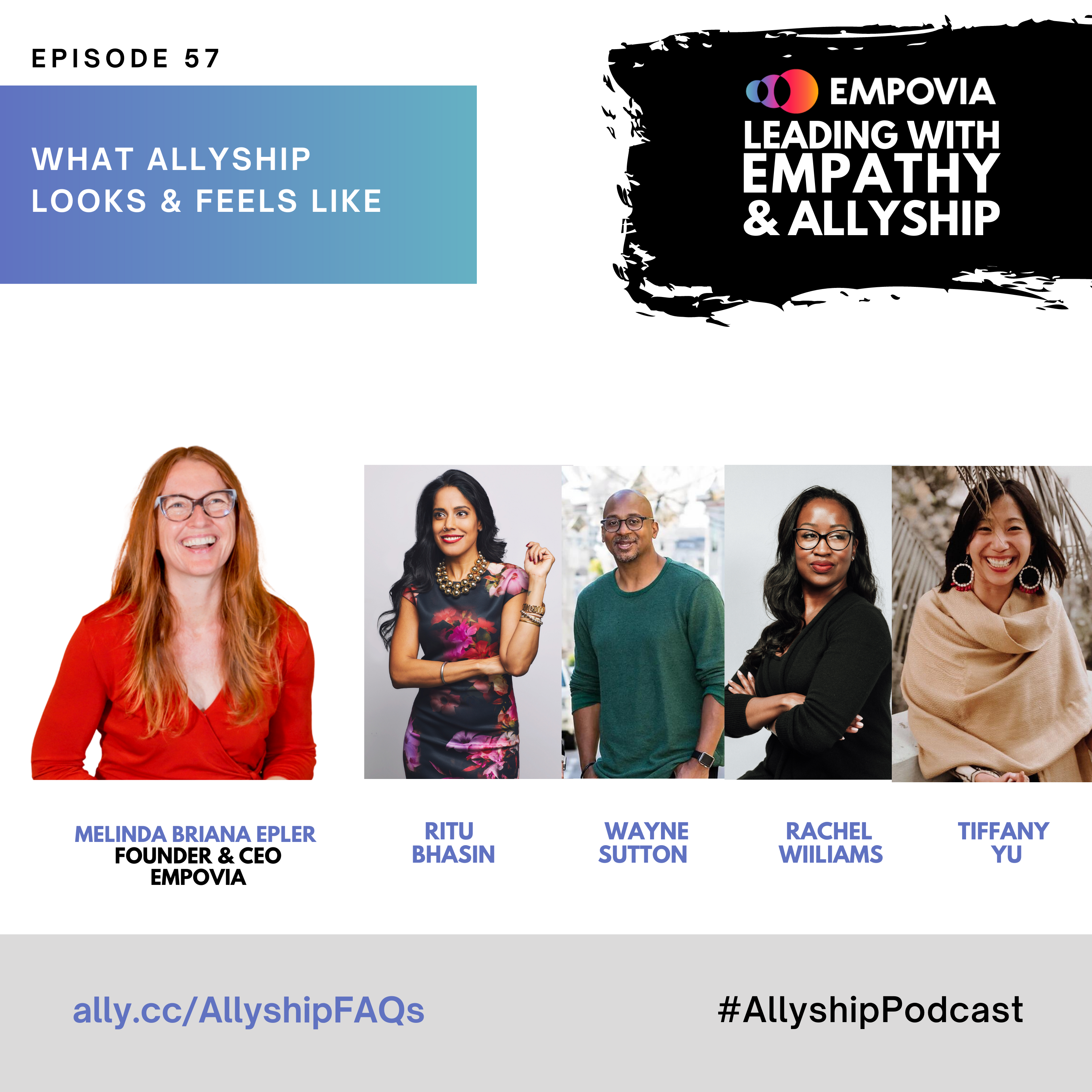
In Episode 57, Melinda Briana Epler is joined by four inspiring DEI experts: Ritu Bhasin, Wayne Sutton, Rachel Williams, and Tiffany Yu. They explore what allyship means to each of them, specific examples of how allies have impacted them, and how they think about being allies for others. This conversation was originally recorded during the launch event for How to Be an Ally, Melinda’s book.
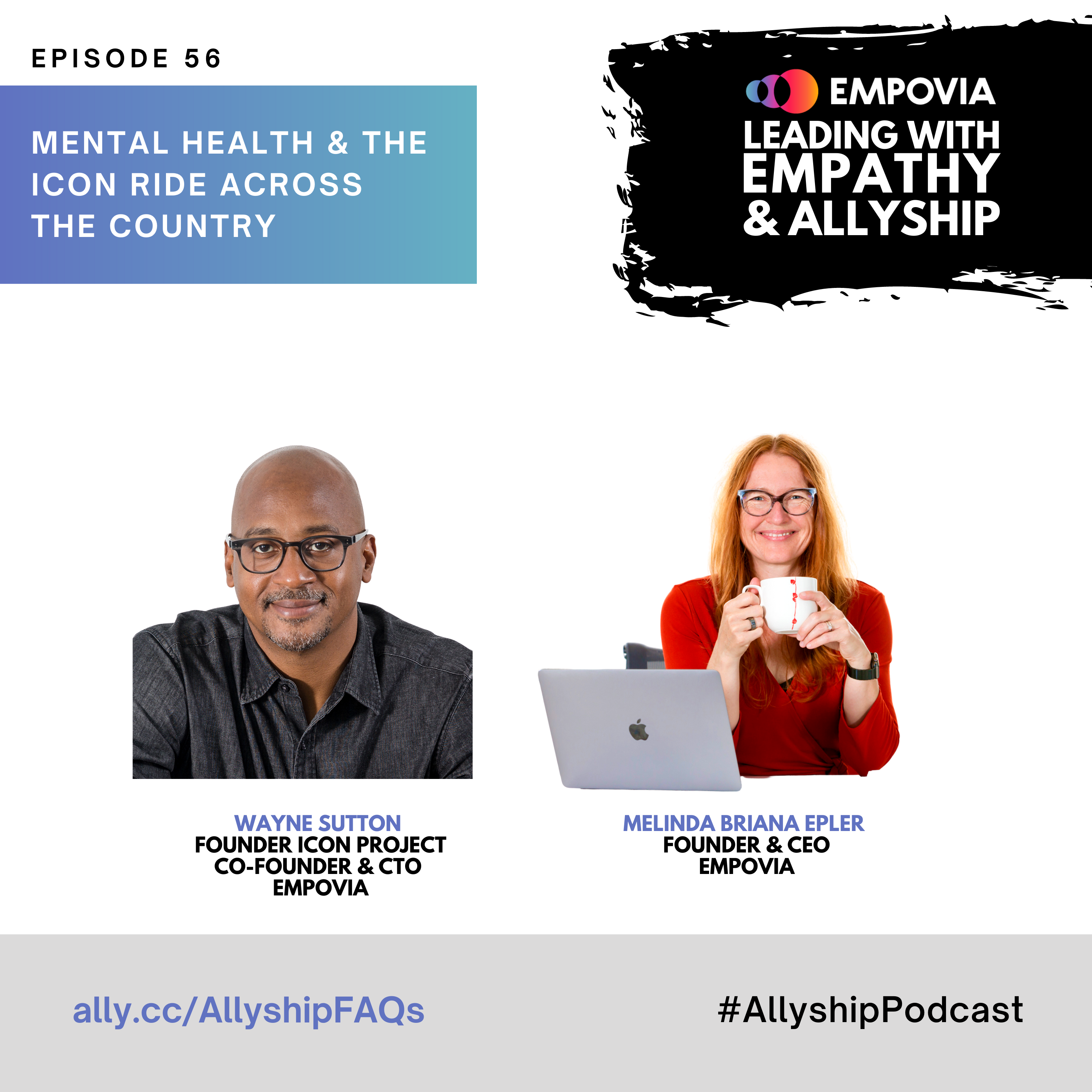
In Episode 56, Melinda brings in her husband, Co-Founder of Change Catalyst, and greatest ally, Wayne Sutton, for an honest conversation about addressing the mental health of Black and Brown men. Find out about Wayne’s motorcycle trip and learn about how Wayne and Melinda show up for each other in their interracial relationship.
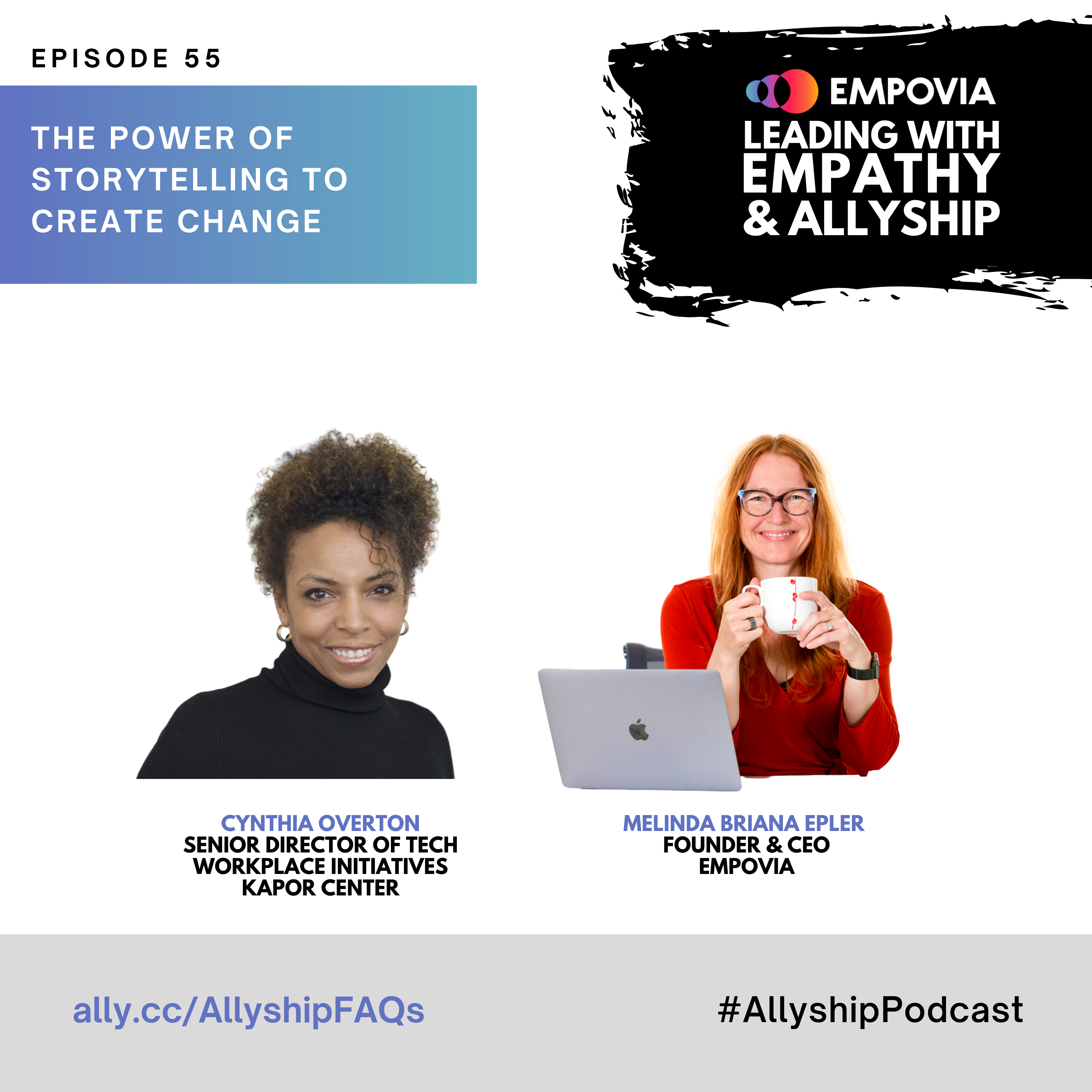
In Episode 55, Cynthia Overton, Senior Director of Tech Workplace Initiatives at the Kapor Center, dives into conversation with Melinda about the impact of storytelling. They discuss important ways storytelling can change our perception, whether that is by advocating through storytelling, interrupting our own stories to create internal change, or using stories to build empathy and trust.
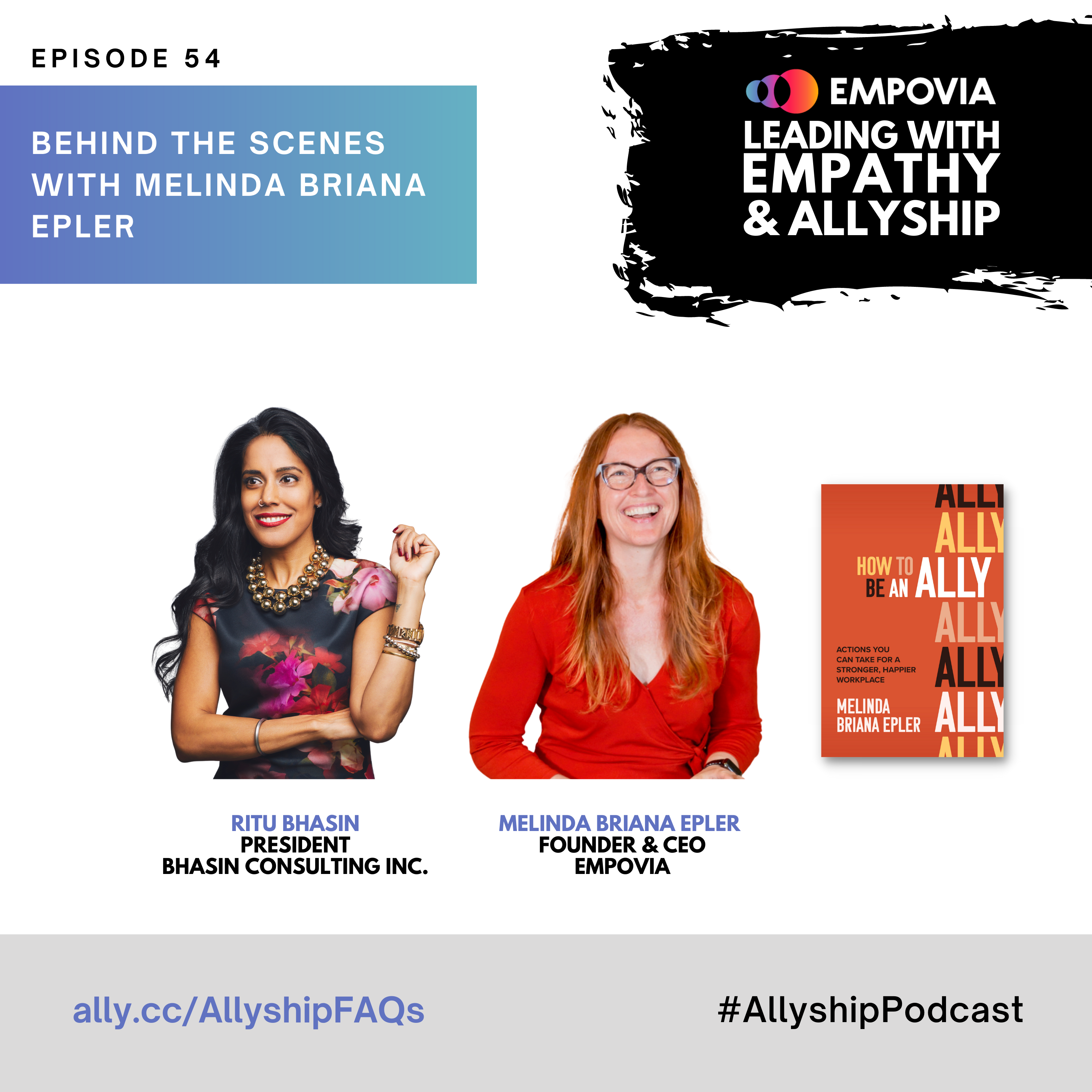
In Episode 54, Ritu Bhasin, Founder & President of bhasin consulting inc. and author of The Authenticity Principle, joins in discussion with Melinda Briana Epler — the human behind Leading With Empathy & Allyship, CEO of Change Catalyst, and new author of How to Be an Ally. We flip the script: Ritu hosts this episode in an intimate interview with Melinda as her new book launches! They explore Melinda’s journey to allyship, the process of writing How to Be an Ally, and why allyship matters.
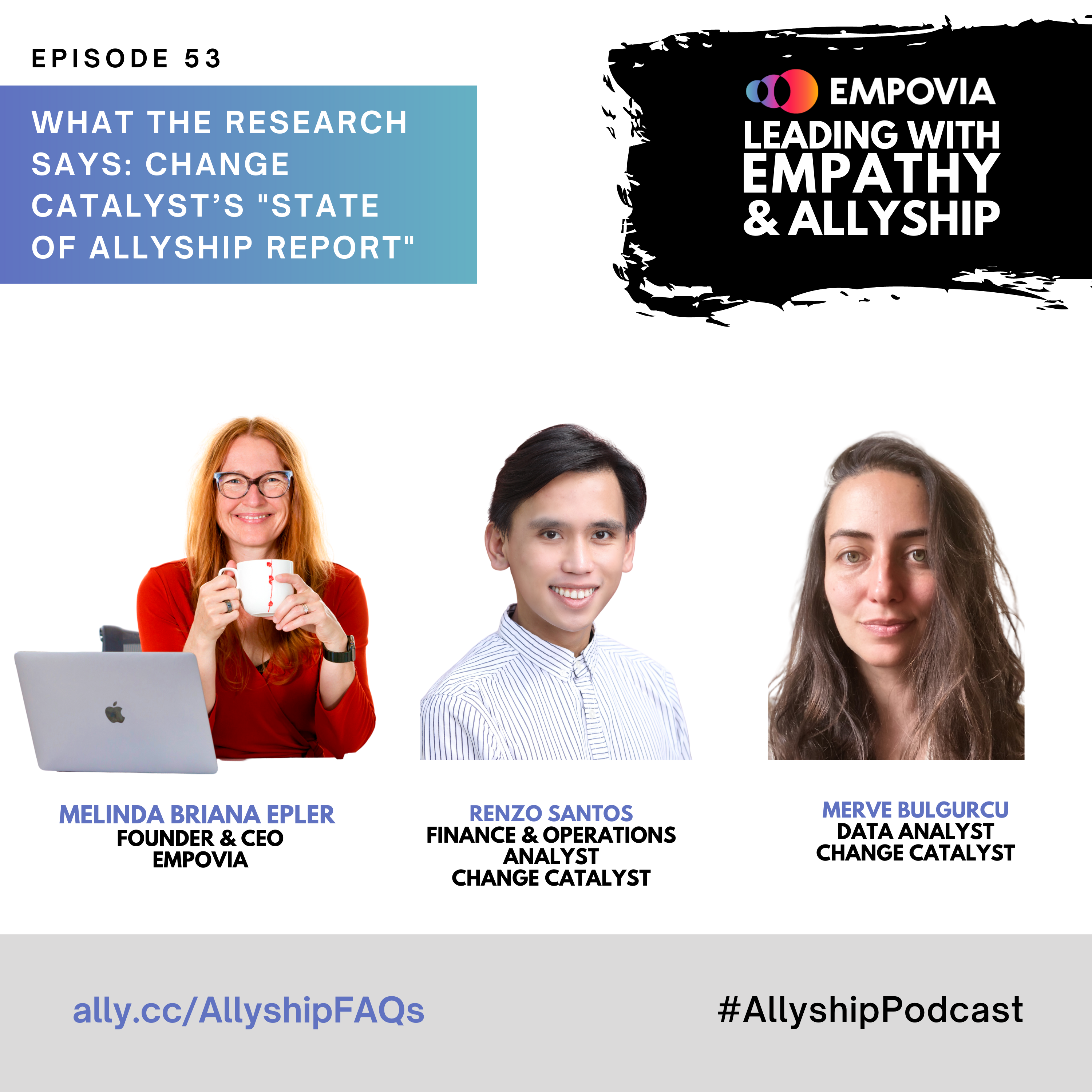
For the first episode of Season 5, Melinda is joined by Empovia team members Renzo Santos and Merve Bulgurcu to discuss key insights from the newly released State of Allyship Report: The Key to Workplace Inclusion. Melinda, Renzo, and Merve take you through the important findings the team has uncovered about what people want and need from allies, why allyship is important for business, and how people become better allies. Download the State of Allyship Report at ally.cc/report.
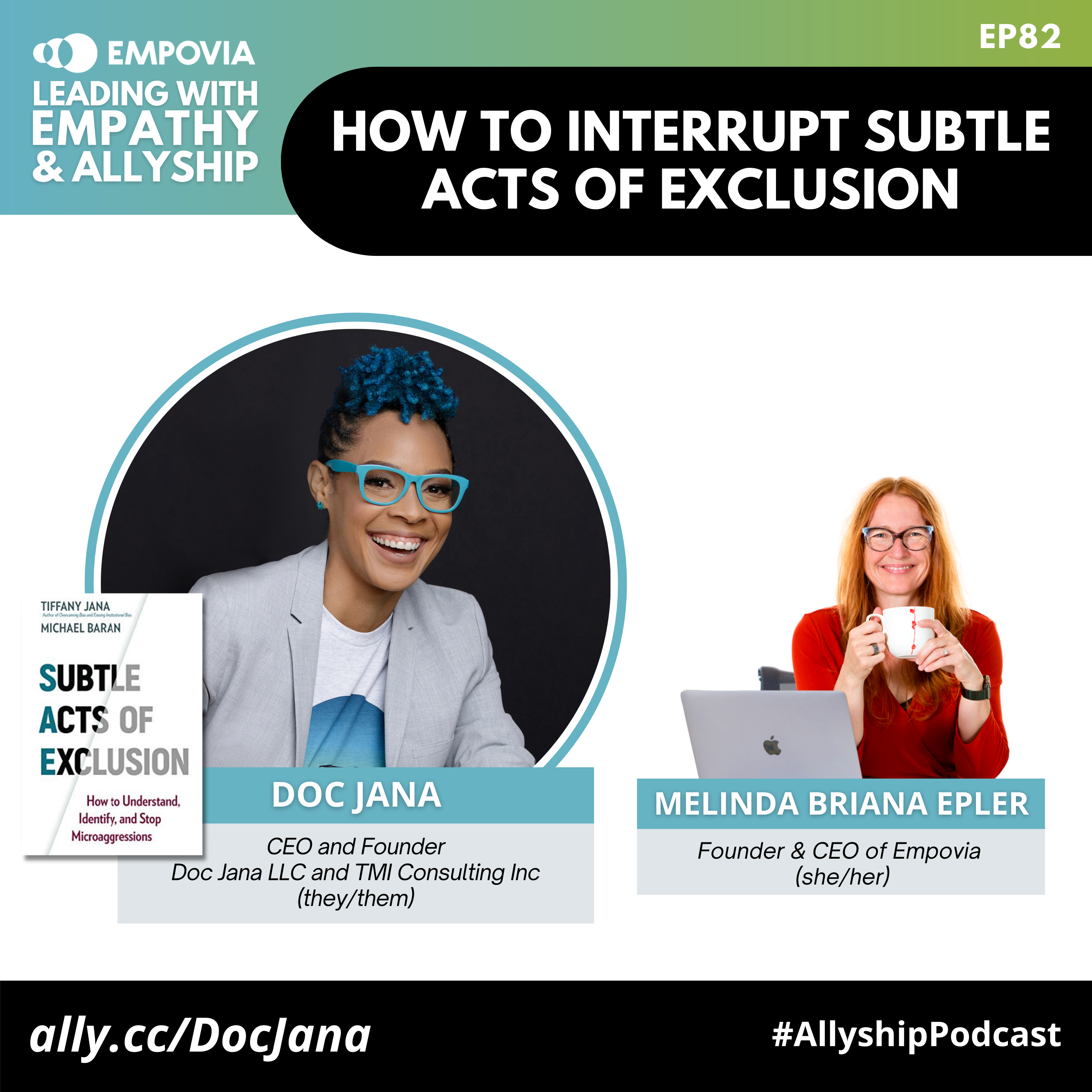
In Episode 82, Doc Jana, CEO & Founder of Doc Jana LLC and TMI Consulting Inc, joins Melinda in a conversation that gives individuals and organizations a clear approach to interrupting what Doc calls “subtle acts of exclusion,” also known as microaggressions, at work. They guide us through the steps in addressing our own biases, which are often the root of these subtle acts of exclusion. Doc also shares their latest work and their participation in pleasure activism as a way to reclaim joy and find liberation and healing from the pain of trauma.
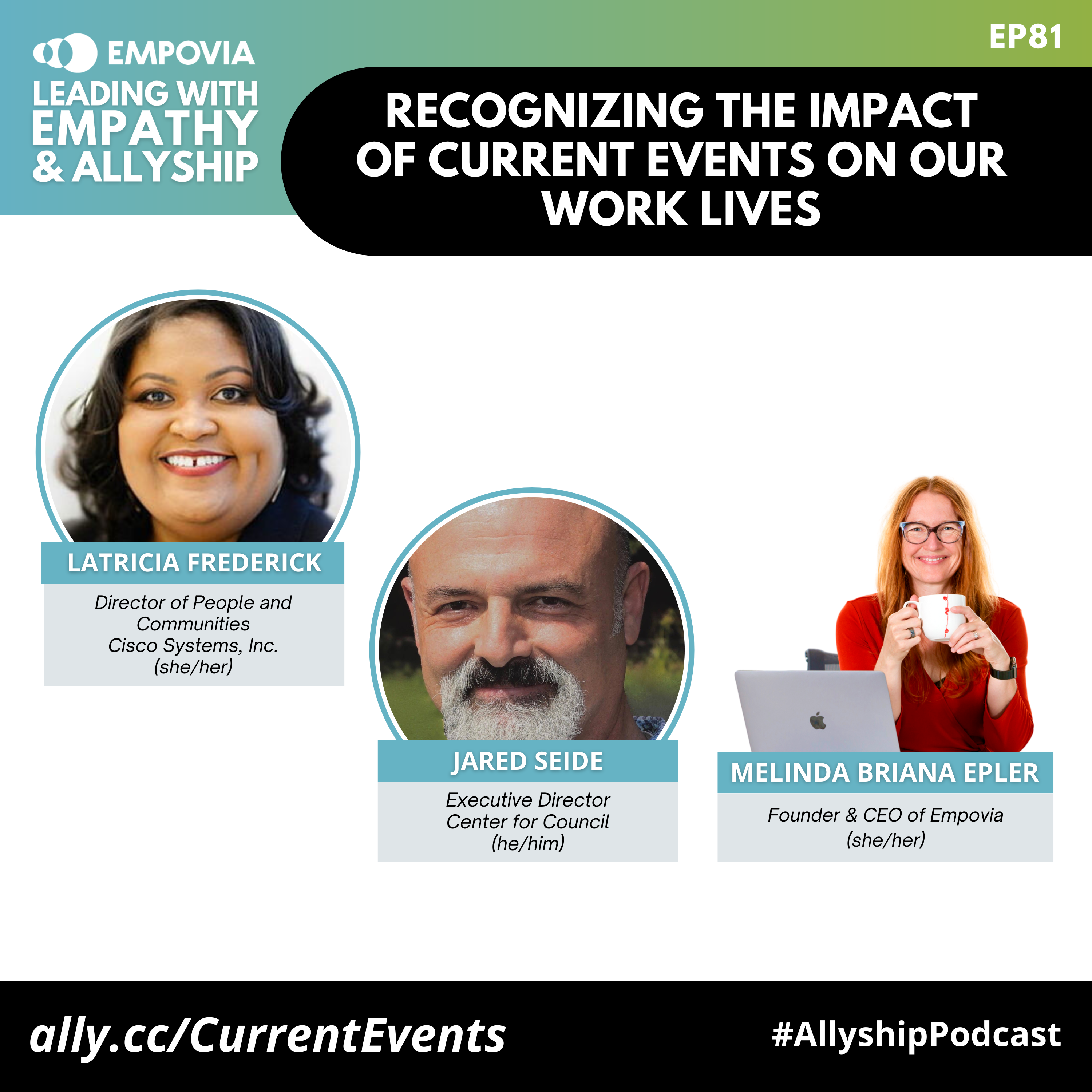
In Episode 81, Melinda is joined by leadership and management experts LaTricia Frederick and Jared Seide in a live recording. They discuss important ways for us to recognize, as well as protect our well-being from, the impact of current events on our work lives. They also dive into how managers, companies, and allies can take part in creating safe, compassionate spaces for addressing our experiences—whether it be through showing support, harnessing the power of vulnerability, or sharing stories.
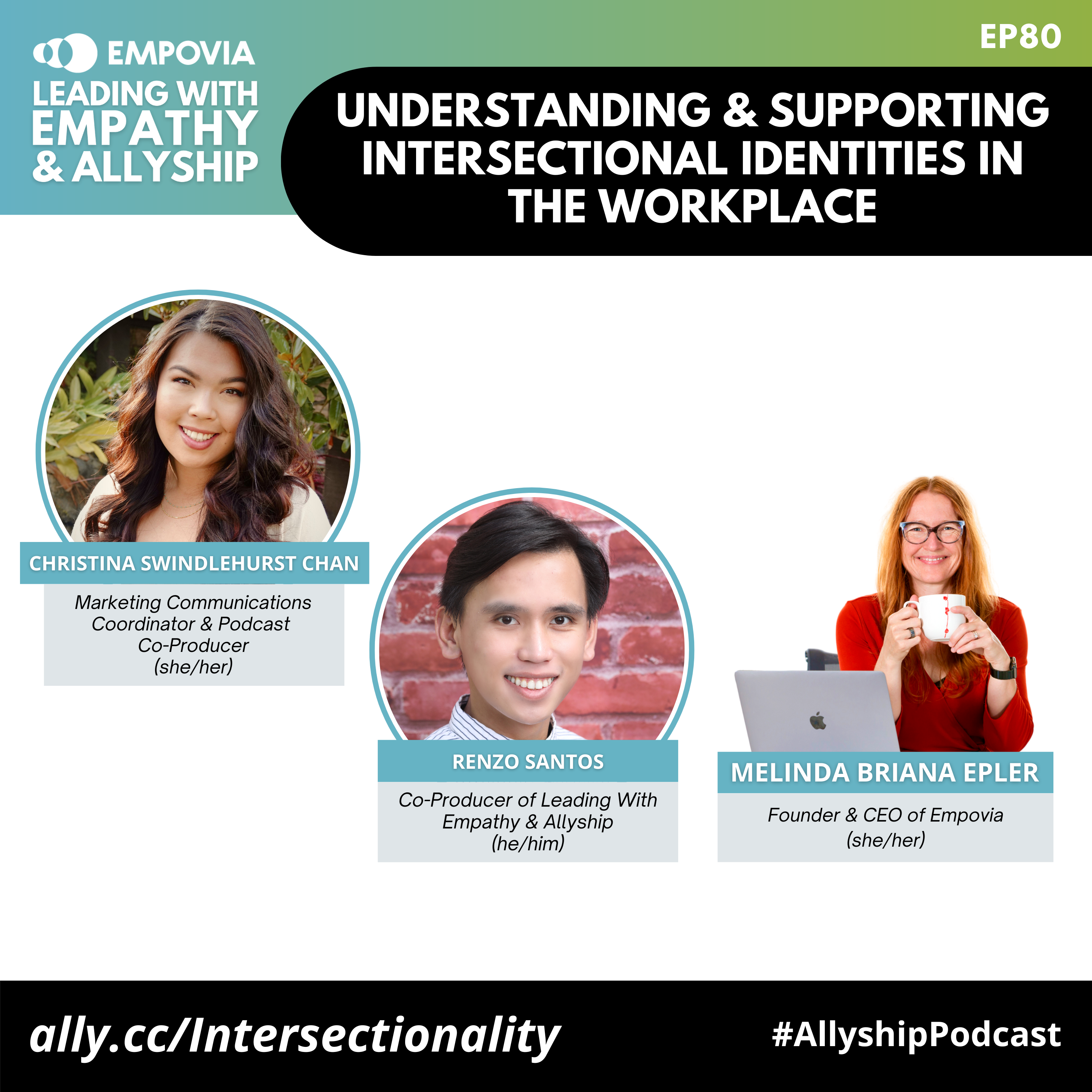
In Episode 80, Melinda is joined by her amazing co-producers from the Leading With Empathy & Allyship show, Christina Swindlehurst Chan and Renzo Santos, to discuss helpful ways for organizations to understand and support intersectional identities at work. Christina and Renzo describe how intersectionality has shaped their own experiences within their communities and workplaces. They also suggest practical steps that allies can take to foster an empathetic and inclusive work culture that is mindful of intersectional experiences.
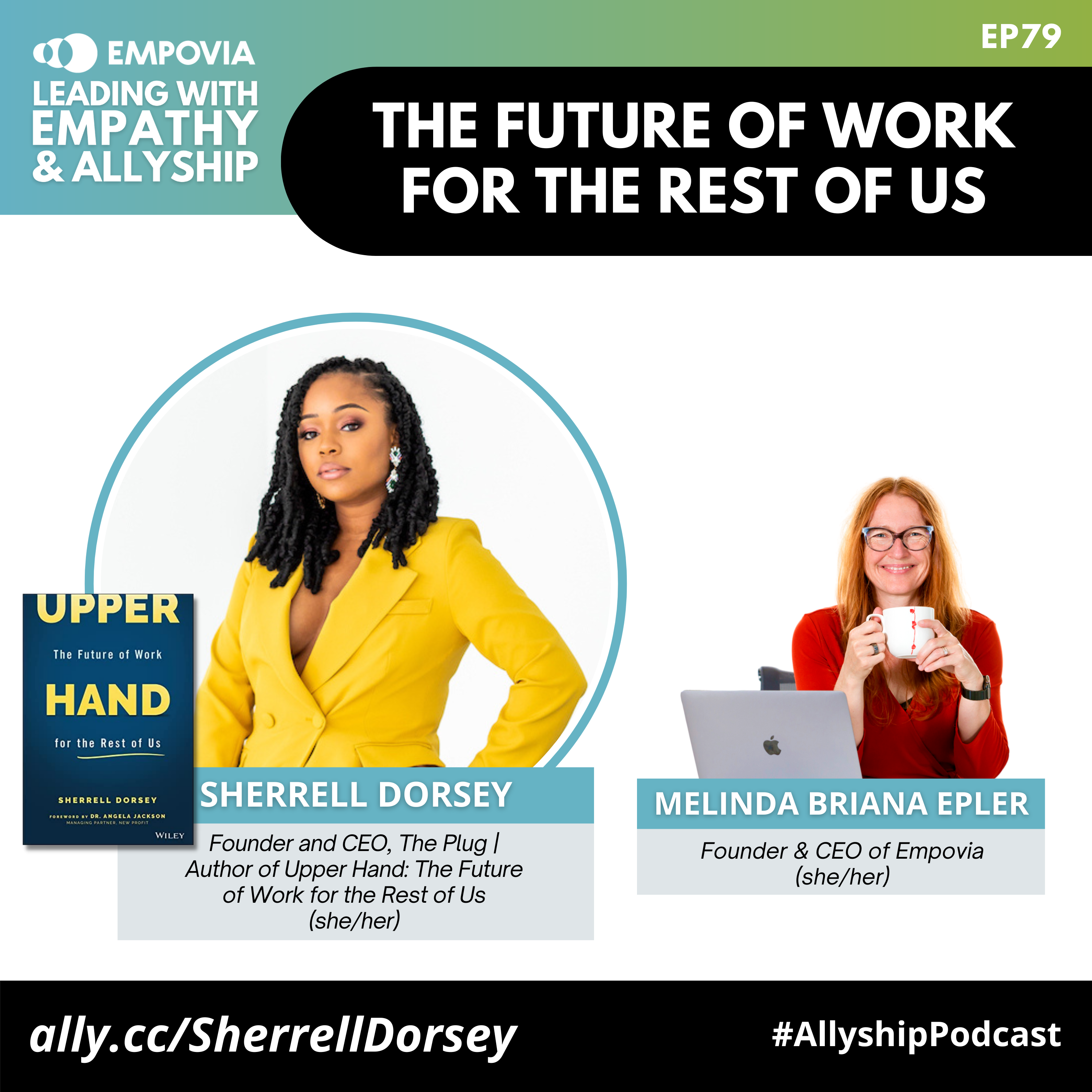
In Episode 79, Sherrell Dorsey, Founder & CEO of The Plug and Author of Upper Hand: The Future of Work for the Rest of Us, dives into an insightful conversation with Melinda about the future of work and strategies for supporting inclusive innovation. They discuss important ways for people from marginalized communities to thrive and actively take part in the tech-driven economy, whether that is by reskilling, upskilling, fighting coded bias, or getting started in tech.
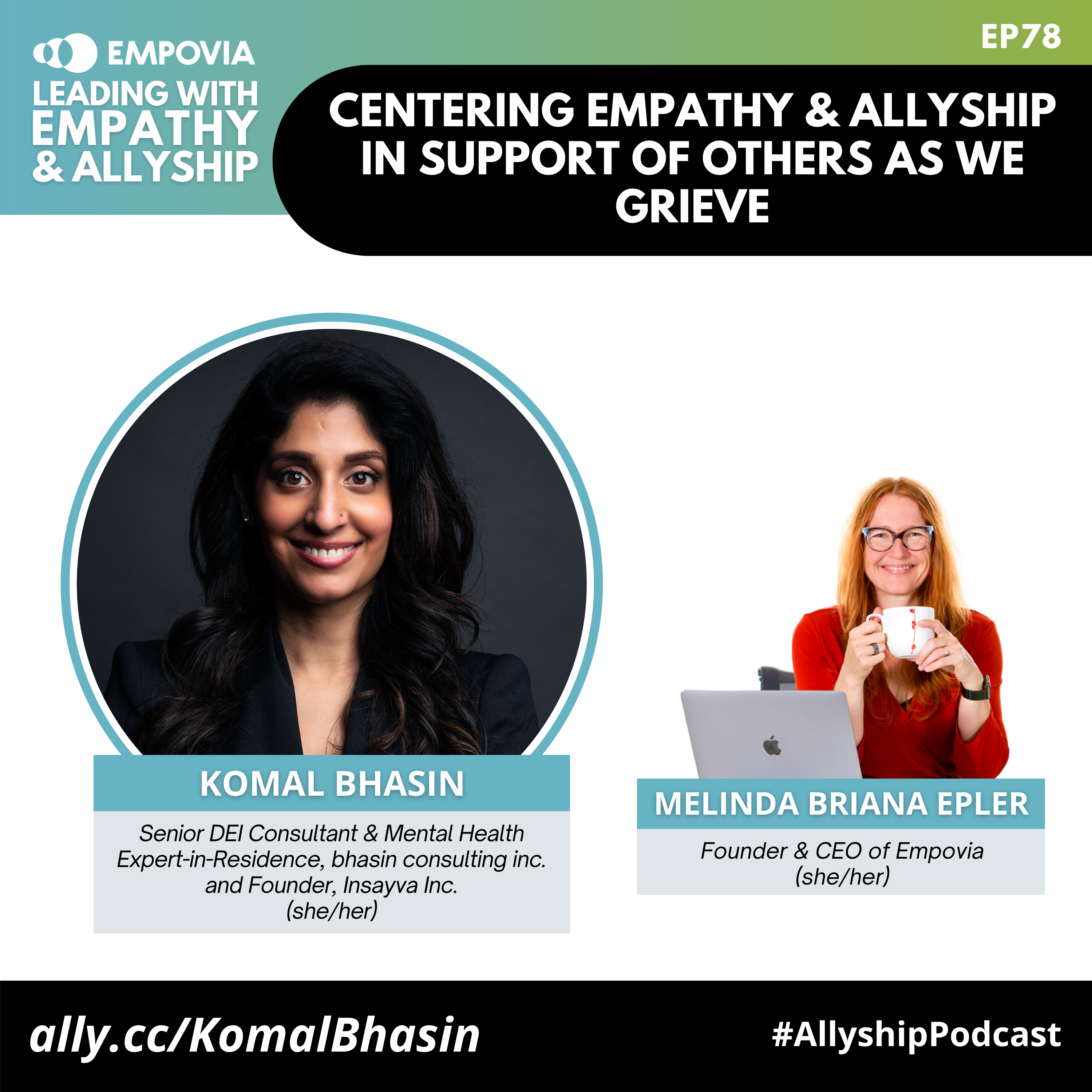
In Episode 78, Dr. Komal Bhasin, Senior DEI Consultant & Mental Health Expert-in-Residence at bhasin consulting inc. and Founder at Insayva Inc., joins Melinda in a conversation about centering empathy and allyship in communities impacted by injustice during times of crisis, pain, and tragedy.
Komal explains how individuals and organizations alike can learn the skill of empathy according to science. She recommends practical ways to drive inclusion and build psychological safety at work by creating an environment where managers recognize and address marginalizing behaviors. Throughout the episode, she shares how we can use our power, resources, and privilege to impactfully support others even when we experience marginalization ourselves.
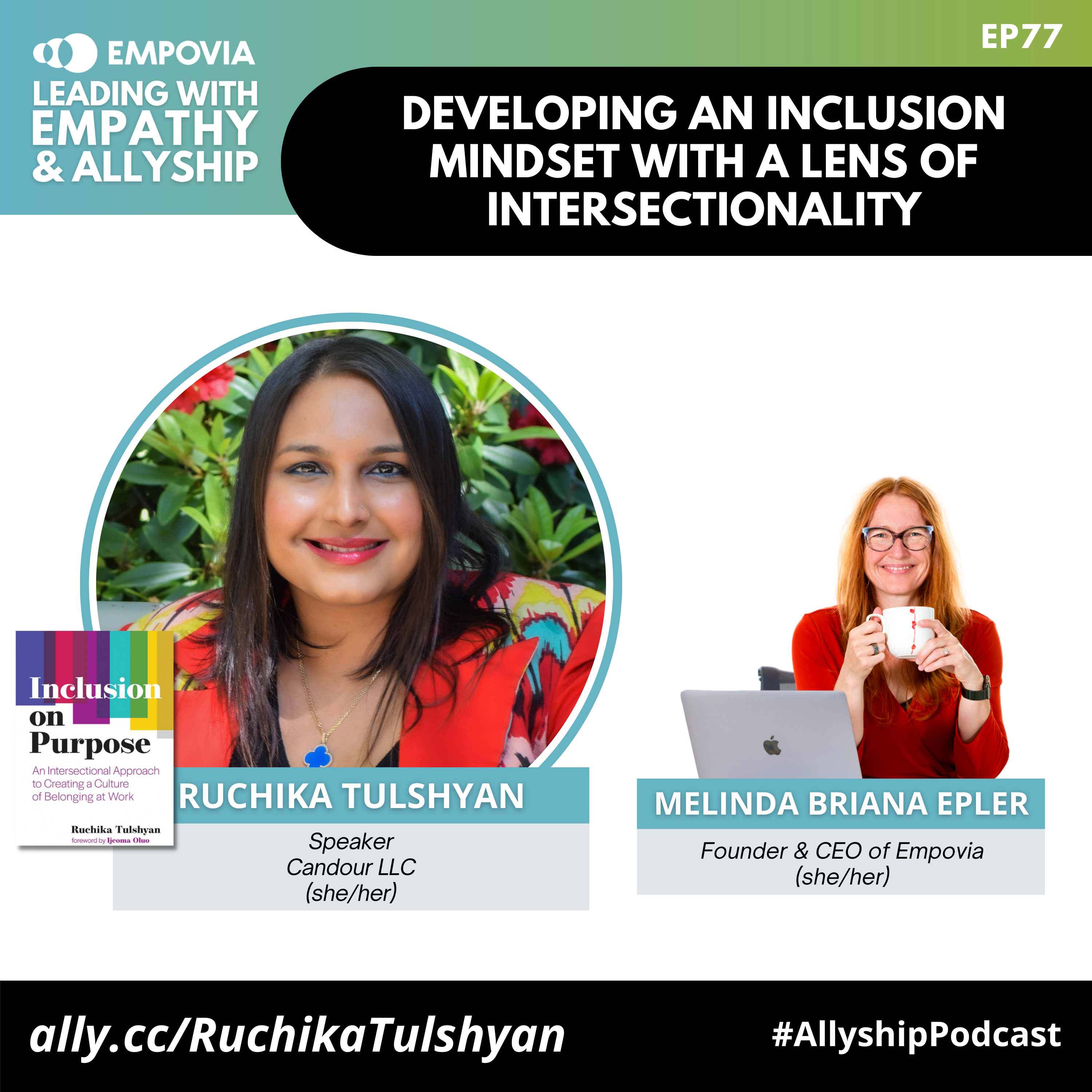
In Episode 77, Ruchika Tulshyan, Founder of Candour and author of “Inclusion on Purpose: An Intersectional Approach to Creating a Culture of Belonging at Work”, joins Melinda to discuss how we develop an inclusion mindset that centers women of color, build empathy for people from a broad range of cultures and backgrounds, and focus on the importance of intersectionality and anti-racism in our work as allies and advocates.
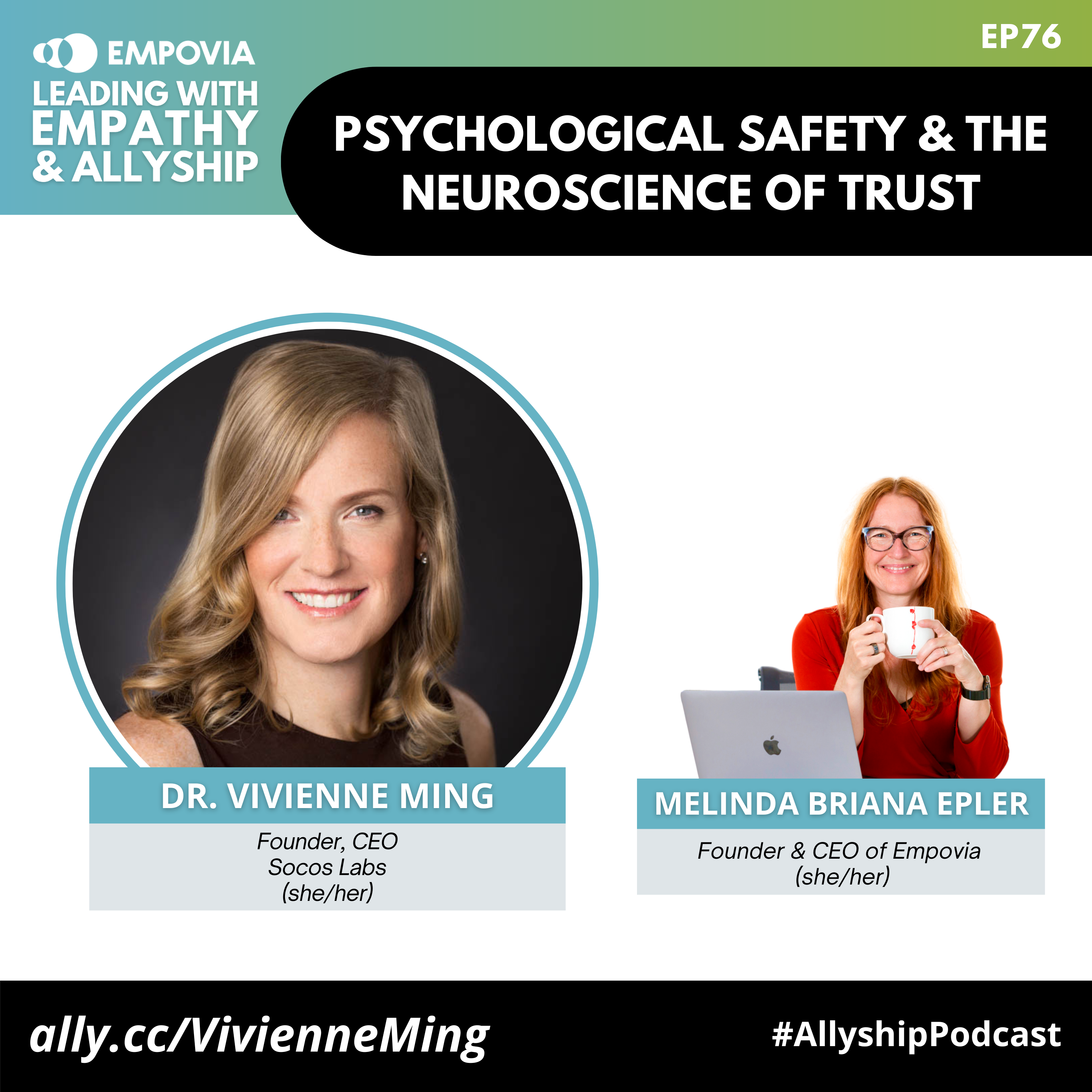
Trigger warning: This podcast episode contains discussion of suicidal ideation.
In Episode 76 (recorded live), Dr. Vivienne Ming, Founder, and CEO of Socos Labs, joins Melinda to discuss her new research on the neuroscience of trust in the workplace. They explore why we tend to feel an innate sense of trust in certain people over others, how we can overcome these biases to strengthen the trust on our teams, and how working remotely can shift how we build trust and psychological safety.
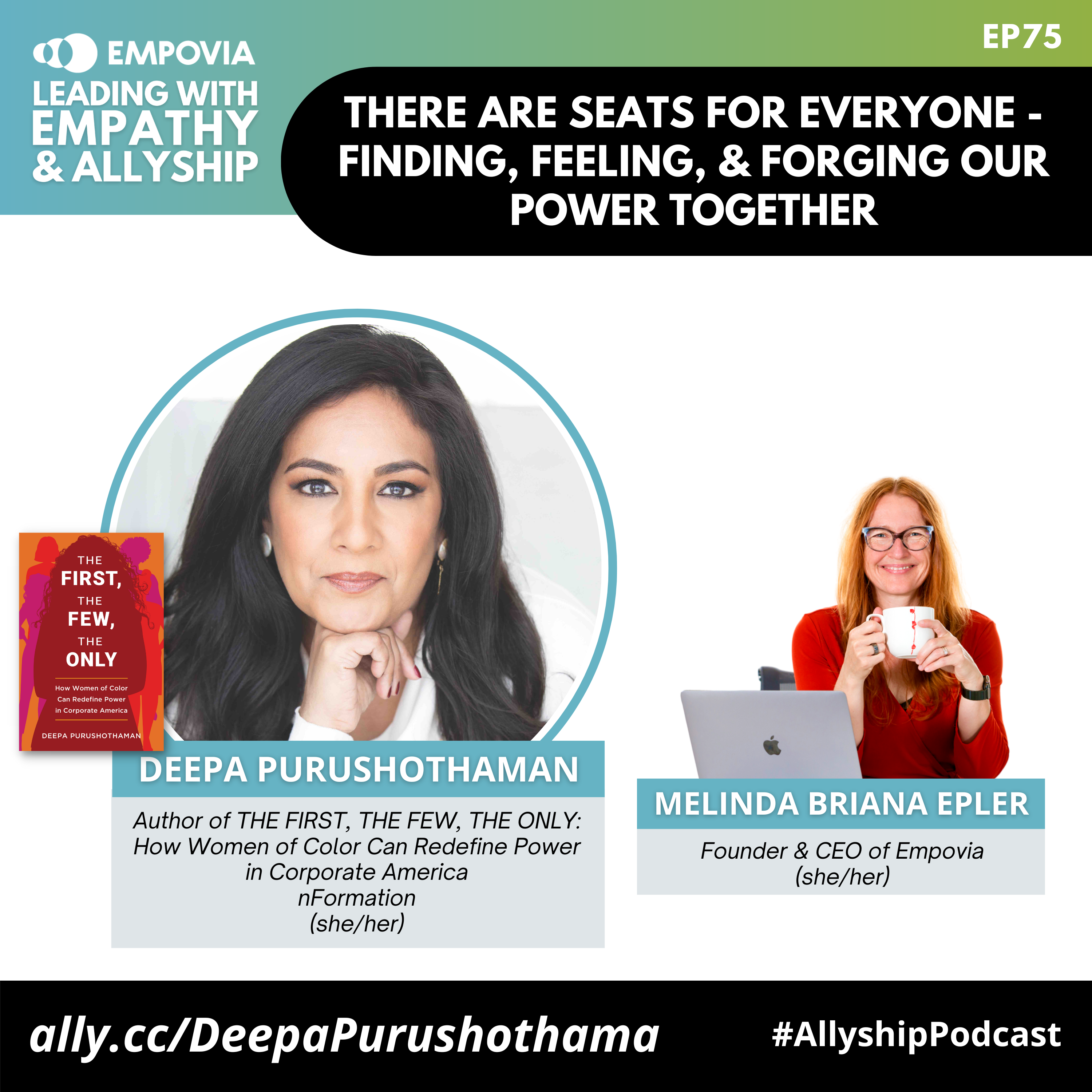
In Episode 75, Deepa Purushothaman, author of THE FIRST, THE FEW, THE ONLY: How Women of Color Can Redefine Power in Corporate America, joins Melinda to discuss the structural and cultural dynamics of what women of color are experiencing in the workplace, how women can get comfortable sitting in positions of power, and why it’s important to shift away from a scarcity mindset to allow more women of color a seat at the table.
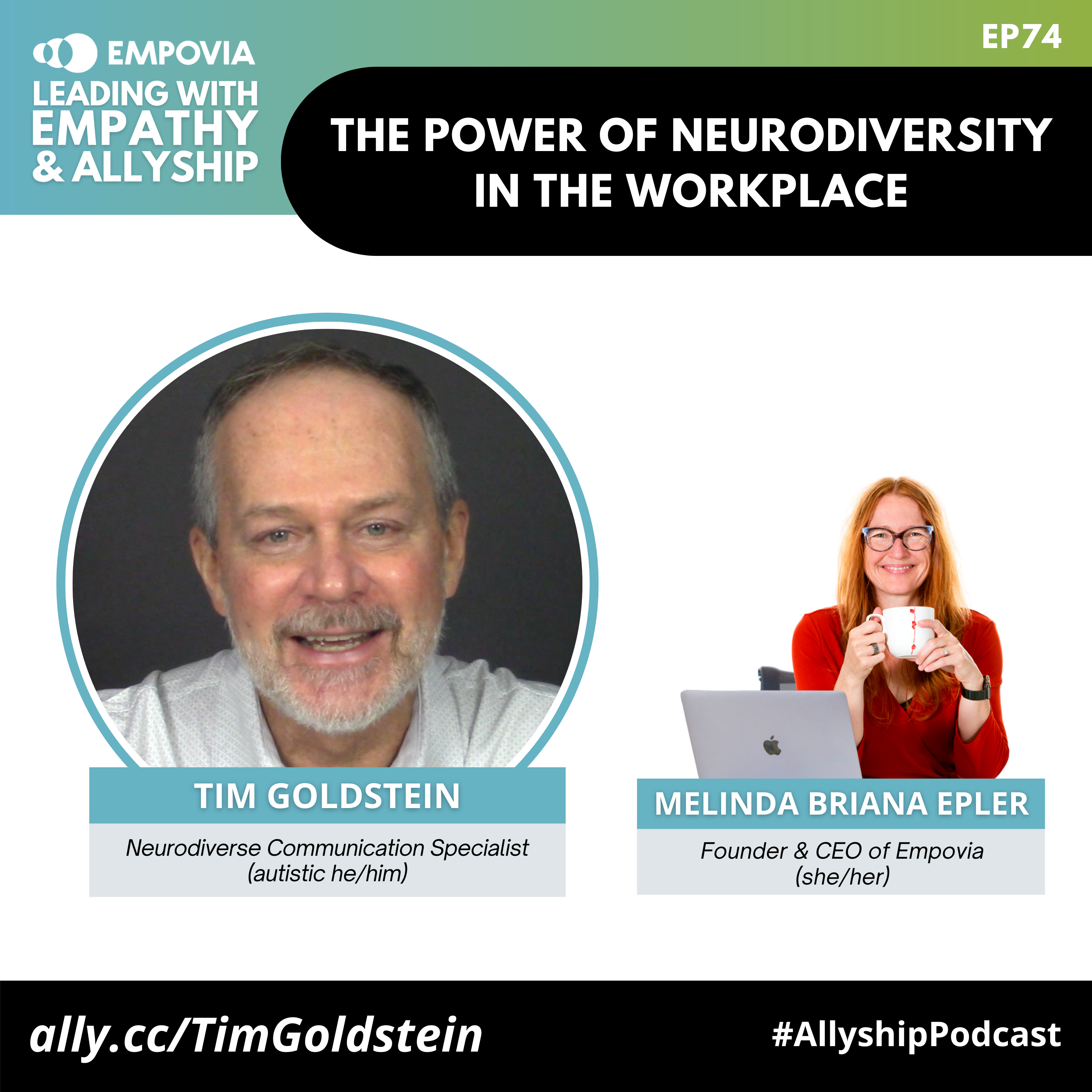
In Episode 74, Tim Goldstein, Neurodiverse Communication Specialist, joins Melinda to explore what it means to have a neurodistinct team. They discuss the breadth of neurodiverse experiences, how we can be good allies to neurodistinct colleagues, and the significant benefits of having neurodiversity in the workplace.
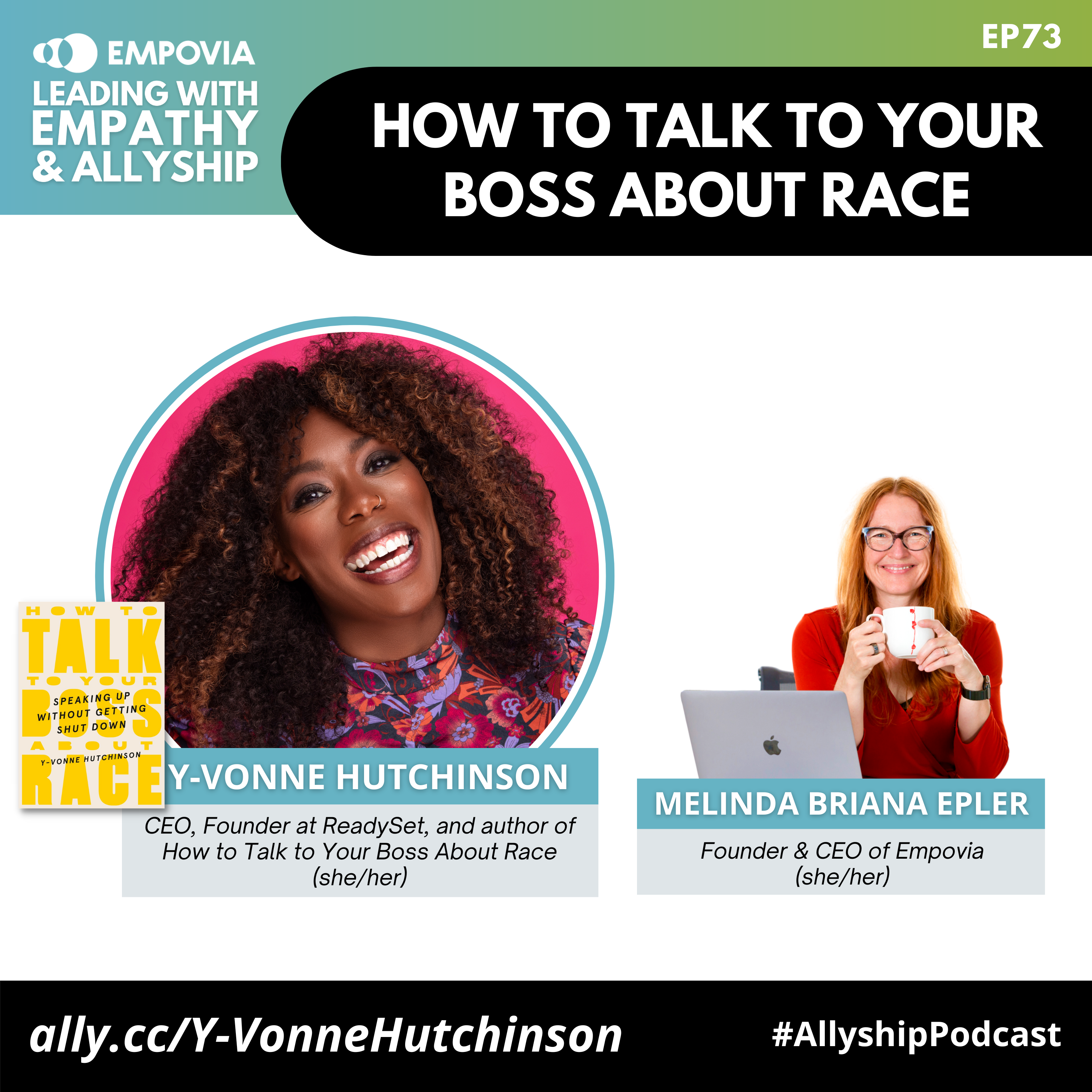
In Episode 73, Y-Vonne Hutchinson, CEO & Founder at ReadySet and author of How to Talk to Your Boss About Race, joins us to discuss how our labor history has informed the racism and microaggressions we observe in our workplaces today, how we can create change through difficult but important conversations, and how we can rethink the role of power as we discuss these issues with our bosses.
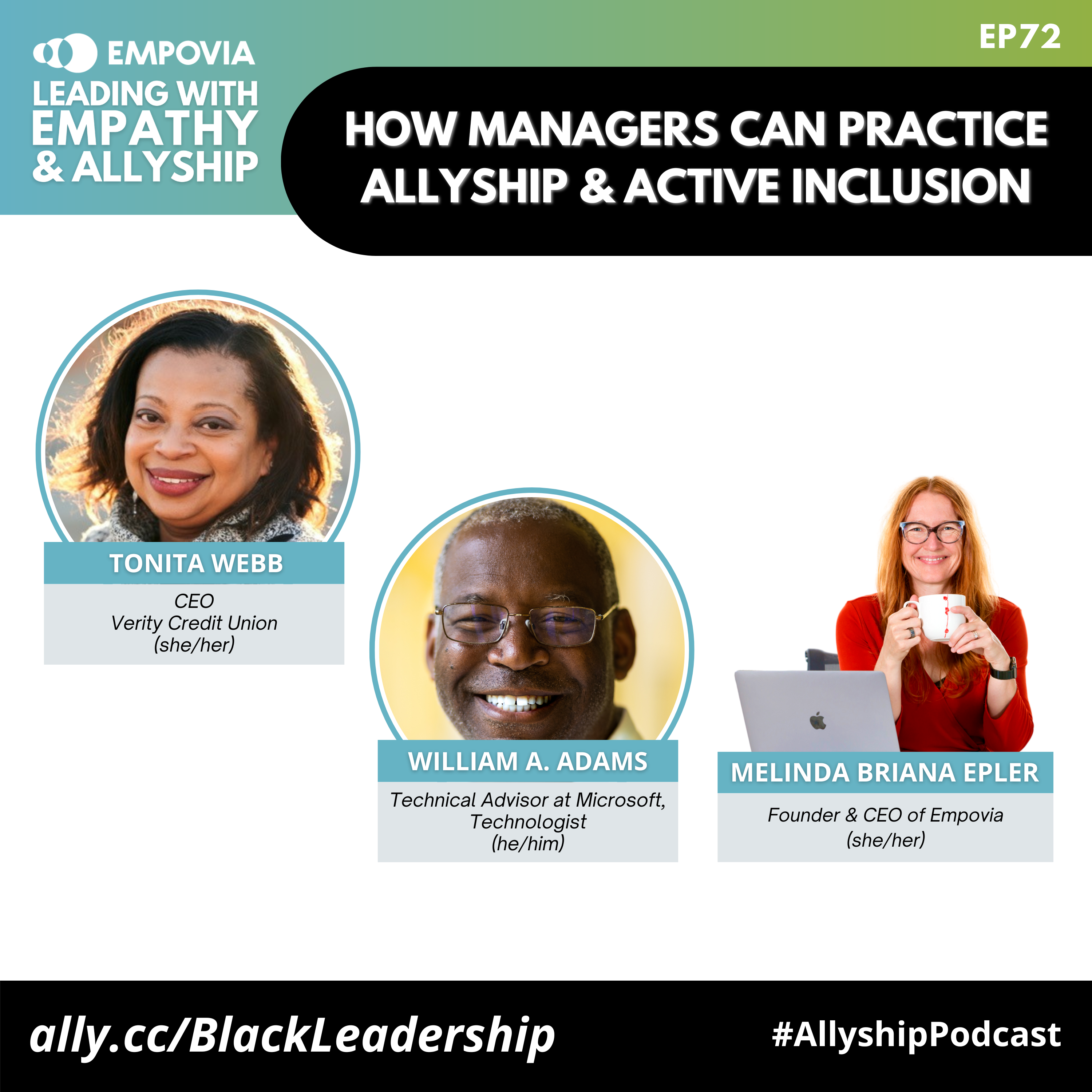
In Episode 72 (recorded live), Tonita Webb, CEO at Verity Credit Union, and William A. Adams, Technical Advisor at Microsoft & Technologist, join us to discuss the systemic barriers and biases that Black leaders experience in the workplace, the importance of self-care and addressing healing, and how we can build workplace culture where Black leaders can thrive.
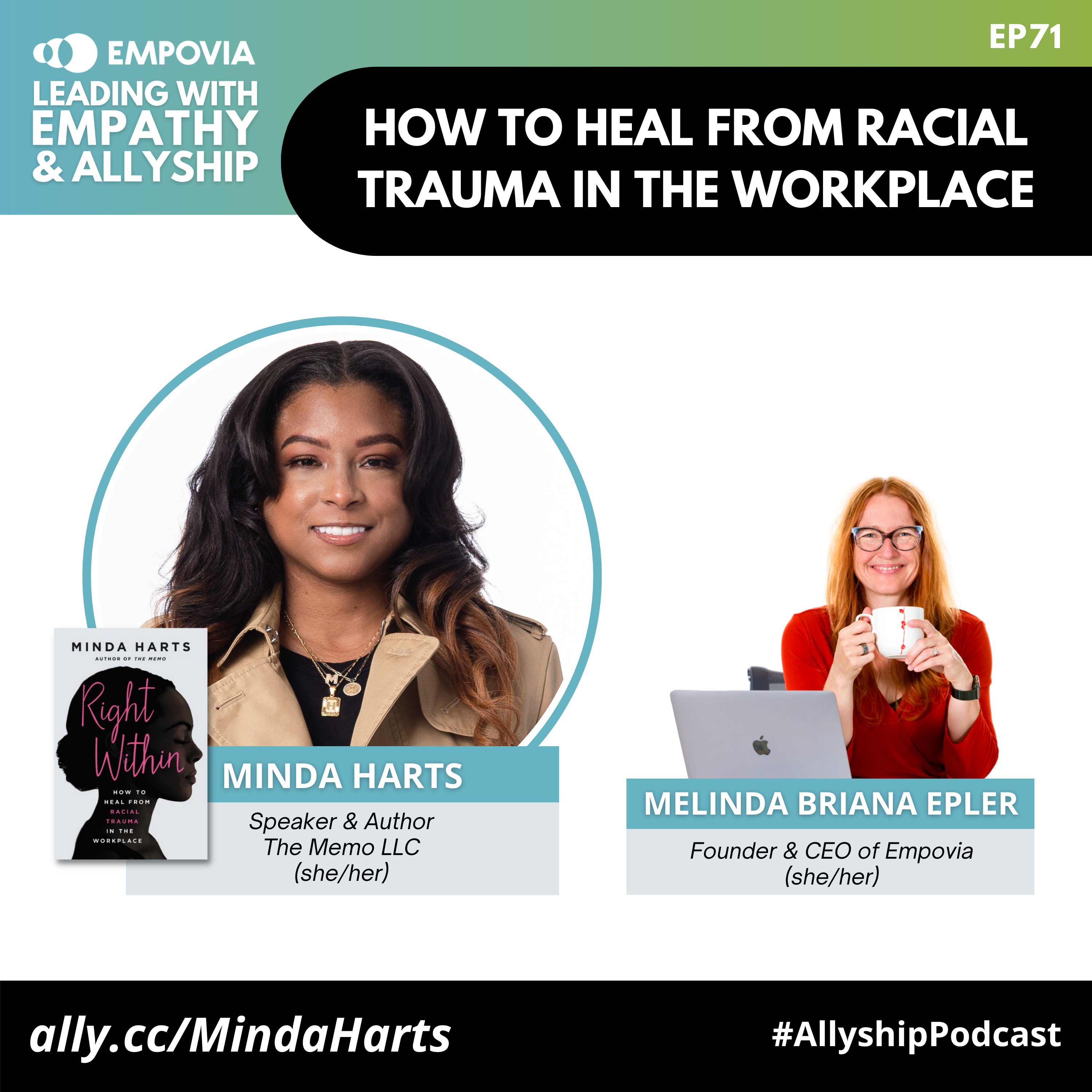
In Episode 71, Minda Harts, Speaker & Author at Memo LLC, joins us to discuss the trauma that women of color experience in the workplace, the role allies can play in the healing process, and how managers can reduce workplace trauma.
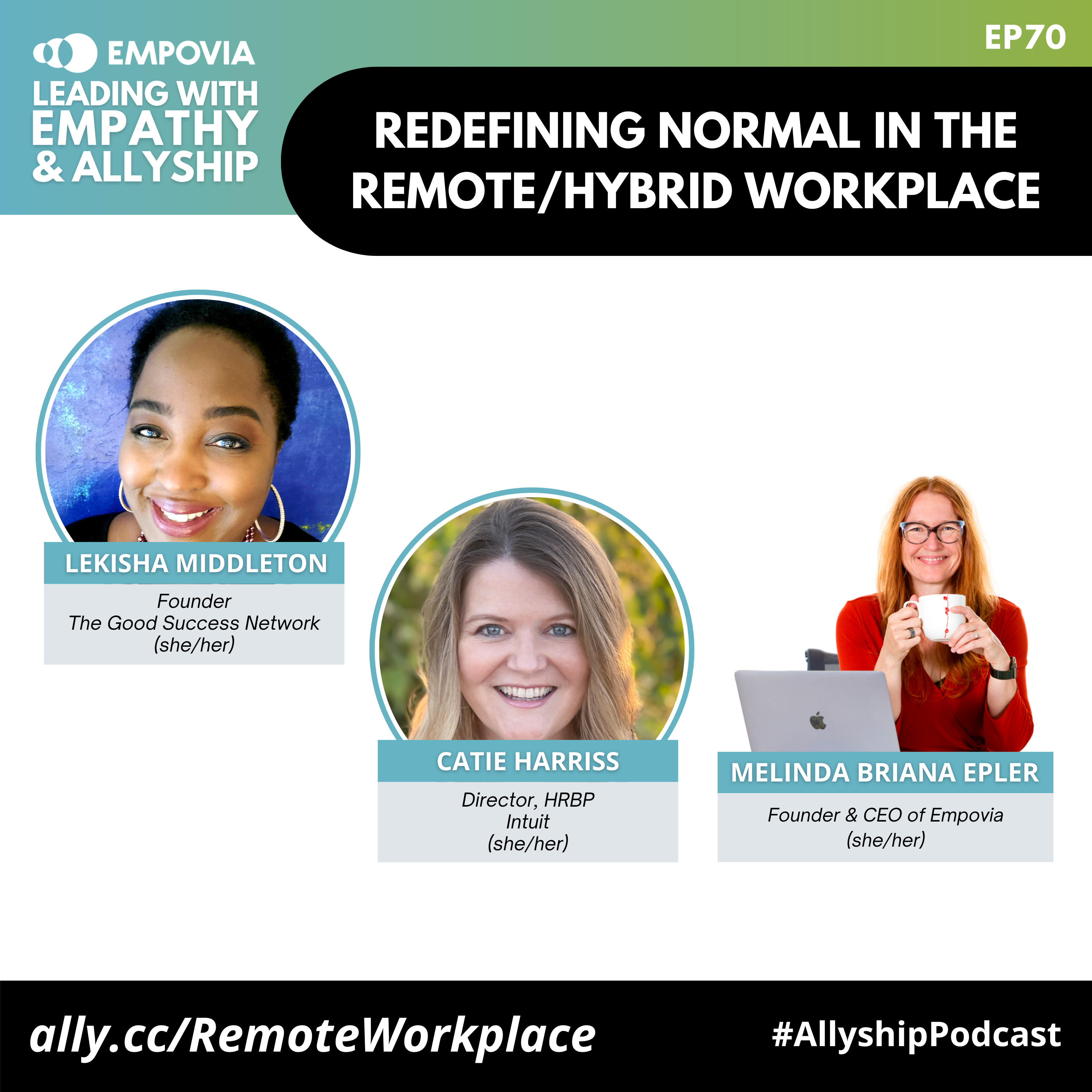
In Episode 70, Founder of The Good Success Network, Lekisha Middleton, and HR business partner director in Intuit’s Consumer Group, Catie Harriss, join Melinda to discuss what they’ve learned from the ‘Great Resignation’; how we can build diversity, equity, and inclusion in remote and hybrid workplaces; and the unique opportunities that these workplaces provide around DEI.
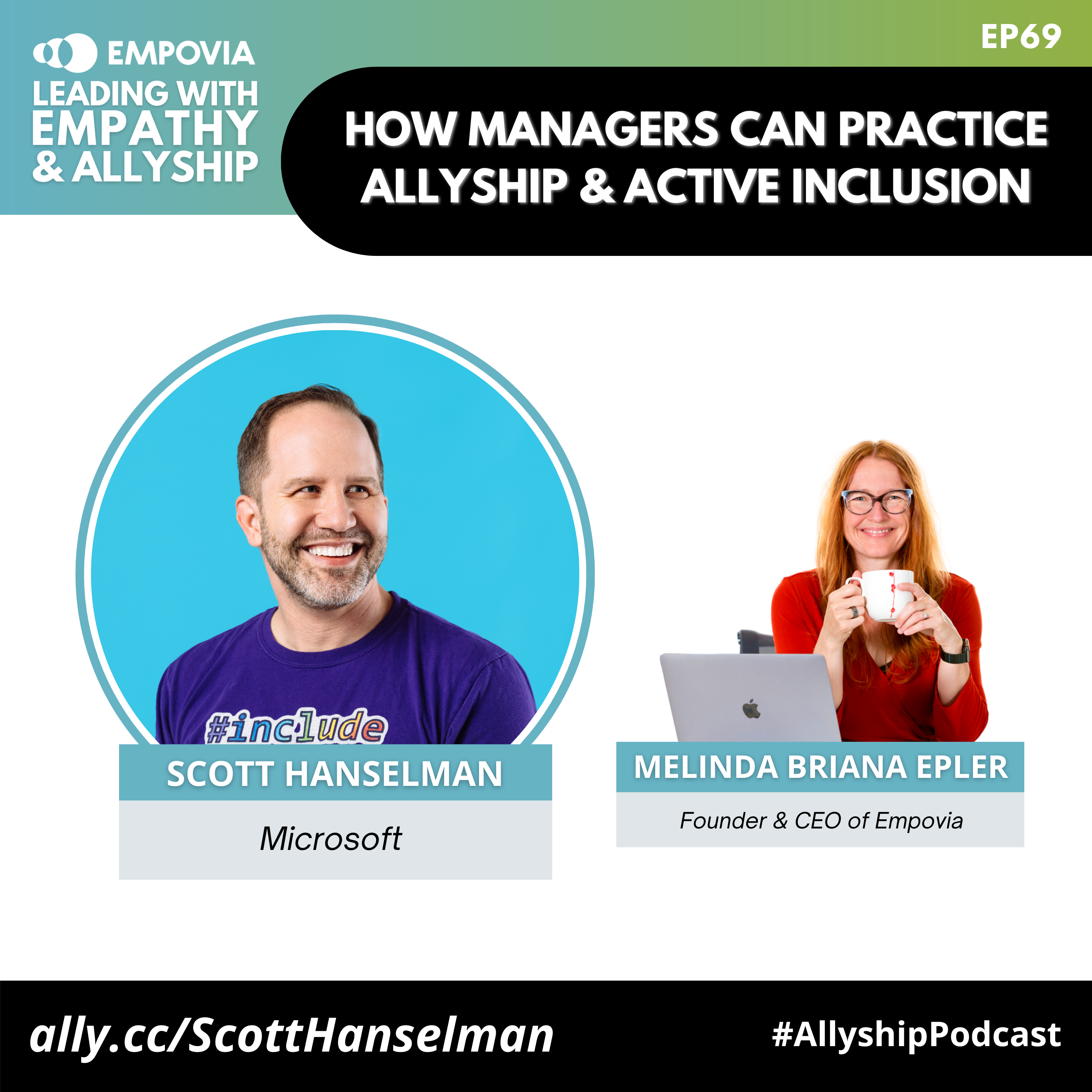
In Episode 69, Scott Hanselman from Microsoft joins us to discuss how we can bring more people in to become allies and what allyship means to Scott. We discuss Scott’s path to allyship, why Scott works to be an ally, and what to do when you make mistakes as an ally.
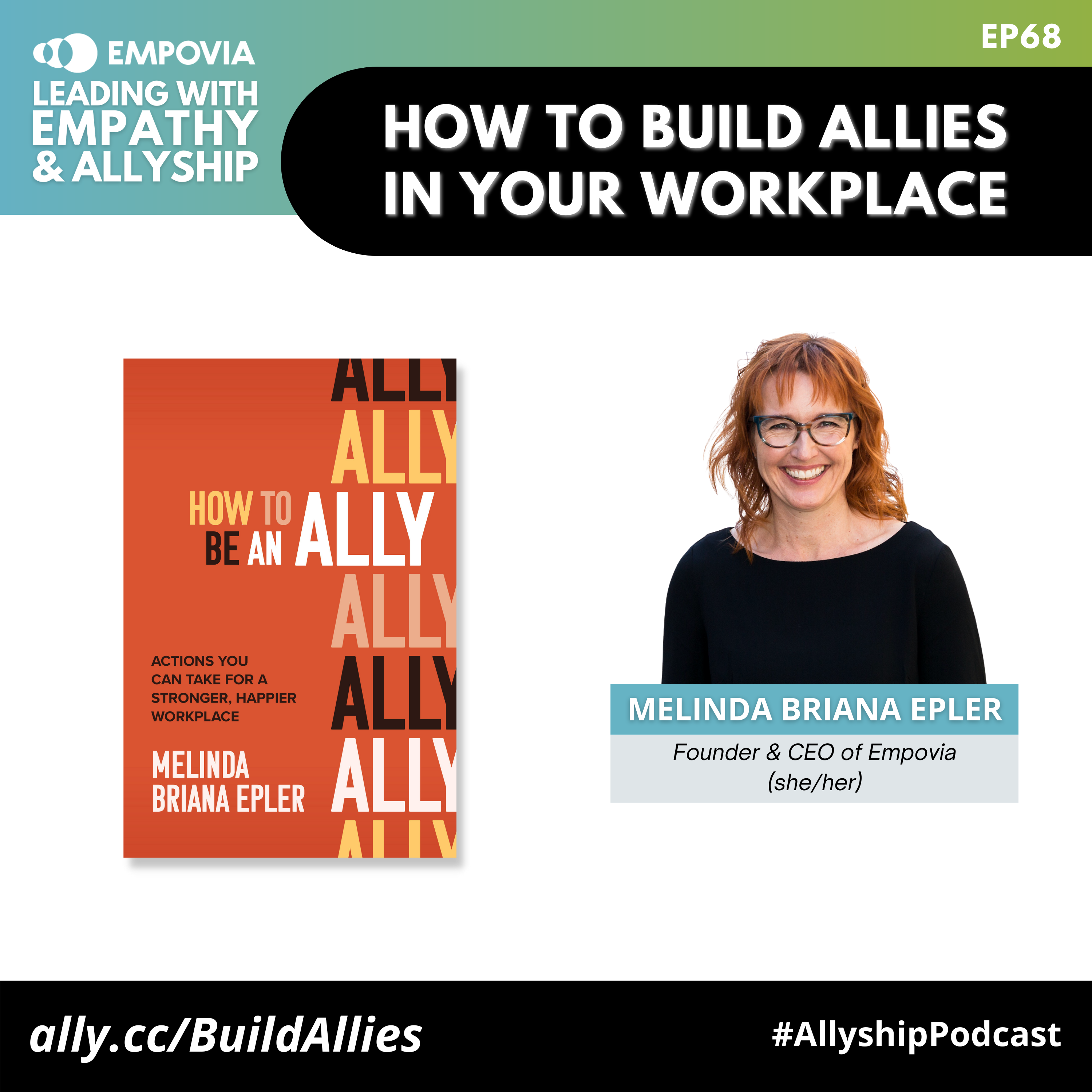
In Episode 68, Melinda Briana Epler, Founder and CEO of Change Catalyst, talks us through how we can build allies in the workplace by understanding the Stages of Allyship and people’s motivations for being allies. She explains the behavioral science behind moving people toward action, addresses how we can convince people who don’t want to be convinced, and shares how we can grow allyship across our teams, organizations, and communities.
View this episode’s accompanying infographic at ally.cc/EP68Graphic.
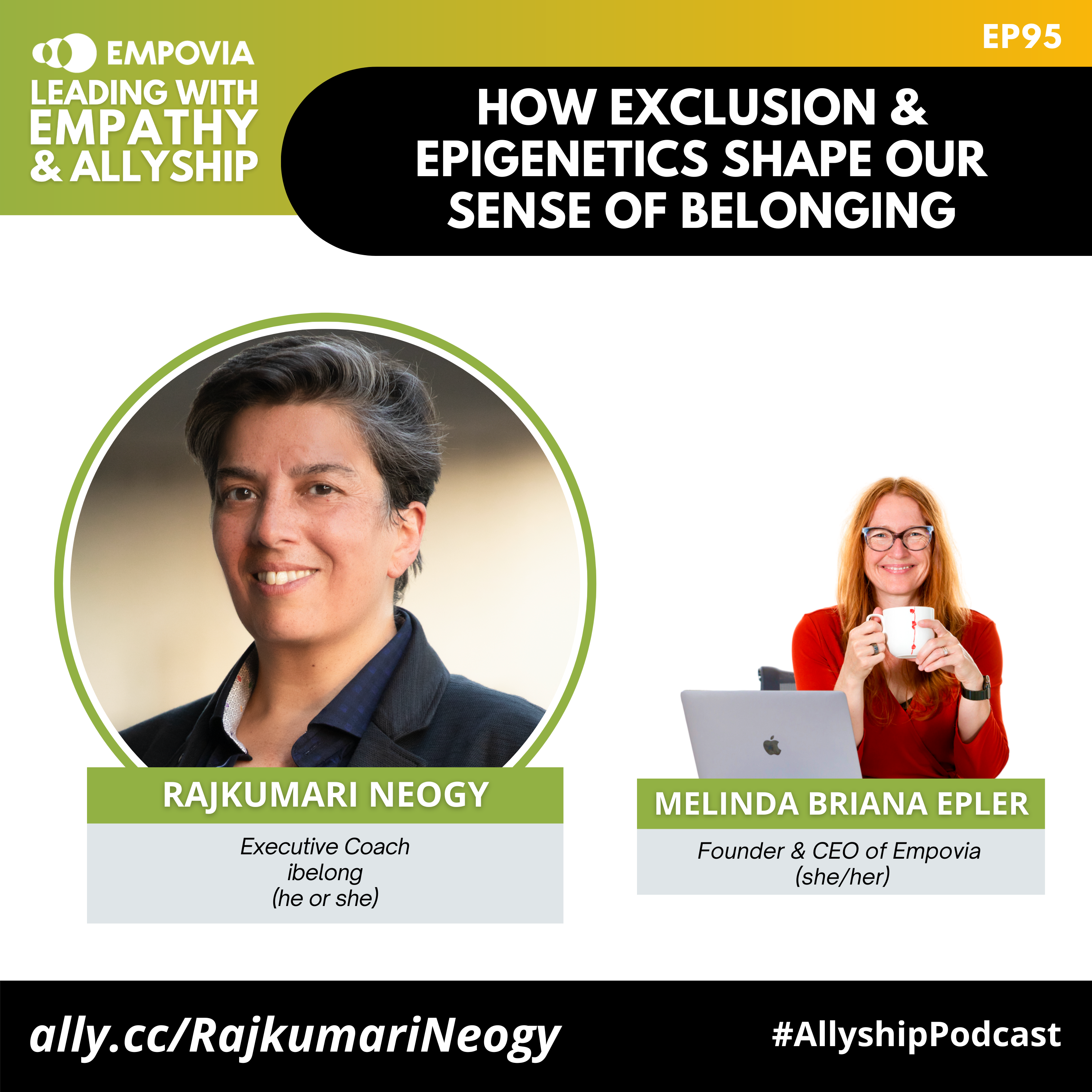
In Episode 95, Rajkumari Neogy, Executive Coach at iBelong, joins Melinda in an in-depth discussion about how exclusion and epigenetics, the study of how behavior and environment can affect the way our genes are expressed and inherited, can impact our sense of belonging. They explore meaningful practices of empathy and representation to address transgenerational trauma and recover the affected parts of our brains from discrimination, racism, and other stressors that destroy our psychological safety. Rajkumari also suggests how managers and employees can work better together to create pathways for healing and cultures of belonging in the workplace.
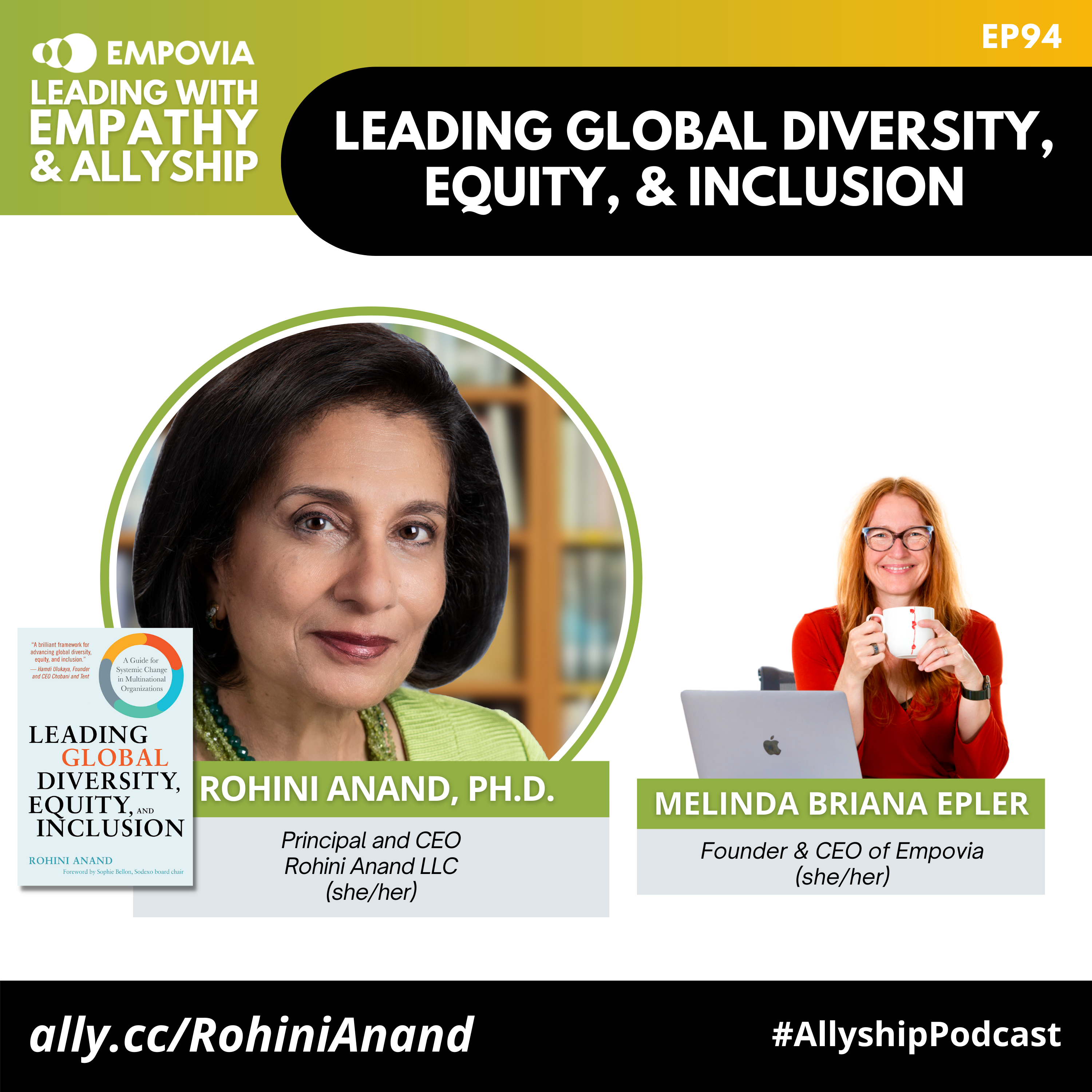
In Episode 94, Melinda speaks with Dr. Rohini Anand, Principal & CEO of Rohini Anand LLC and author of Leading Global Diversity, Equity, and Inclusion: A Guide for Systemic Change in Multinational Organizations. Dr. Rohini describes her work to advance DEI across different countries and cultures. She addresses some common missteps that global leaders make when localizing their work and how we can disrupt our own biases and worldview to foster inclusion and cultural competence in the global workplace. She also shares how we can be better allies across global teams by understanding local contexts and bringing outside perspectives to challenge harmful and oppressive practices.
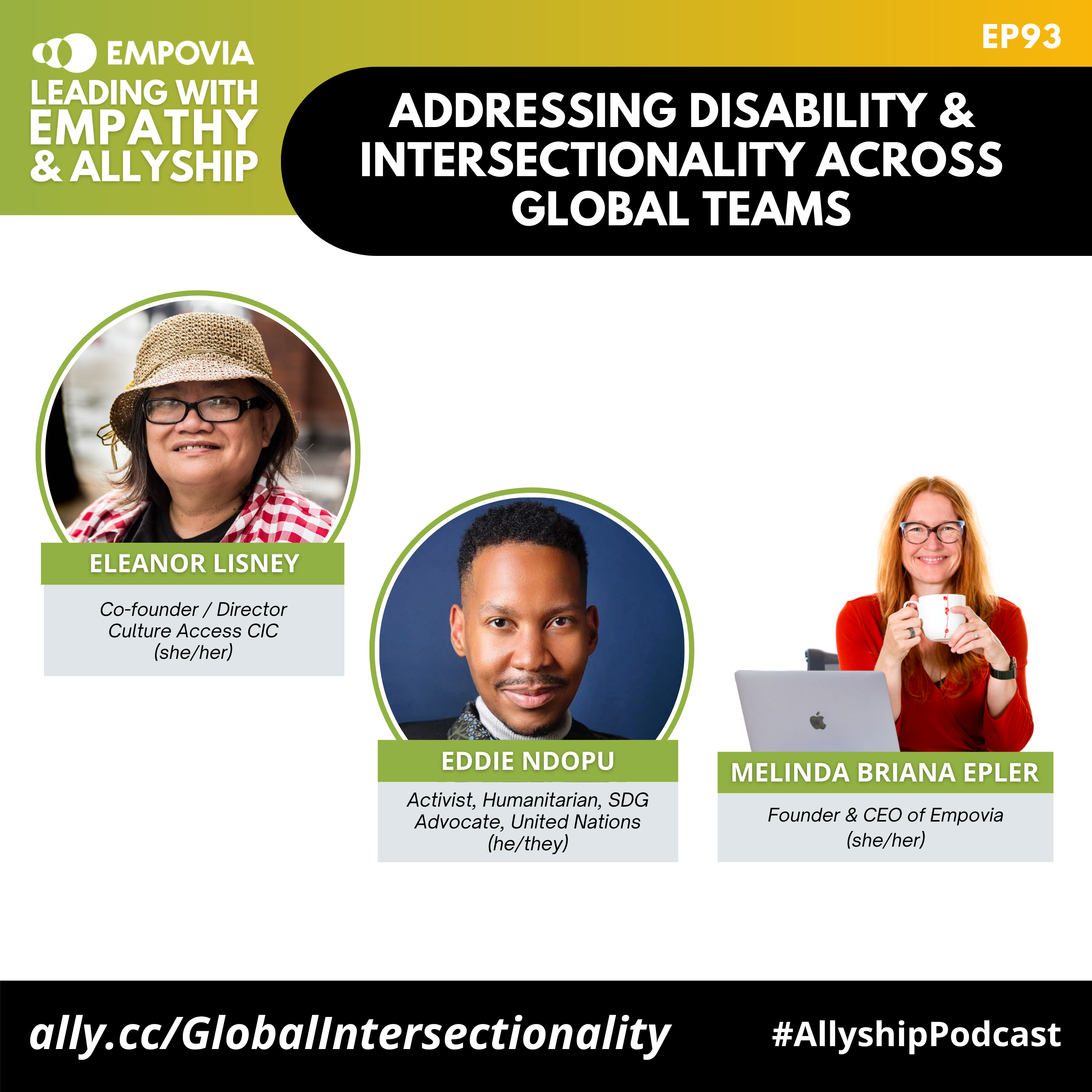
In Episode 93, Melinda is joined by visionary activists for disability and social justice, Eleanor Lisney and Eddie Ndopu. Throughout the live recording, they discuss the importance of having leaders who cultivate empathy and inclusion for global teams to work better together across different cultures, genders, disabilities, and intersectionalities. They share how we can be better allies against systemic ableism to support disability and social justice worldwide. They also explore the first step that organizations can take to align their strategic priorities and objectives with the Sustainable Development Goals and promote sustainable economic growth, inclusivity, and accessibility for everyone in the workplace.
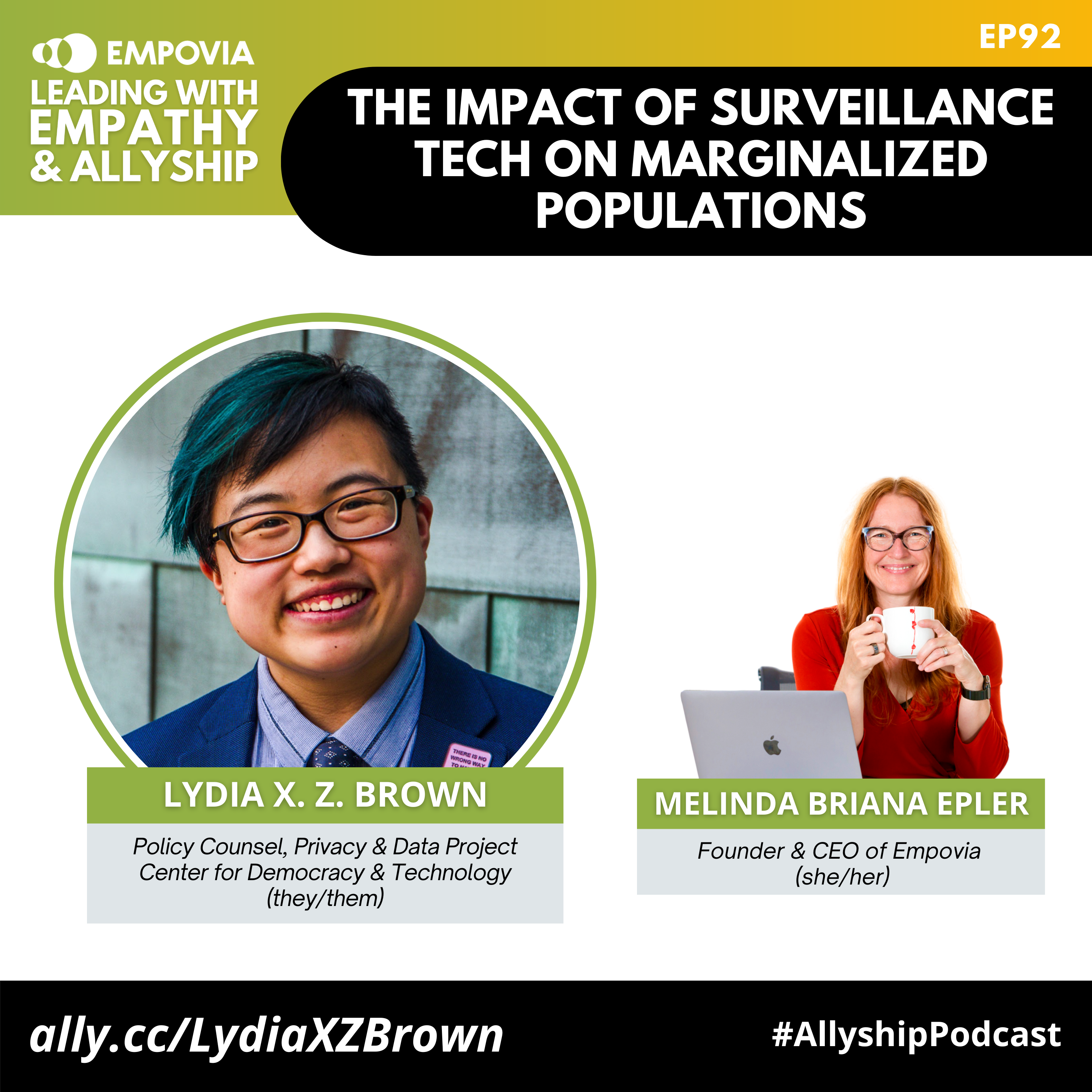
In Episode 92, Lydia X. Z. Brown, Policy Counsel for Privacy & Data at the Center for Democracy & Technology, joins Melinda in an enlightening discussion around the impact of surveillance tech on marginalized populations. They address the importance of understanding the threats of surveillance in our daily lives brought on by algorithmic technologies used in education, policing, healthcare, and the workplace, and they discuss how this tech can be disproportionately damaging to people of color and people with disabilities. Lydia also shares what actions are needed to protect health data following the overturning of Roe v. Wade and how individuals and organizations should approach data privacy to protect everyone’s rights and advocate for marginalized communities who are harmed by surveillance technologies.
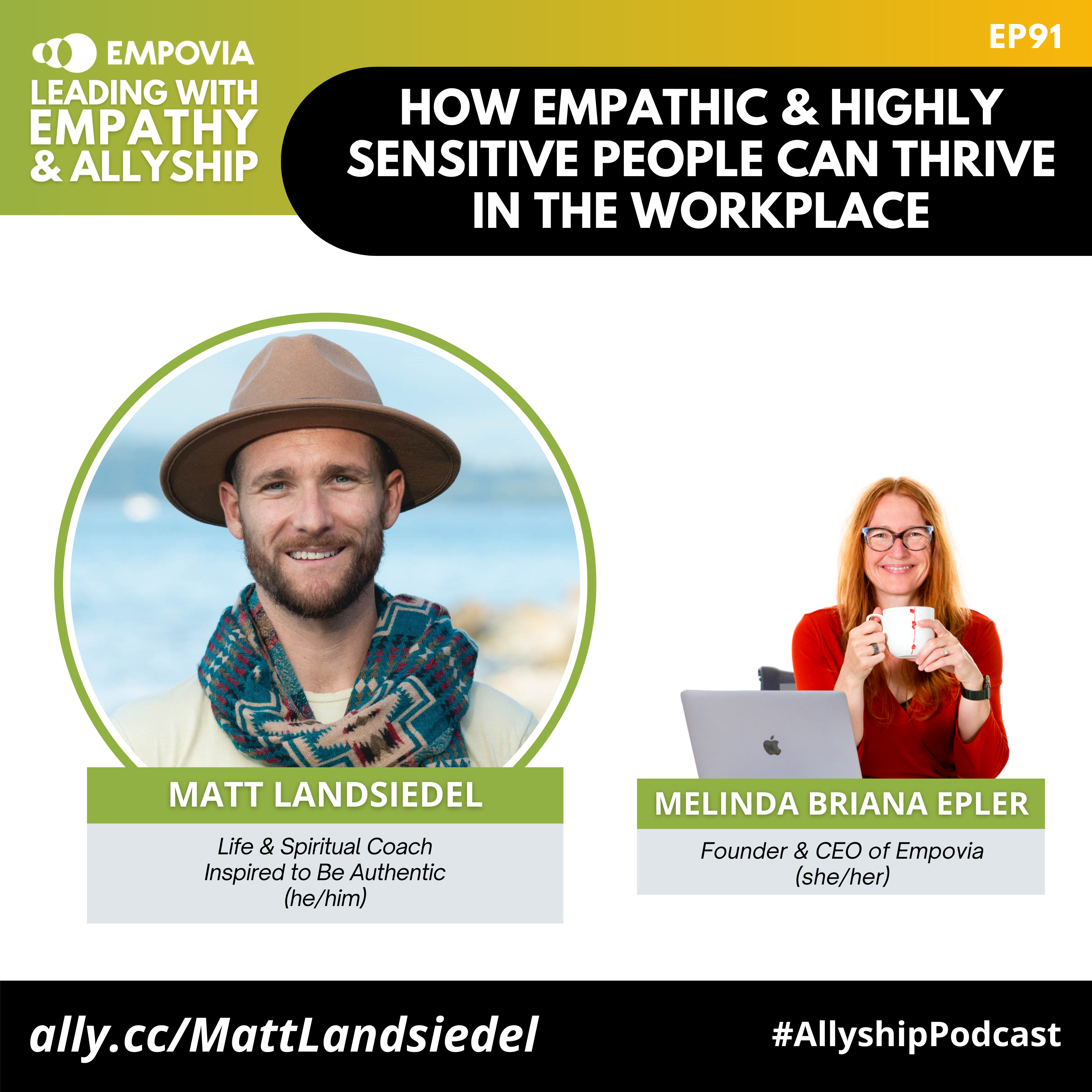
In Episode 91, Melinda speaks with Matt Landsiedel, Life & Spiritual Coach at Inspired to Be Authentic, about how empathic and highly sensitive people (HSPs) can thrive in the workplace and become some of our strongest leaders. They explore what being “highly sensitive” means, how we can identify individuals with this personality trait, and where there are overlapping characteristics between HSPs and empaths. They also discuss ways for HSPs to support themselves through healing past trauma to become their most authentic selves, and they provide simple approaches for managers to support a highly sensitive team member’s valuable contributions and emotional well-being.
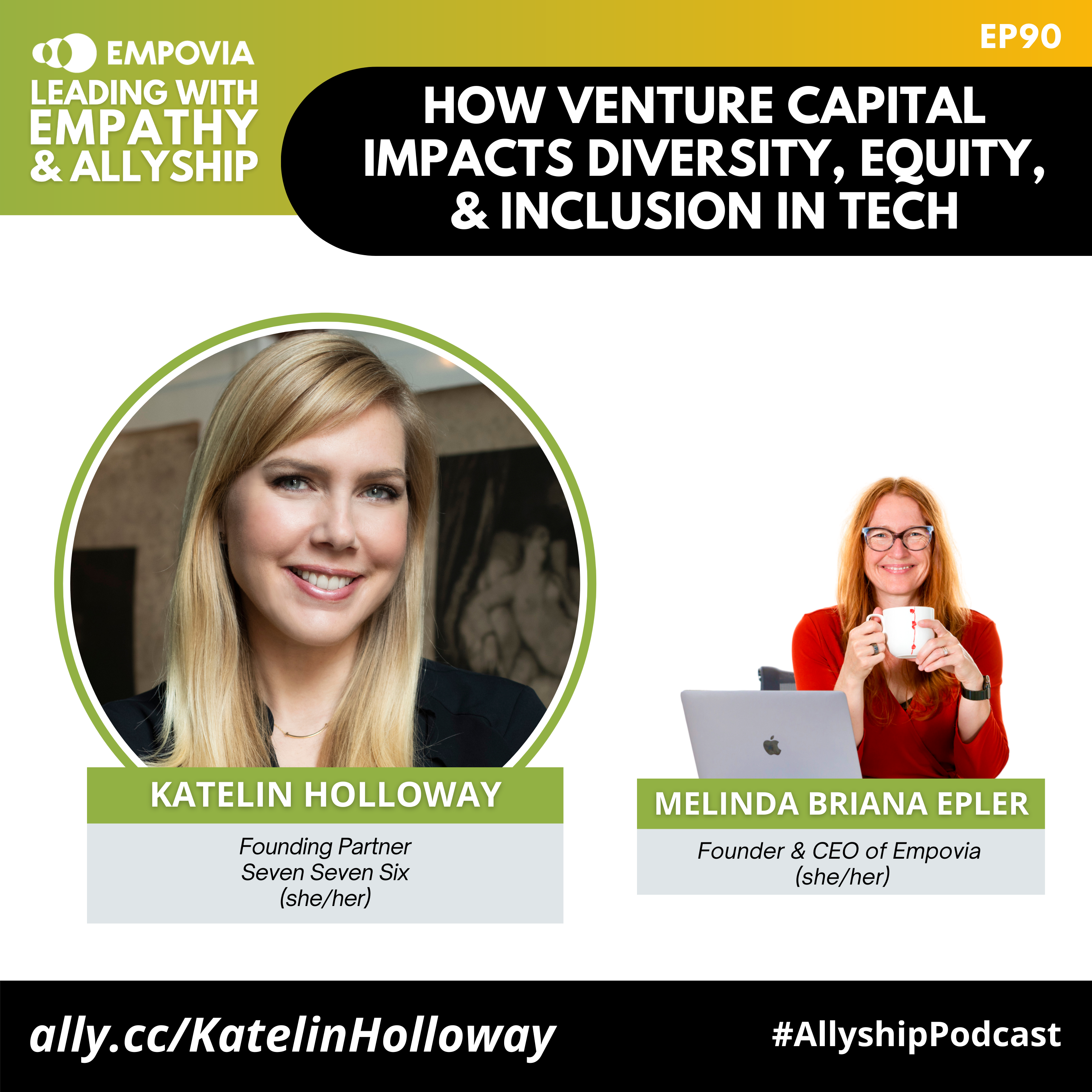
In Episode 90, Katelin Holloway, Founding Partner at Seven Seven Six, joins Melinda in an extensive conversation over the role of venture capital in advancing diversity, equity, inclusion, and belonging across the tech industry. They explore how the venture ecosystem can evolve to empower a talented and diverse workforce, create new opportunities and access to wealth for underrepresented founders, increase representation at senior levels within VC firms, and invest in companies that positively shape the future of work. Katelin also shares about their firm’s commitment to diversity and inclusion across all investor roles to address the wealth gap in VC and how investors can build accountability for inclusion and sustainability in Web3.
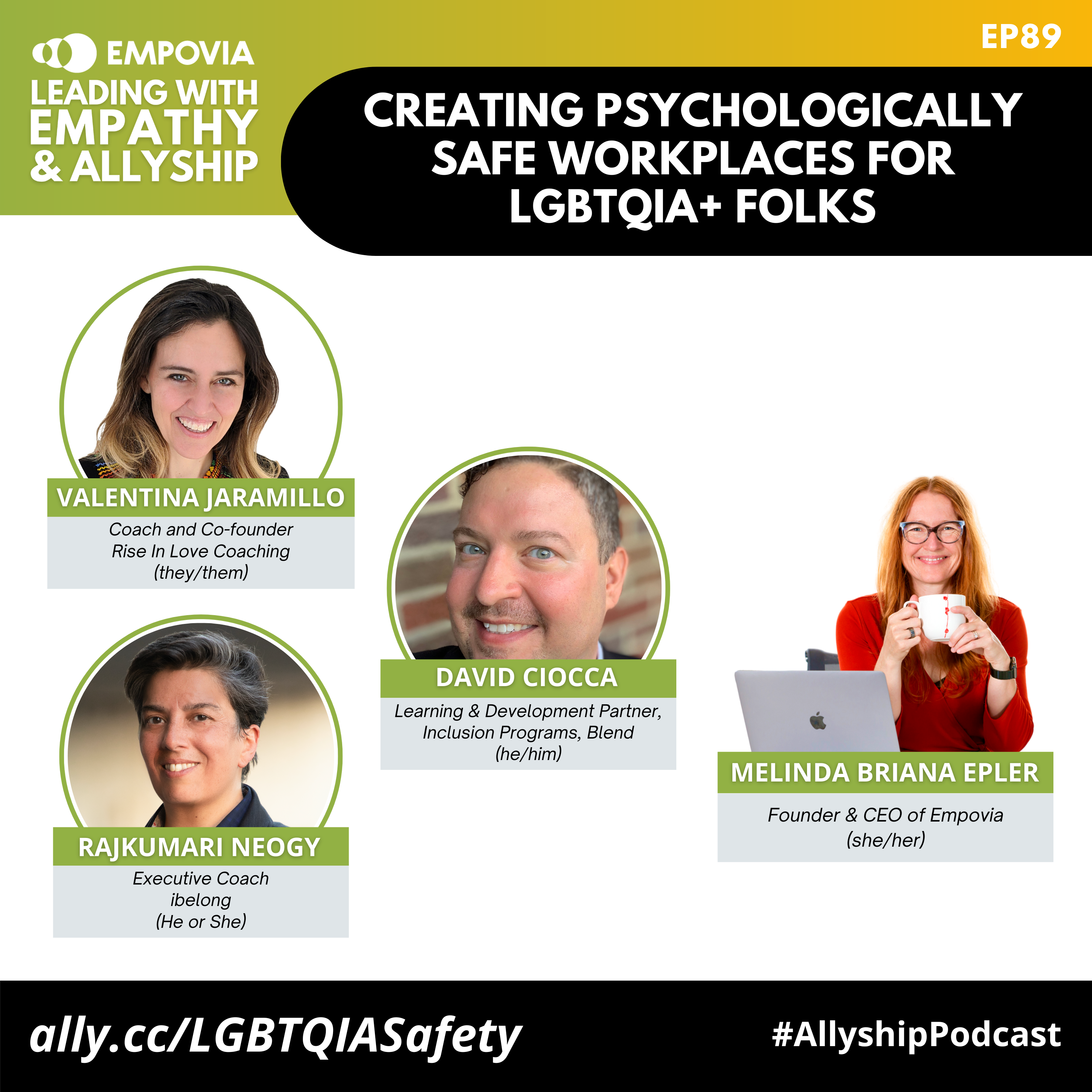
In Episode 89, Melinda is joined by an incredible panel of executive coaches and DEI practitioners: Rajkumari Neogy, Valentina Jaramillo, and David Ciocca. Throughout the live recording, they discuss how allies and ERG leaders can be the key drivers for creating psychologically safe workplaces for the LGBTQIA+ community. They explore the science and epigenetics behind psychological safety and how it leads to healing our transgenerational trauma. They also share how allies can demonstrate concern and support for LGBTQIA+ folks in remote and hybrid workplaces and ways to cultivate psychological safety through an intersectional lens.
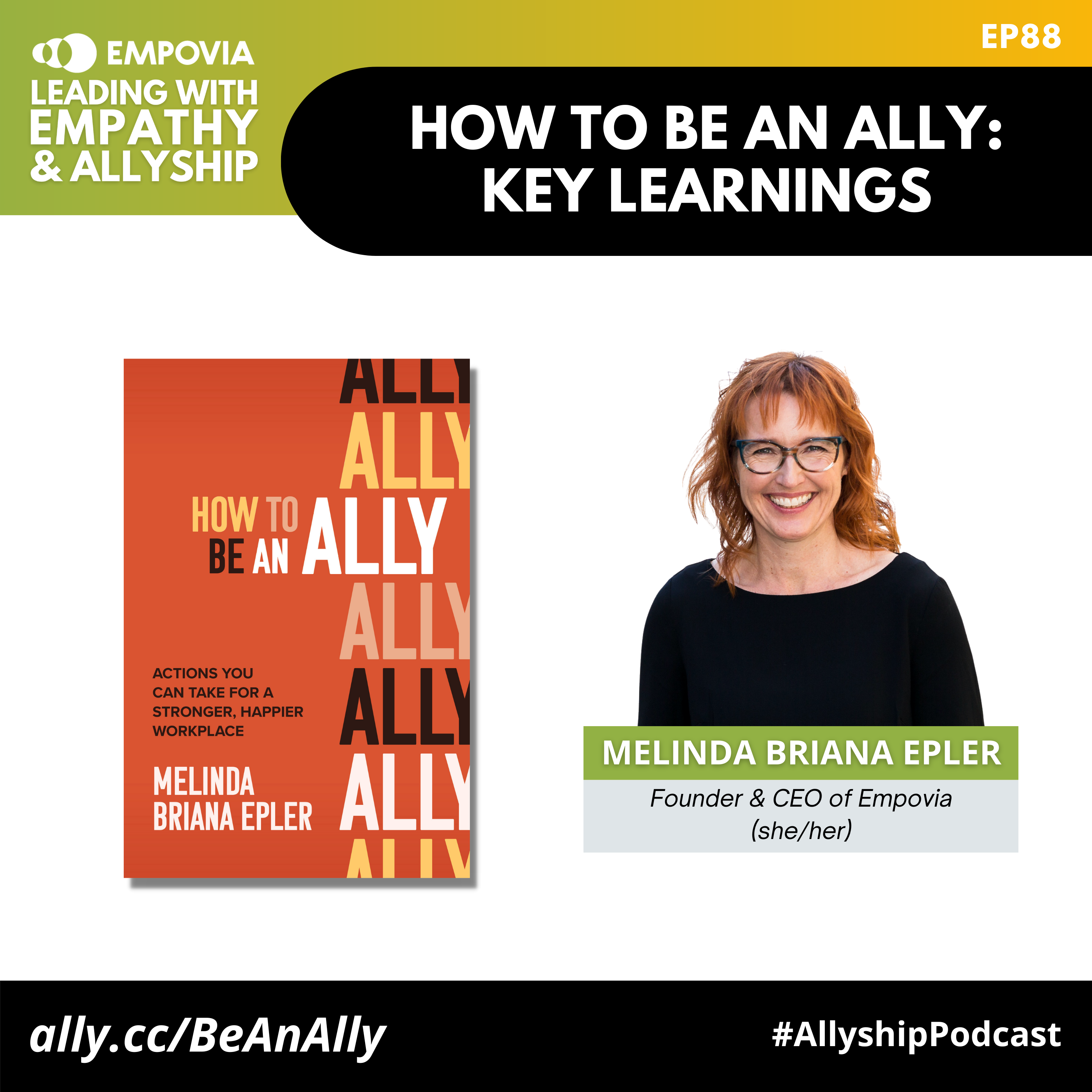
In Episode 88, Melinda Briana Epler, Founder & CEO of Change Catalyst, shares key learnings in a book reading from a few chapters of her book, How to Be an Ally (McGraw-Hill). Drawing inspiration from her own story of experiencing biases and microaggressions in the workplace, Melinda explains how allyship can create positive change in workplaces and communities. She also presents a comprehensive list of tangible actions we can take to support people who experience microaggressions, systemic inequities, and other barriers to opportunity— specifically by learning to recognize and overcome verbal and nonverbal microaggressions and by counteracting the effects through microaffirmations.
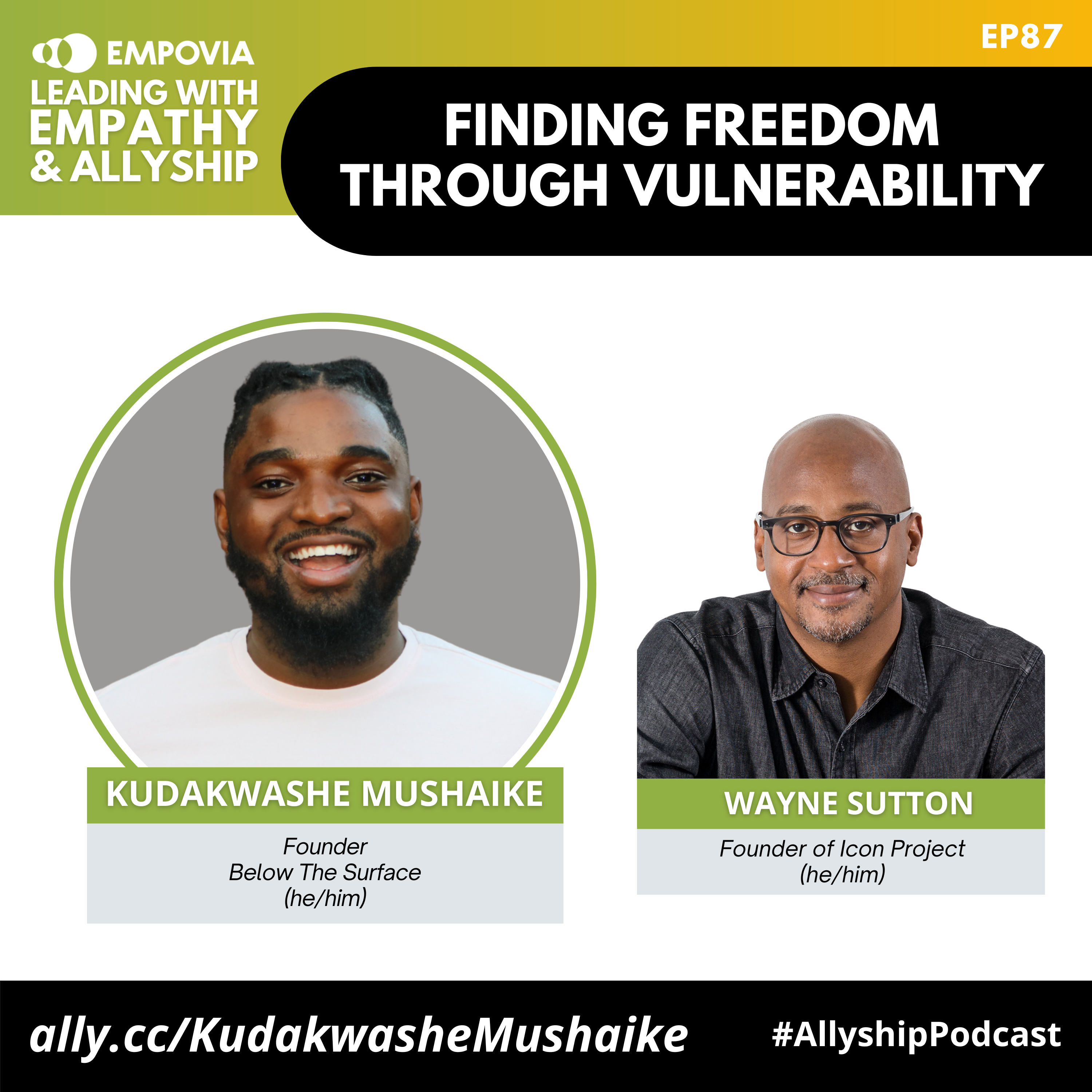
In Episode 87, Kudakwashe Mushaike, Founder of Below The Surface, shares a brief and powerful talk from Change Catalyst’s third Icon Summit hosted by Icon Project Founder and Change Catalyst Co-Founder, Wayne Sutton. In “Finding Freedom Through Vulnerability,” Kudakwashe tells us how authenticity, freedom, and love play a pivotal role in the journey of understanding vulnerability and how leaning into vulnerability can allow us to experience the world around us more fully. Vulnerability is important as we work to be good allies—and as we ask each other for allyship. We’re excited to share this special session with you.
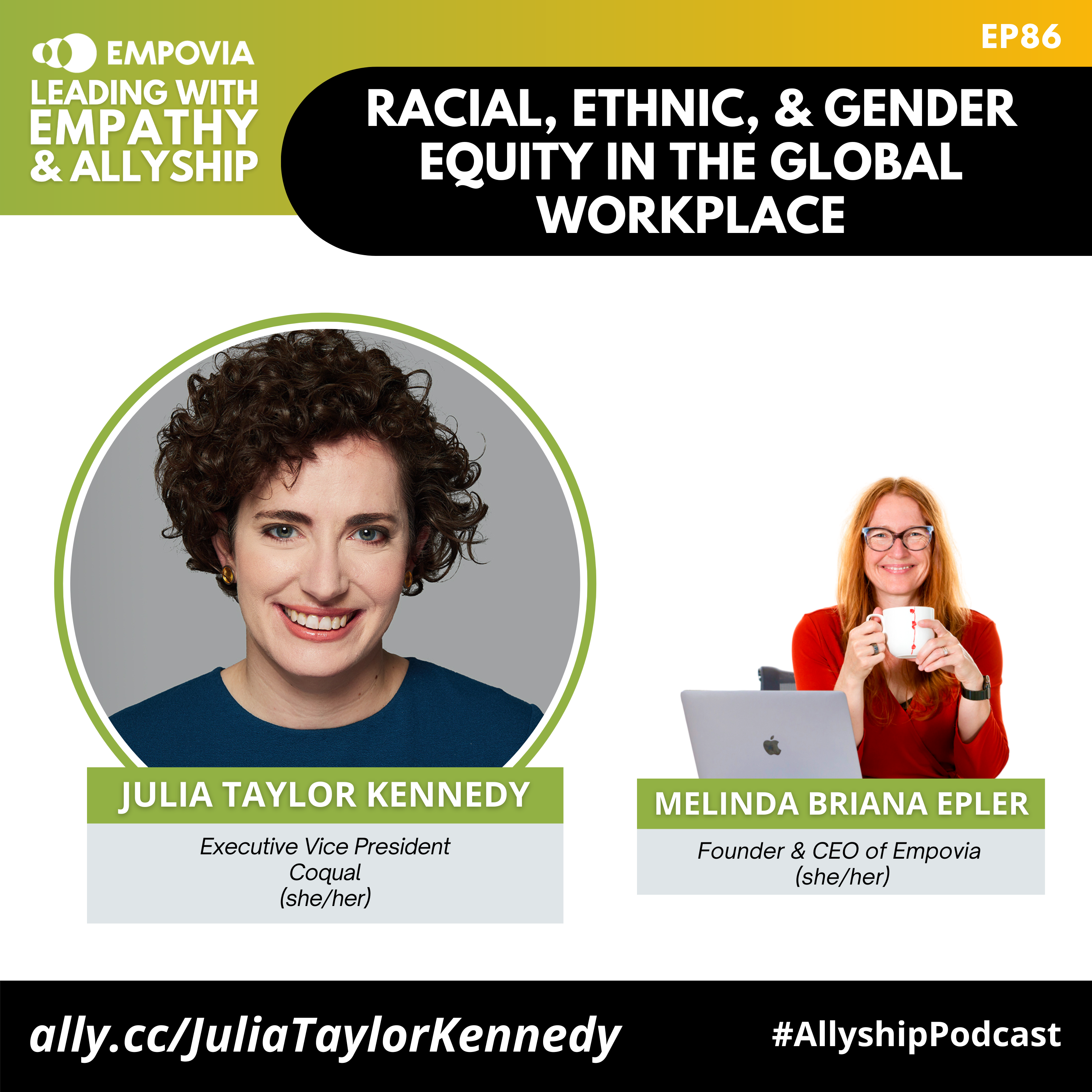
In Episode 86, Julia Taylor Kennedy, Executive Vice President at Coqual, joins Melinda to discuss key insights from Coqual’s Equity Series that feature insights on racial, ethnic, and gender equity in the global workforce. Julia takes us through her findings on specific differences around workplace equity across various countries. She shares how professionals from underrepresented groups experience inequity in performance evaluations, promotions, and compensation. She also offers a strategic approach for employers, managers, and DEI practitioners to measure and improve equity in global workplaces by identifying marginalized groups, addressing systemic issues, and understanding where there might be gaps in inclusion initiatives.
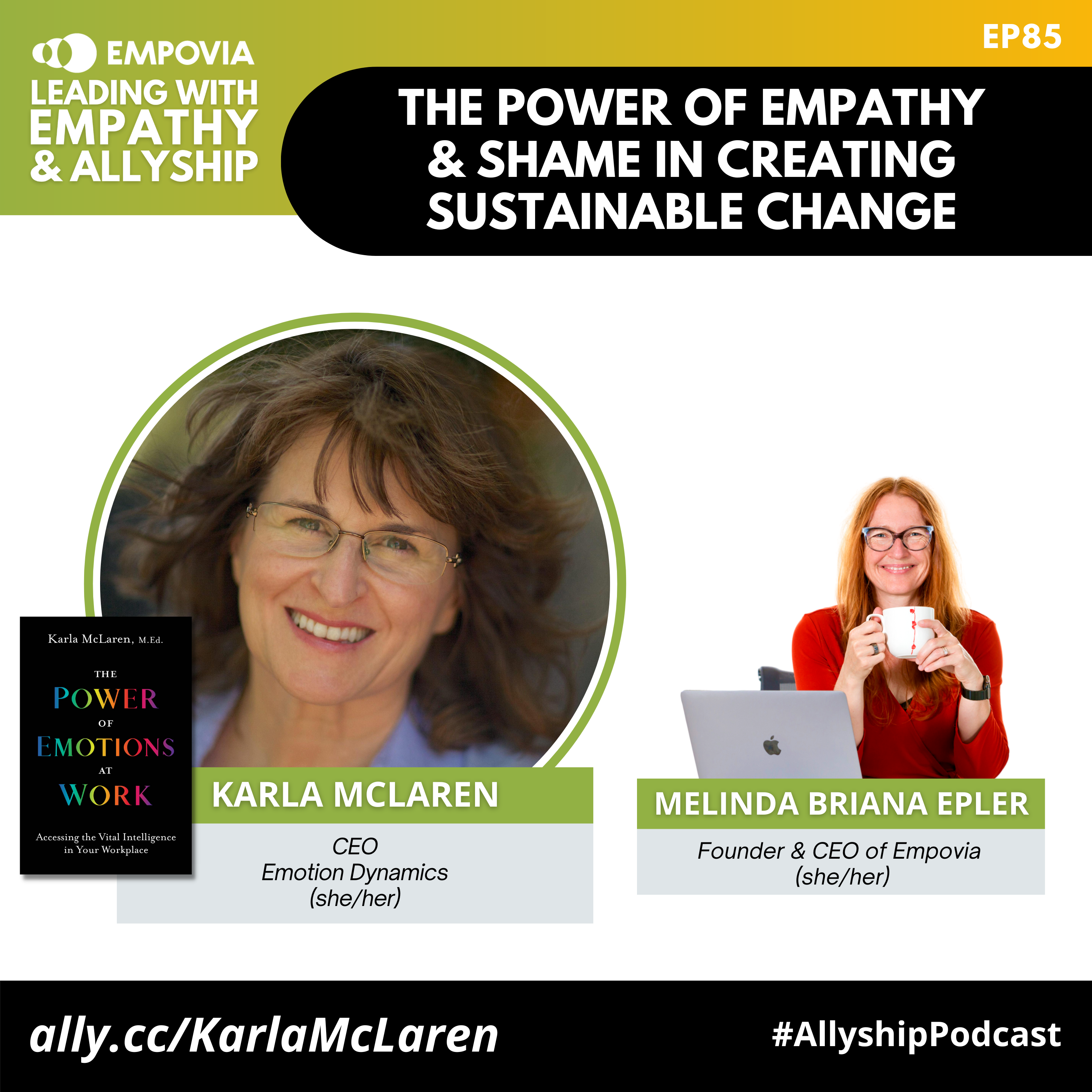
In Episode 85, Karla McLaren, CEO of Emotion Dynamics, dives into a conversation with Melinda about how we can approach empathy and shame as a way to create sustainable change in communities and workplaces. They talk about ways to support ourselves through compassion fatigue, which often comes from doing tremendous amounts of emotional labor, emotion work, and empathy work. Karla also shares what organizations can do to protect the well-being of workers engaged in empathy work, such as setting up ‘repair stations’ and developing emotionally well-regulated social structures in the workplace.
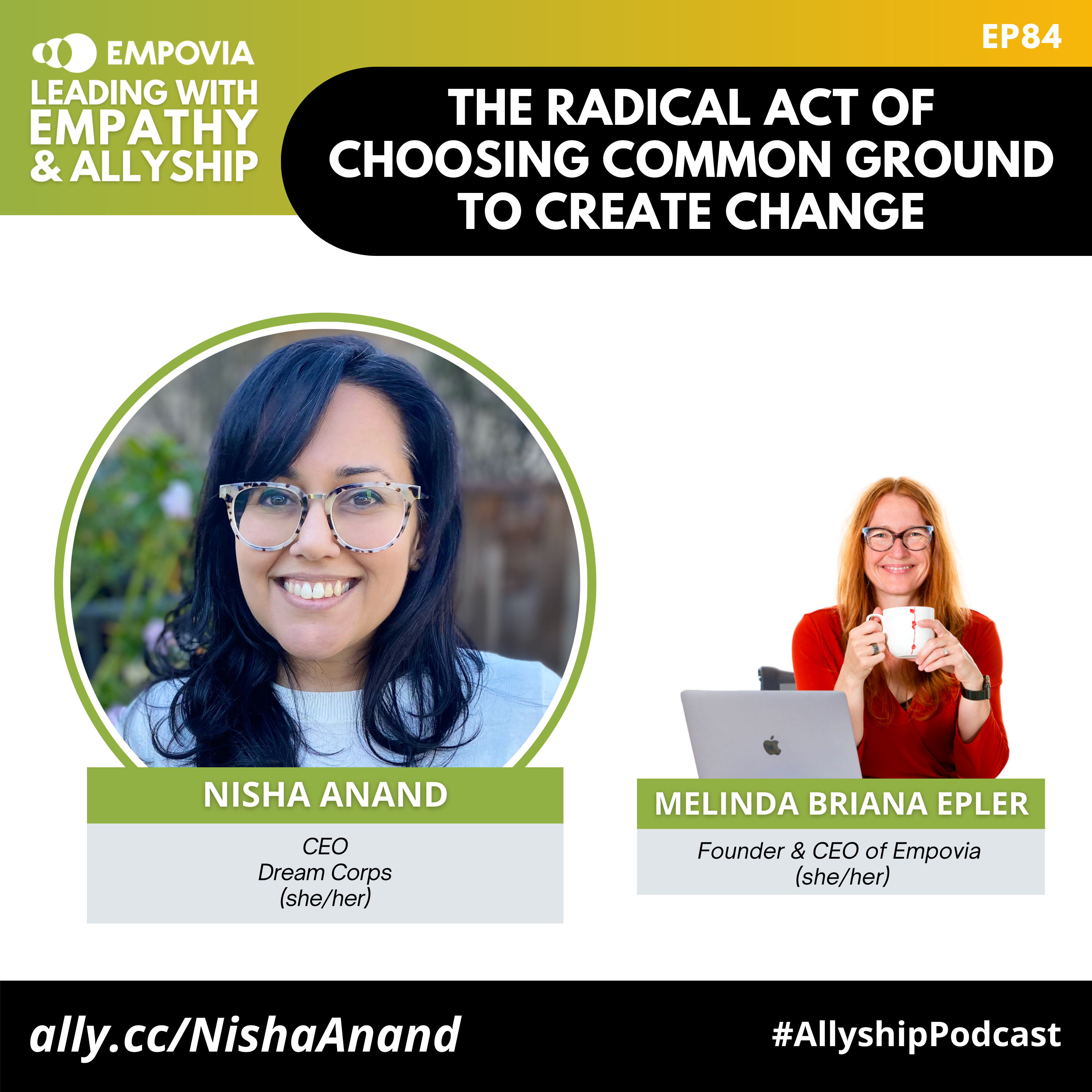
In Episode 84, Nisha Anand, CEO of Dream Corps, joins Melinda in a reflective conversation about how we can make unlikely allies and find common ground to create large-scale change in our organizations, culture, and legislation. They share their take on the Supreme Court’s draft opinion that would overturn Roe v. Wade, its impact on abortion rights across different communities, and the power every individual can have in pushing for an inclusive piece of legislation. Nisha also provides practical steps for creating common ground in communities and workplaces by learning how to have hard conversations, listening to understand, and finding commonalities that can help drive change forward.
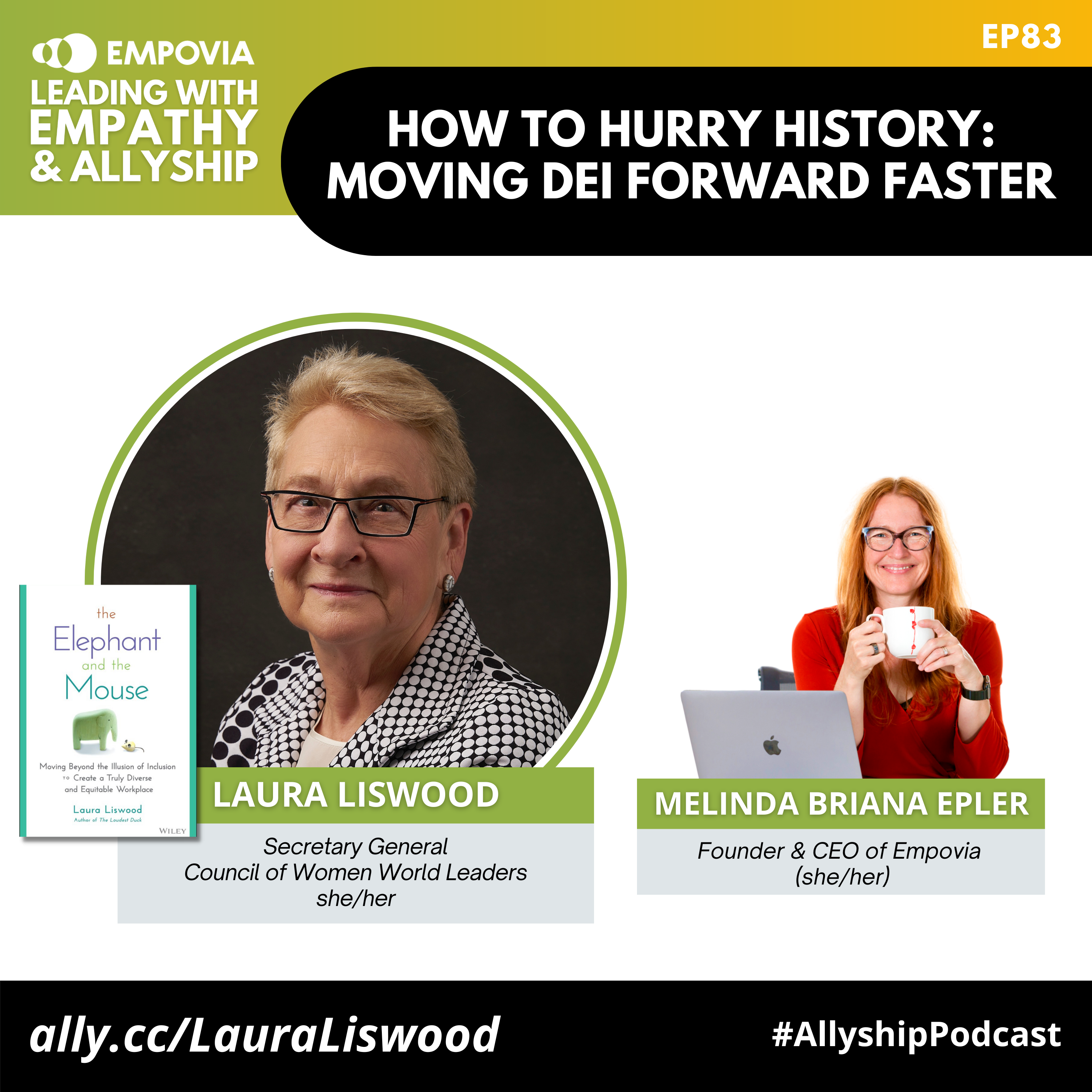
In Episode 83, Laura Liswood, Secretary General of the Council of Women World Leaders, joins Melinda in a thoughtful discussion about how we can improve workplace diversity faster. They discuss tactics that help leaders address the roadblocks brought by the ‘Elephant-Mouse’ dynamic between dominant and non-dominant groups in organizations. Laura also addresses some of the key topics from her latest book, The Elephant and the Mouse: Moving Beyond the Illusion of Inclusion to Create a Truly Diverse and Equitable Workplace, such as the meritocracy myth, code-switching, the risks posed by a homogeneous workforce, and the rewards of allyship. Bonus: Laura shares her research findings on what it would take for the US to have a woman President.

| 50 min
In Episode 108, Dax-Devlon Ross, Founder / Principal of Dax-Dev and Third Settlements, joins Melinda in a reflective conversation about the changing landscape of DEI work over the years. They look into systemic shifts in communities and organizations, including the pushback to diversity, equity, and inclusion efforts. They explore what Dax-Devlon calls the BIPOC savior syndrome, an issue that incoming BIPOC leaders often face. Dax-Devlon also shares his experience navigating the DEI space as a Black cis man and how we can reflect and set goals to support DEI initiatives moving into 2023 and beyond.

| 38 min
In Episode 107, Melinda Briana Epler, Founder & CEO of Empovia, shares a short talk based on her Out & Equal Workplace Summit session with our friends at Qualcomm on “Interrupting Microaggressions: Workplace Interventions for Calling People In.” In this workshop, Melinda shares how we can call each other in to interrupt microaggressions experienced by LGBTQIA+ folks in the workplace. She guides us through microintervention processes and scripts we can use to address common verbal, nonverbal, and environmental microaggressions. She also shares how managers and team members can take action to create a call-in culture together.

In Episode 106, Lisa Gelobter, CEO of tEQuitable, joins Melinda in a discussion on ways to address interpersonal conflict in the workplace. They discuss the true costs and consequences of interpersonal conflicts for an organization. Lisa shares an open-ended question framework tEQuitable uses in their process that can help us all create constructive conversations at work and shift team cultures. They also look into the Key Performance Indicators (KPIs) for managing workplace conflict to improve business outcomes.

In Episode 105, Lily Zheng, Consultant at Zheng Consulting, joins Melinda in a discussion on how we can use our power to create real systemic change around diversity, equity, and inclusion. They explore different types of power and practical ways we can build movements that address inequities in the workplace. They also discuss the importance of trust in creating change and how managers can earn their team members’ trust by understanding and utilizing the currency of trust when making decisions.

In Episode 104, Rahimeh Ramezany, DEI Practitioner & Founder of Rahimeh Ramezany Consulting, joins Melinda in a discussion on how to be better allies for Muslim colleagues. They dive into the importance of addressing intersectionality in the workplace when building religious inclusion and how managers can use an intersectional approach to establish policies & procedures for religious accommodations and inclusion. They also explore meaningful ways to support Muslim colleagues, such as learning to navigate religious differences during the winter holidays and promoting policies to address the impact of religious discrimination.

In Episode 103 (recorded live), Melinda Briana Epler, Founder & CEO of Change Catalyst, joins Paula Quintana, Senior Analyst, for High Alpha Innovation’s Satellite Series event on “How to Be an Ally.” In this fireside chat, Melinda shares how we can start our journey as allies to drive a more inclusive and equitable culture in a startup ecosystem. She introduces small steps anyone can take to intervene and counter the impact of microaggressions across teams. She also discusses how startups can set tangible goals and develop strategies to achieve measurable progress for diversity, equity, and inclusion.

In Episode 102, Esther A. Armah, CEO of The Armah Institute of Emotional Justice, joins Melinda in a discussion about how Emotional Justice serves as a roadmap for racial healing. This roadmap focuses on the important emotional work all individuals can do to end systemic inequity and help transform our workplaces. They touch on the systems and racial biases we need to unlearn based on the four pillars of the language of Whiteness. They explore how we can replace them with the love languages of Emotional Justice to relearn inclusive thoughts and behaviors. They also discuss how leaders and DEI practitioners can frame Emotional Justice to navigate personal politics across teams and drive structural change in a corporate setting.

In Episode 101, Rhonda V. Magee, Professor of Law at the University of San Francisco, joins Melinda in a conversation about the practice of mindfulness as a way to build sustainability into allyship and empathy. They look into ways we can deepen our mindfulness to support ourselves through healing intergenerational trauma. They explore how to be better allies by learning to stay open to making mistakes and being corrected when our actions cause harm to others. They also talk about how leaders and managers can help teams develop mindfulness practices to make everyone feel more included.

In Episode 100 (recorded live), Melinda is joined by an incredible panel of disability advocates and experts to discuss how individuals and employee resource groups (ERGs) can drive important conversations and actions that create true disability inclusion in the workplace. Catarina Rivera and John Marble share how managers can build inclusive team environments by embracing accessible design for all and being proactive in providing accommodations at work. They also discuss the importance of supporting self-advocacy, normalizing disability, addressing intersectionality, and centering people with disabilities when working towards belonging.

In Episode 99, Amy Edmondson, Novartis Professor of Leadership and Management at the Harvard Business School, joins Melinda to discuss how leaders can build psychological safety and trust on their teams. They explore the benefits of a psychologically safe workplace, signs that may indicate if a workplace is safe, and how psychological safety enables innovation and positive team performance. They also discuss effective strategies for establishing and maintaining trust on diverse teams and in hybrid workplaces.

In Episode 98, Dr. Victor Pineda, President & Founder of The Victor Pineda Foundation / World ENABLED, joins Melinda in a discussion on his work to create disability inclusion, accessibility, and equity through a comprehensive and integrated approach to policy. They discuss the importance of thought leadership, culture change, and training programs to address the barriers to inclusive innovation in communities and organizations. They also explore top strategies for companies and individuals to build a disability-inclusive workplace.

In Episode 97 (recorded live), Melinda is joined by an incredible panel of experts to discuss actionable steps to creating a culture of belonging for Latina colleagues. Gabriela Chavez-Lopez and Maica Gil share meaningful ways to support Latina colleagues by addressing systemic challenges in the workplace and amplifying the voices of Latinas beyond Latinx/Hispanic Heritage Month. They also dive into the importance of choosing the right vendors through supplier diversity programs and improving the workplace ecosystem to increase Latinx equity & inclusion.

In Episode 96, Melinda starts Season 8 with an extensive discussion with Dr. Nika White, President & CEO of Nika White Consulting, about inclusive leadership as a key to building empathy and understanding in a distributed workforce. They explore how to overcome proximity bias in a hybrid workplace, support team members’ well-being, and provide equitable opportunities for everyone. They also delve into how we can improve our cultural intelligence to encourage effective collaboration within diverse teams and how DEI practitioners and HR managers can approach resistance to DEI efforts across global teams.

Natalia Villalobos | VP of Inclusion at The New York Times
In Episode 119, Natalia Villalobos, VP of Inclusion at The New York Times, joins Melinda in a transformative discussion on ways to empower individuals to be agents of change within organizations. They delve into the importance of active listening and learning about the workplace culture to understand the change model before taking action. They explore creative and practical ways to collaborate as a team on solutions to drive meaningful change together. They also discuss how leaders can give people grace throughout the change process by cultivating a learning-oriented workplace culture and providing support and resources to help everyone navigate the change.
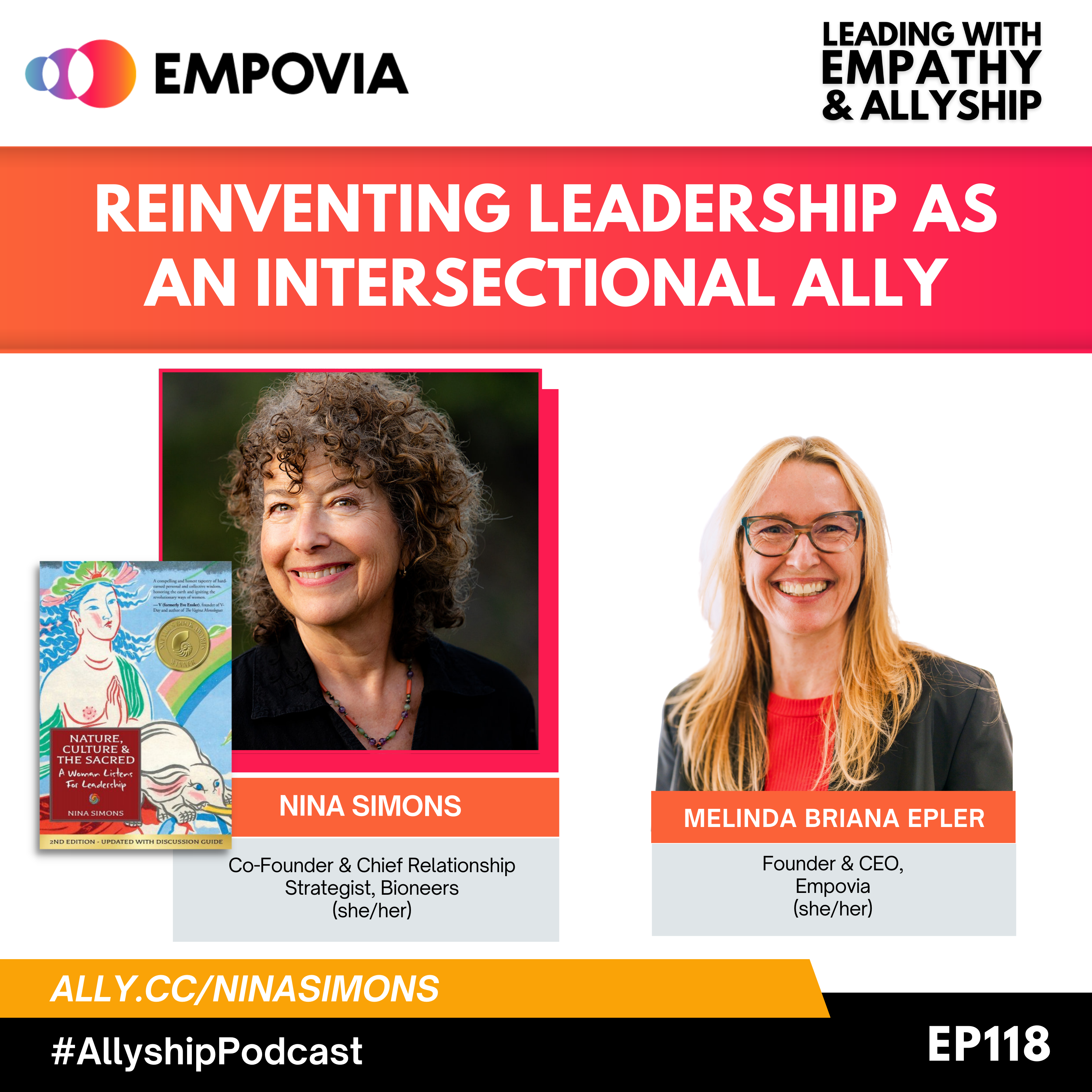
| 46 min
In Episode 118, Nina Simons, Co-Founder & Chief Relationship Strategist at Bioneers, joins Melinda in an honest conversation about ways to reinvent leadership by embracing intersectional allyship. They draw from Nina’s book, Nature, Culture & the Sacred: A Woman Listens for Leadership, and explore how women from diverse backgrounds possess unique talents that can be leveraged in leadership. They discuss how intentional allyship can help individuals cultivate and showcase their greatest strengths. They also delve into how a deeper understanding of the intersectionality between environmental, social, racial, and gender justice can enable us to become better advocates and allies.
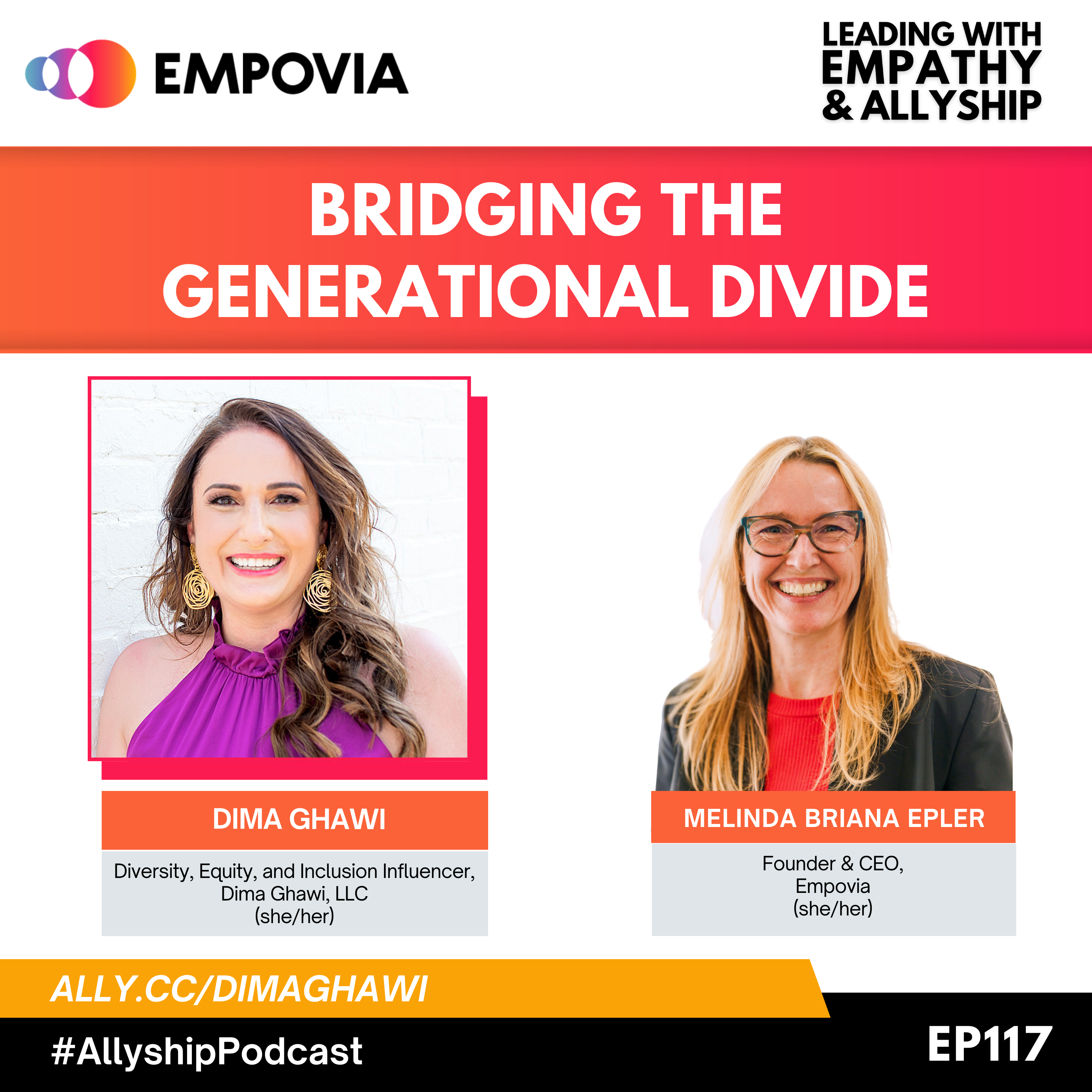
| 44 min
In Episode 117, Dima Ghawi, Diversity, Equity, and Inclusion Influencer at Dima Ghawi, LLC, joins Melinda in an informative discussion on how to bridge the generational divide in the workplace. They explore the four main generations in the American workforce, what motivates employees from different generations, and why organizations should recognize diverse work styles across multigenerational teams. They also discuss how managers can support the incoming younger workforce to build well-rounded teams and create a purpose-driven workplace.
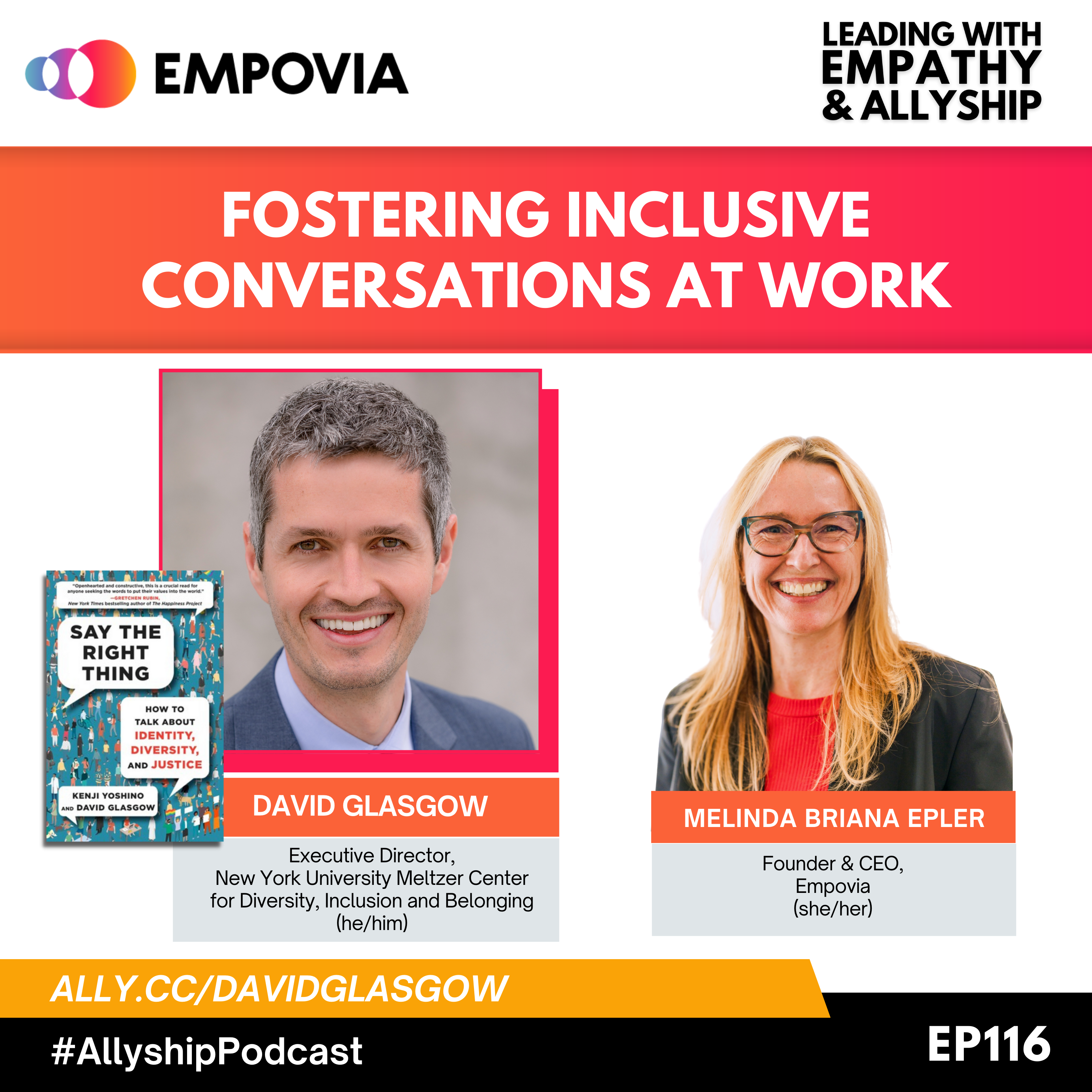
| 38 min
In Episode 116, David Glasgow, Executive Director of the New York University Meltzer Center for Diversity, Inclusion, and Belonging, joins Melinda in an enlightening discussion on how to have inclusive conversations about identity in the workplace. They explore key skills for having identity conversations, such as adopting a growth mindset and acknowledging where we are on the controversy scale when we disagree with others’ perspectives. They also discuss why it’s important to recognize unproductive forms of communication, which David refers to as avoid, deflect, deny, and attack (ADDA). They also touch on how leaders can create an inclusive culture by showing empathy to team members who make mistakes in these conversations.

In Episode 115, Melinda shares talks from previous Empovia (formerly Change Catalyst) events made by Black leaders Daisy Ozim, Dr. Angel Acosta, and Ashantè Fray that tackle the impact of Black history on our present and future. At Tech Inclusion 2019, Daisy discusses the long-term impacts of intergenerational trauma and how it is perpetuated through technology. She dives into 10 things allies can do to help create systemic change. In Angel’s talk on mindfulness and healing in tech at Tech Inclusion Global Summit 2020, he shares the power of mindfulness and healing practices to support ourselves through trauma from the global health crisis and racial divisiveness. At Tech Inclusion Conference 2020, Ashantè talks about the importance of intersectional allyship. She taps into ways allies can support people from intersectionally underrepresented groups, such as learning to acknowledge our privileges in various spaces, recognizing the impact of microaggressions, and understanding where we are in our allyship journey.

| 42 min
In Episode 114, Claudia Miller, Career Coach at Claudia T. Miller, LLC, joins Melinda in an empowering conversation about strategies and guidelines we can all implement to help close the gender wage gap. They explore mindset shifts and techniques that underrepresented identities can use to build confidence and better negotiate what they are worth. They elaborate on the importance of organizations implementing pay transparency policies. They also discuss how HR folks and people leaders can develop a talent pipeline to create a stronger pathway to leadership for women in the workplace and address compensation & equity gaps.

| 48 min
In Episode 113, Gabriela de Queiroz, Principal Cloud Advocate Manager at Microsoft, joins Melinda in an impactful discussion on building global inclusion through community. They dive into the importance of building inclusive communities to address the global gap in access and opportunity. They discuss how people can start to advocate for social change by finding out what issues they’re passionate about and recognizing what they can give back, no matter how small. They also explore key lessons from building inclusive communities that can help global leaders manage their teams more effectively.

| 47 min
In Episode 112, Nick Alm, Founder and Godx of Mossier, joins Melinda in an informative discussion about the key trends that drive LGBTQIA+ workplace equity and inclusion. They look into challenges around policies and procedures for transgender and nonbinary inclusion. They discuss how companies can take action to improve their DEI initiatives through normalizing pronoun use, integrating self-identification into recruitment efforts, incentivizing ERG and DEI leadership, and more. They also touch on ways for managers to rethink how they approach political discussions at work.

| 38 min
In Episode 111, Pabel Martinez, Founder and CEO of Plurawl, joins Melinda in a discussion on redefining professionalism so people can bring their authentic selves to the workplace. They explore how biases around professionalism move individuals to mask their identities and “code-switch”’ to assimilate into another culture. They look into the difference between uncomfortable and unprofessional and how we can mitigate the impact of biases around professionalism. They also discuss how managers can promote authenticity at work by building trust in teams and leading honest conversations.

| 40 min
In Episode 110, Donald Thompson, CEO and Co-Founder of The Diversity Movement, joins Melinda in an enriching conversation about how underestimated leaders can pave a pathway to success. Donald shares his successful journey overcoming adversities as an underestimated leader and how his path can help leaders create access and opportunity for marginalized people in their workplaces. He shares his strategies for implementing inclusive leadership across large organizations and growing companies by maximizing everyone’s unique talents and evaluating team performance. He also provides practical ways for underrepresented entrepreneurs to gain access to funding by knowing how to approach the right VC firms.
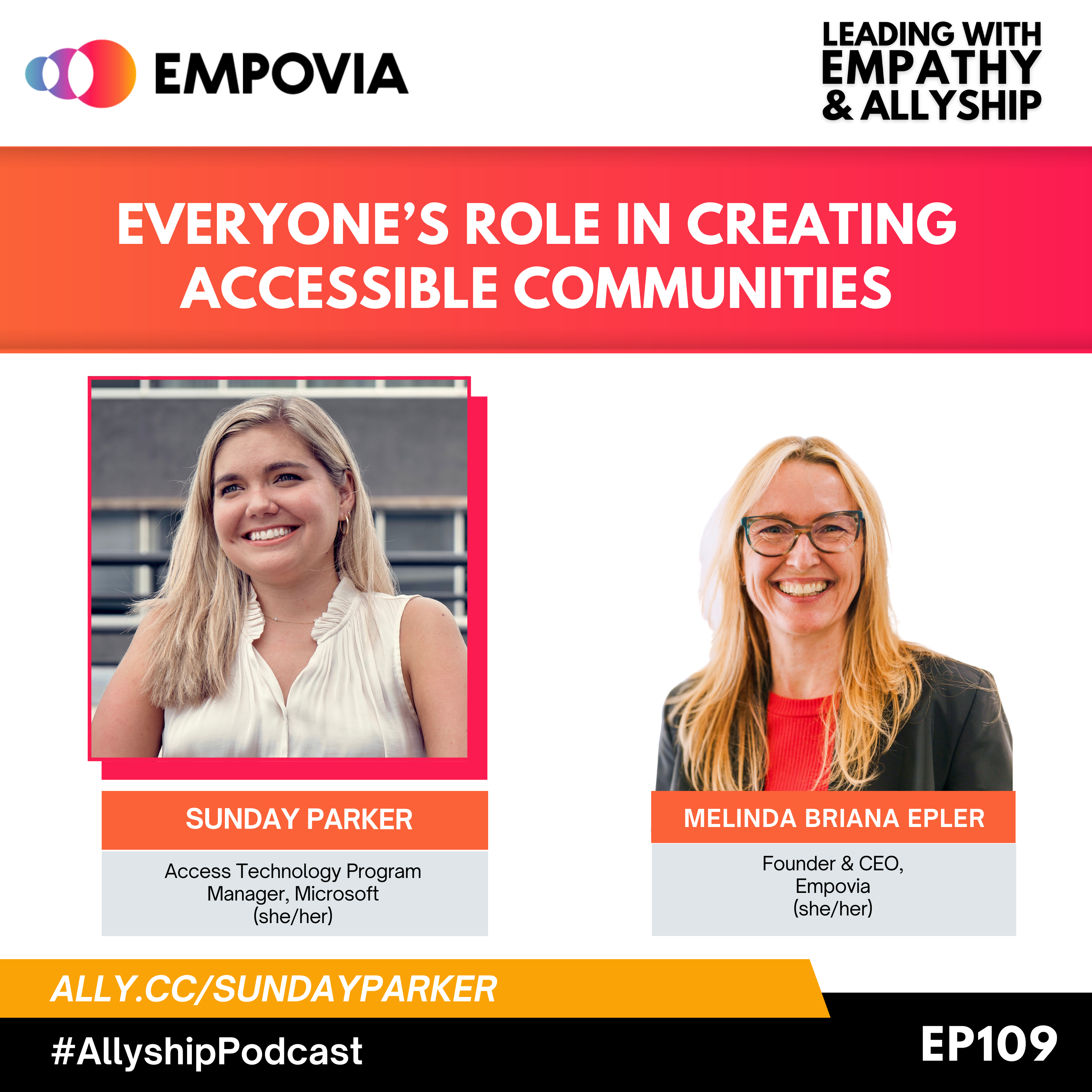
| 39 min
In Episode 109, Sunday Parker, Access Technology Program Manager at Microsoft, joins Melinda in a conversation about everyone’s role in creating accessible and inclusive communities for people with disabilities. Sunday describes what physical and digital accessibility look like and the importance of continuing to incorporate digital accessibility into social media platforms, particularly as they evolve and change. She shares the value of interdependence in communities and how allies can amplify the voices of disability advocates. She also talks about her work in providing non-profits with the resources they need to better support their disability constituents.

| 47 min
How does generative AI impact teams? And what can we do to mitigate the impact of biased AI?
In Episode 132, Kieran Snyder, Co-Founder and CEO at Textio, joins Melinda in an insightful discussion about the impact of AI on workplace biases and inequities. They explore the potential harm and social biases perpetuated by generative AI, and look closely at how this applies to performance reviews. They also discuss key factors business leaders should consider when they adopt AI solutions in their teams, including recognizing these biases, establishing accountability systems that support DEI efforts, and safeguarding confidential employee information.

| 46 min
What is holistic resistance? How can we practice it to break historical narratives and challenge oppression in the workplace?
In Episode 131, Aaron Johnson, Professional Speaker at The CUT, joins Melinda in an honest conversation on the power of touch and the Black brute narrative in the workplace. They explore holistic resistance as a response to the profound impact of the Black brute narrative on African heritage men. They discuss ways this narrative shows up in the workplace, including through a lack of safe space where Black men can be vulnerable, set boundaries, and protect themselves when those boundaries are violated. They also discuss the relationship between White women and Black men and how each of us can advocate for anti-racism in the fight against oppression.

| 56 min
What exactly is political intelligence? And why is it important to have in the workplace?
In Episode 130, Cari Guittard, Chief Strategy Officer & Partner at ChangeX & purposewerx and Leadership Professor at Hult International Business School, joins Melinda in a conversation around the constructive approach to addressing politics within the workplace. Drawing from her multiple experiences in the DEI, ESG, and political fields, Cari delves into practical tools to develop our political intelligence. She discusses why this skill set can be necessary for advancing our careers and positioning ourselves as purpose-driven leaders, the importance of curiosity in political conversations, and how it can enhance our situational awareness to adapt effectively to moments of transition or crisis. She also taps into how organizations can respond to anti-wokeness in a way that opens the door for creativity and creates positive change at work.
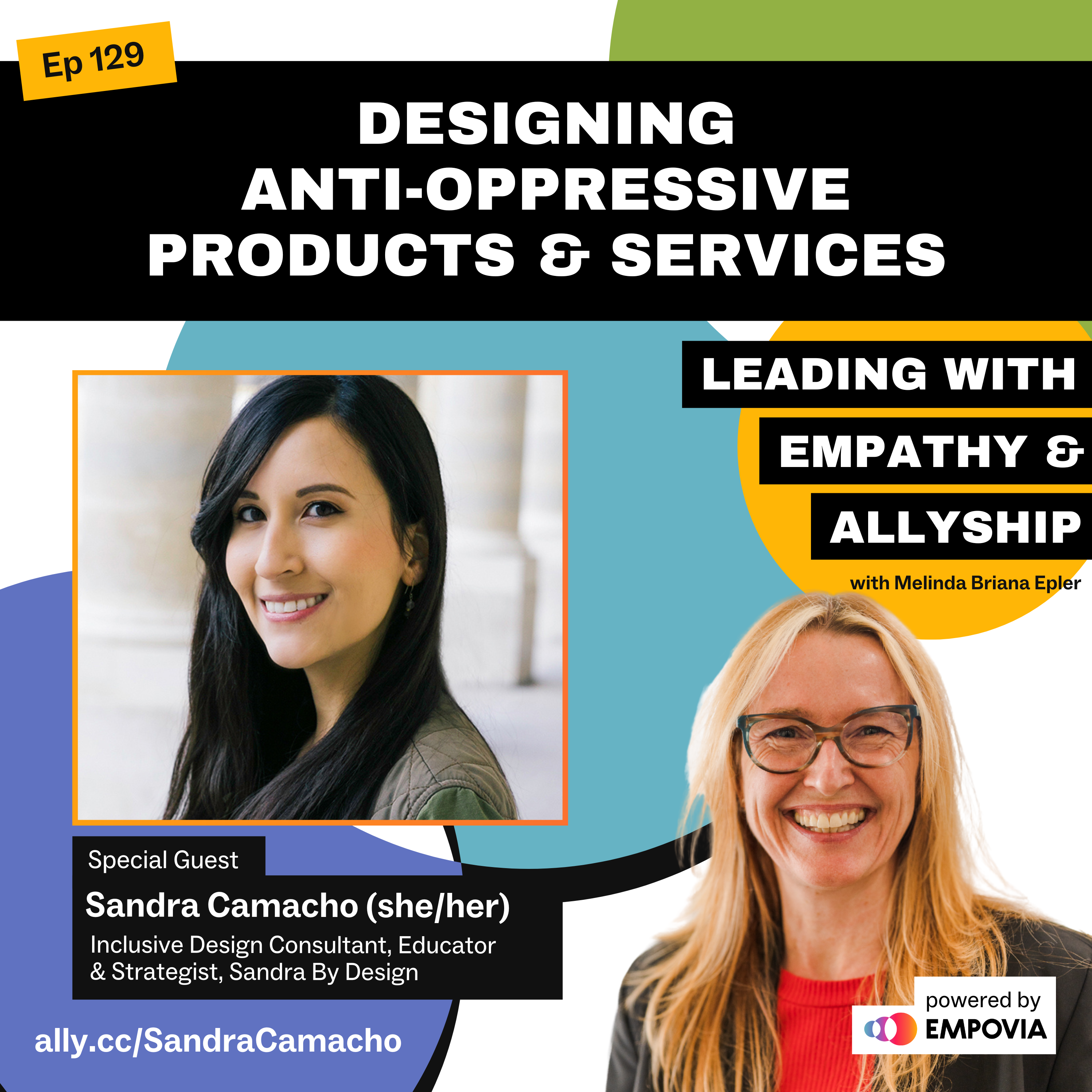
| 46 min
What are the key principles of inclusive design? How can we use those principles to create equitable and anti-oppressive products and services?
In Episode 129, Sandra Camacho, Inclusive Design Consultant, Educator & Strategist at Sandra By Design, joins Melinda in an informative discussion on techniques for designing anti-oppressive products & services. They discuss the importance of centering the needs of marginalized communities and considering intersectional identities throughout the product development and design process. They also dive into ways we can challenge and disrupt oppressive norms and systems to promote solutions that are accessible and beneficial for all individuals.
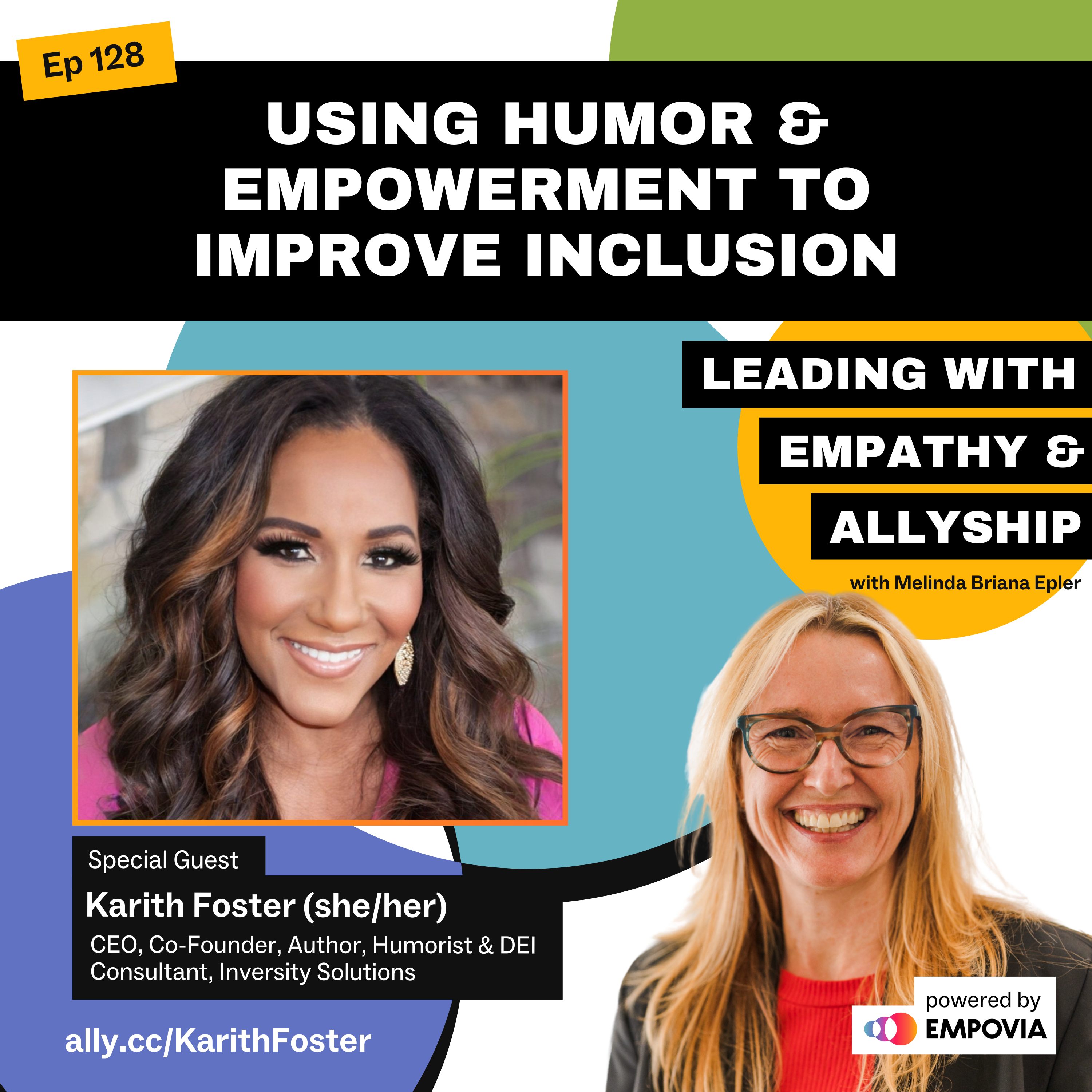
| 38 min
What is conscious empathy? How can humor help engage people in DEI efforts?
In Episode 128, Karith Foster, CEO, Co-Founder, Author, Humorist & DEI Consultant at Inversity Solutions, joins Melinda in a conversation about using humor and empowerment to improve inclusion. They discuss how we can practice conscious empathy to expand our understanding of each other’s experiences and foster noble compassion. They also explore easy steps to transform the toxicity in DEI work into positive energy, such as focusing on commonalities, creating a ‘brave space’ for everyone to embrace authenticity, and engaging in introspection
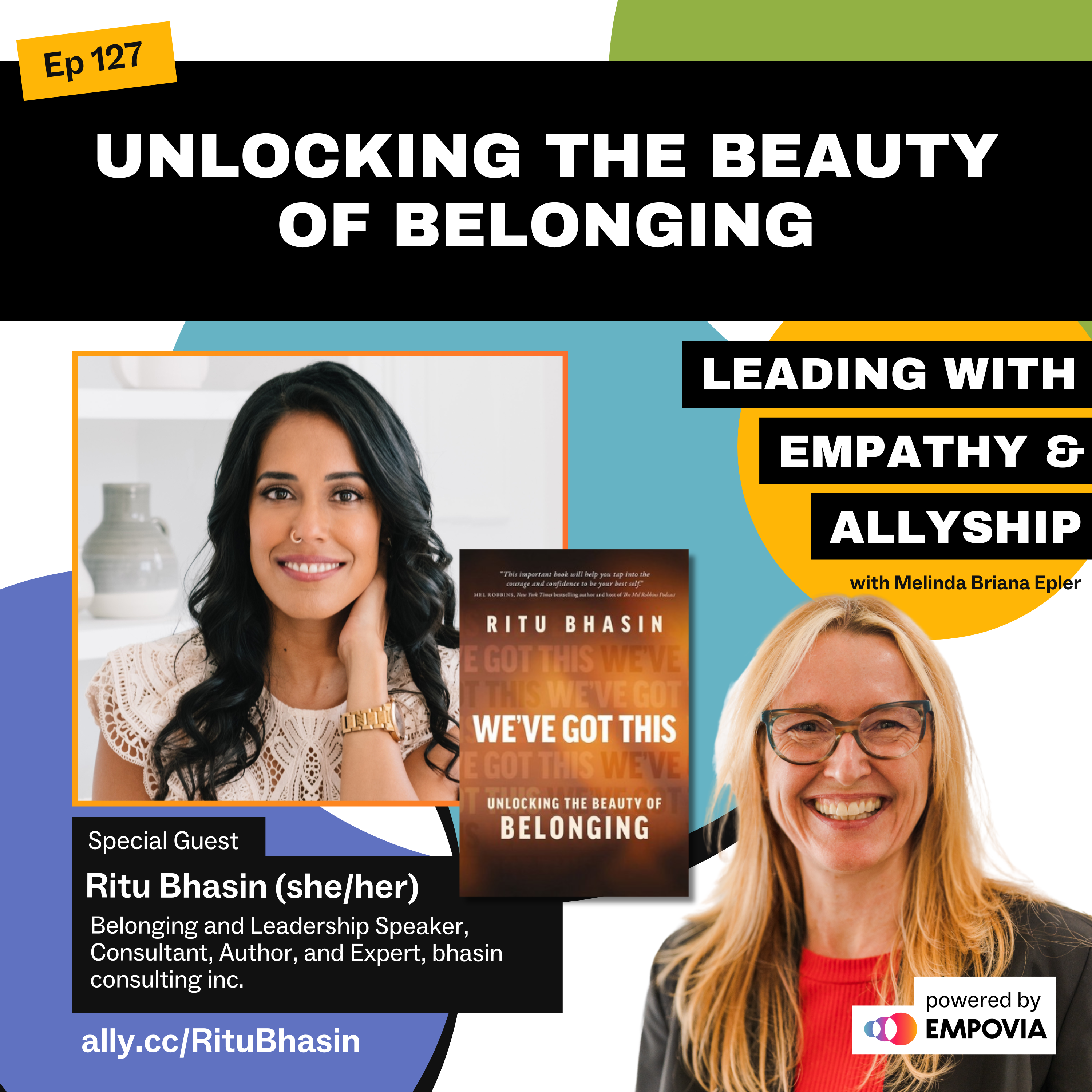
| 49 min
What’s the difference between social power and personal power? And how is our personal power tied to our sense of belonging?
In Episode 127, Ritu Bhasin, Belonging and Leadership Speaker, Consultant, Author, and Expert at bhasin consulting inc., joins Melinda in an insightful conversation on unlocking the beauty of belonging. Drawing from Ritu’s book, We’ve Got This: Unlocking the Beauty of Belonging, they share their stories of navigating the path to belonging and delve into the strong connection between authenticity, personal power, and belonging. They discuss the importance of healing work and how this impacts our ability to be better allies, leaders, and advocates of inclusive spaces. They also explore ways to embrace our sense of belonging by building our core wisdom and stepping into our personal power.
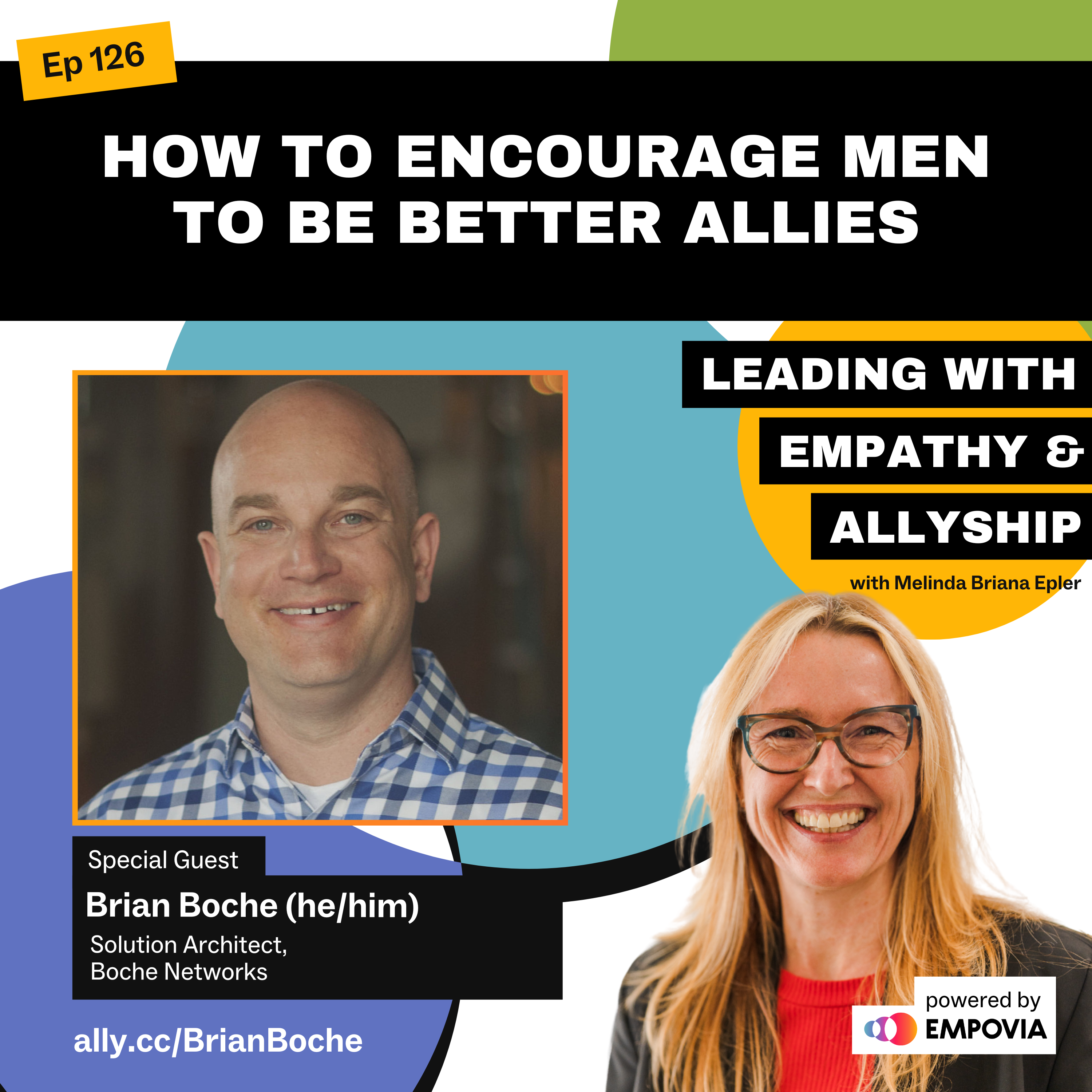
| 44 min
How can male allies help cultivate a supportive workplace environment? And what does it look like to build a male allyship program?
In Episode 126, Brian Boche, Solution Architect at Boche Networks, joins Melinda in an empowering conversation around strategies for encouraging men to become better allies. Brian delves into his allyship journey and shares insights from developing and co-leading multiple allyship programs for individuals from underrepresented backgrounds. He also discusses simple and effective ways to engage men and drive meaningful change in the workplace.
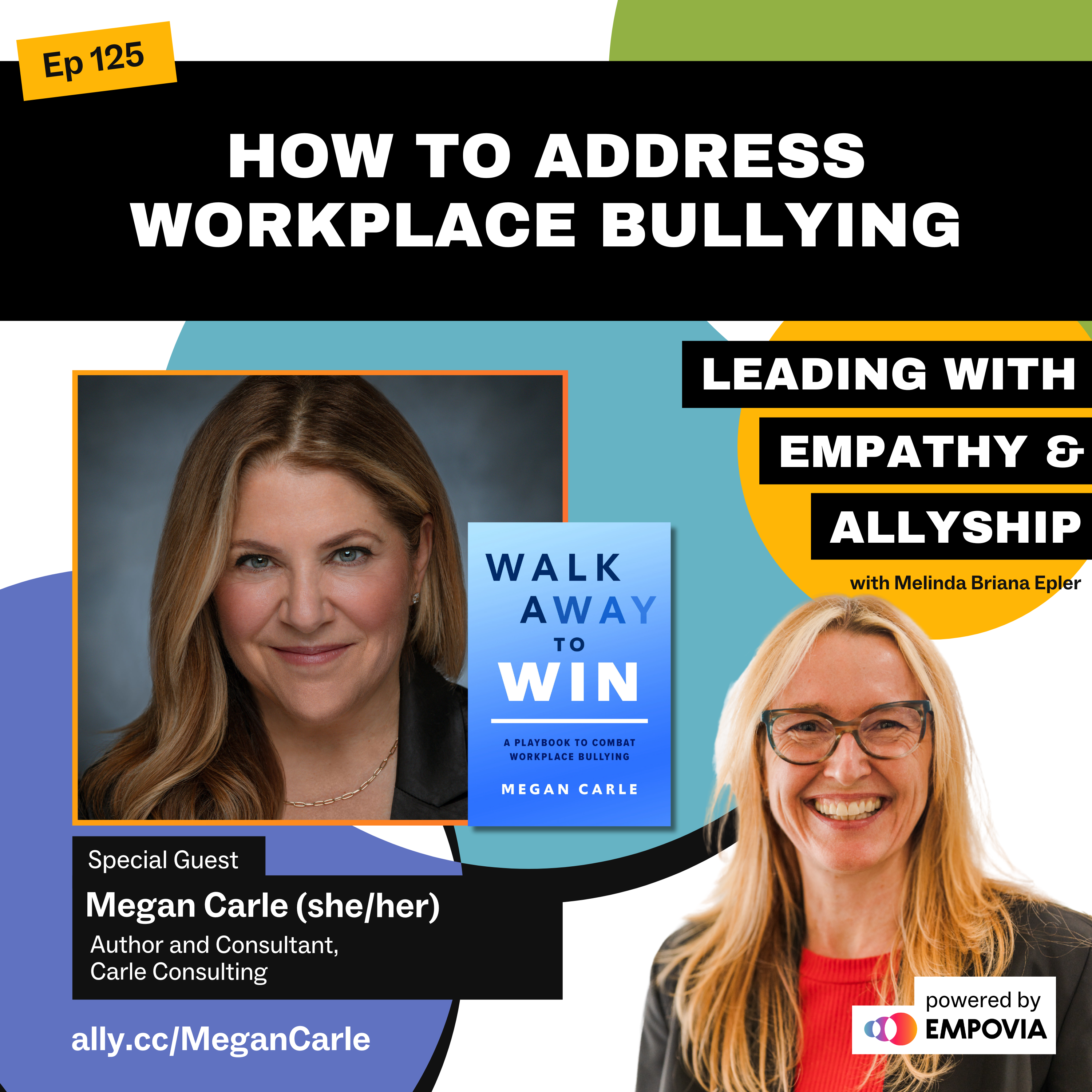
| 49 min
In Episode 125, Megan Carle, Author and Consultant at Carle Consulting, joins Melinda in an insightful conversation on ways to address workplace bullying. They draw from Megan’s book, WALK AWAY TO WIN: A Playbook to Combat Workplace Bullying (McGraw Hill), to discuss various forms of workplace bullying and how to recognize and respond to these harmful behaviors. They share their own workplace experiences and dive into opportunities for leaders and allies to advocate for individuals who have experienced mistreatment and foster a safe workplace culture for everyone’s overall well-being.
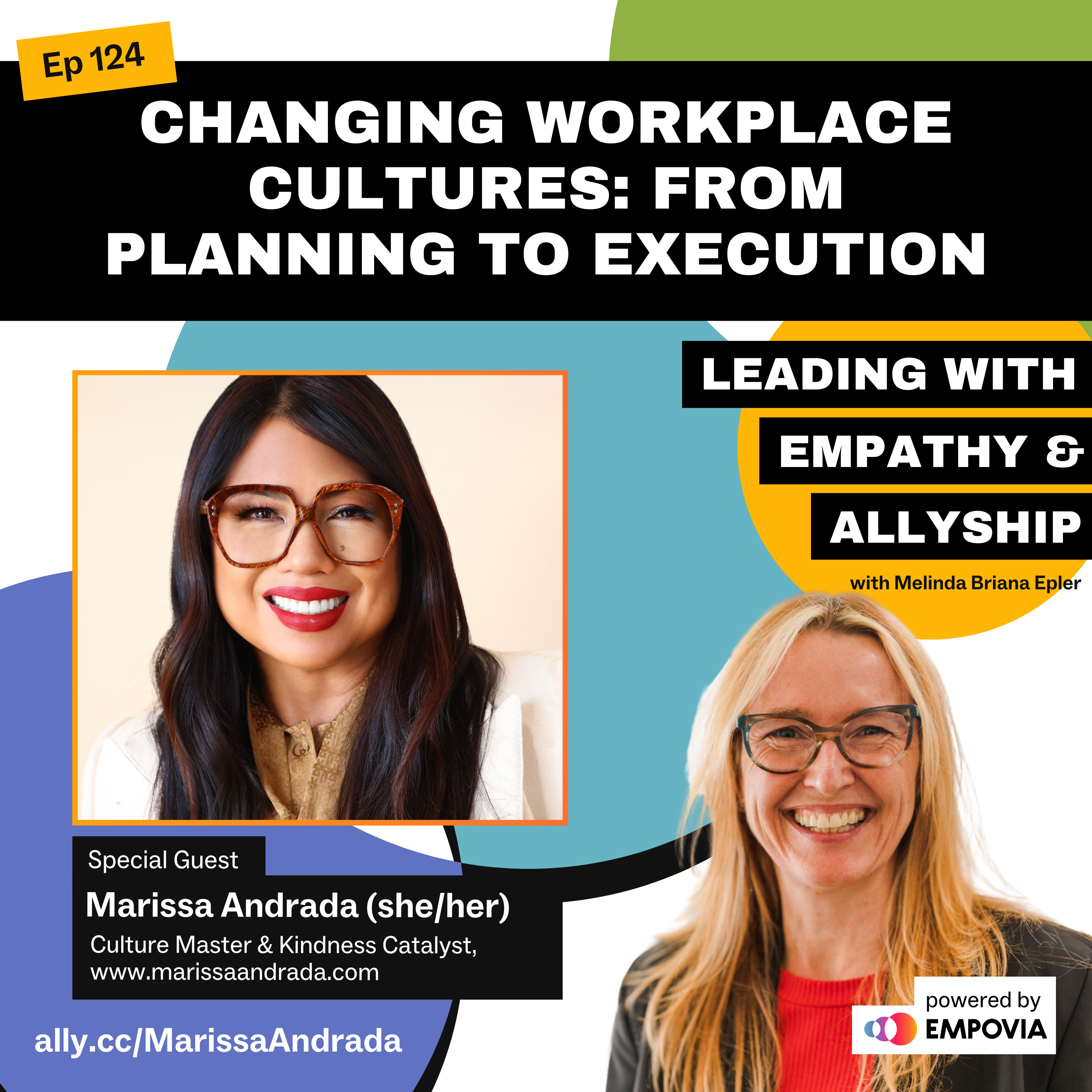
| 53 min
When is cultural transformation crucial for teams and organizations? What can leaders do to empower people in times of change?
In Episode 124, Marissa Andrada, Culture Master & Kindness Catalyst, joins Melinda in a solution-focused discussion on transforming workplace cultures. Marissa draws from her experience in planning and executing culture change across different industries. She shares insights on how we can harness the transformative power of kindness through transparency, empowerment, collaboration, and co-creation. She also explores the importance of building leadership capability and developing incentive programs to encourage people across organizations to meet their goals for transformation.
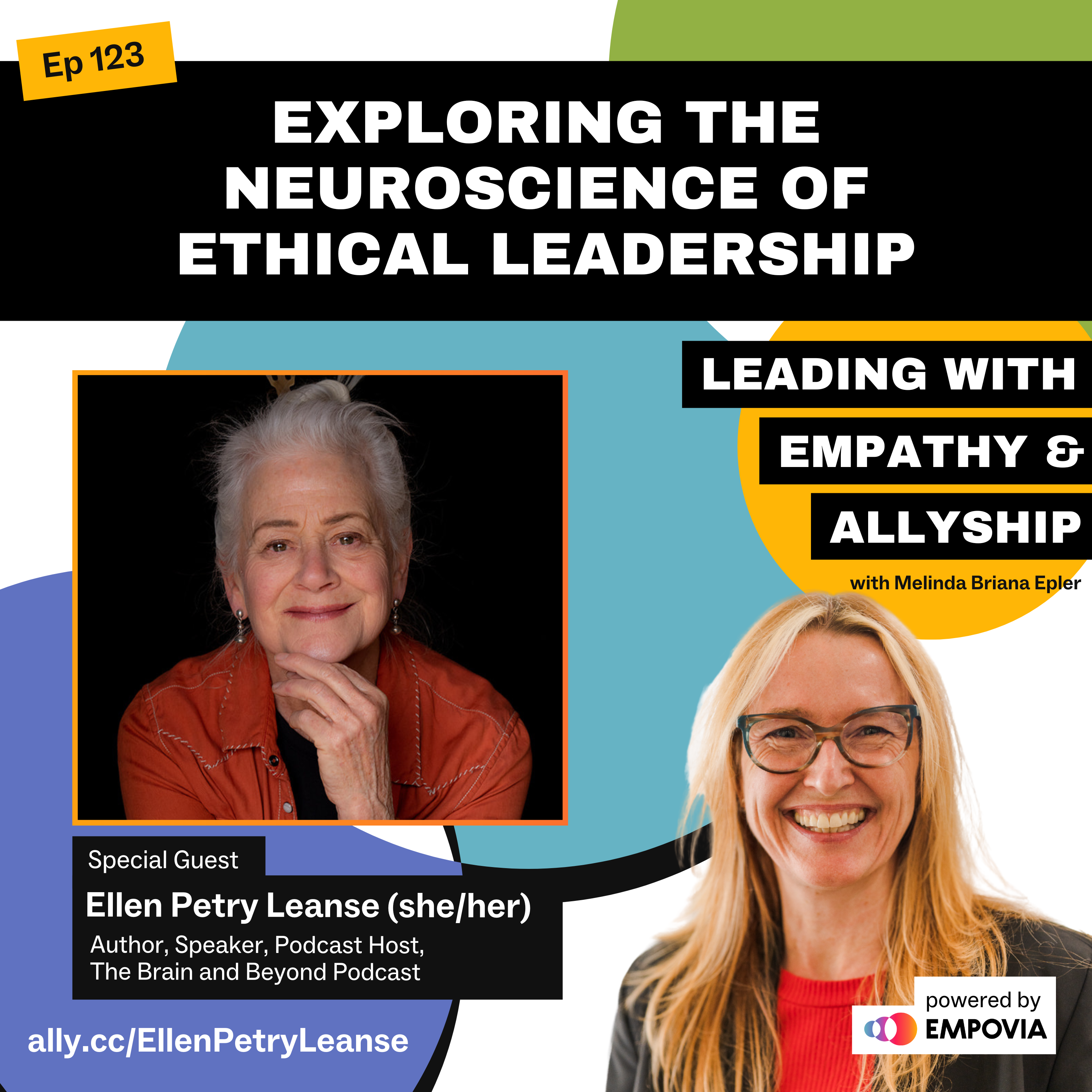
| 49 min
How does a lack of diversity limit one’s cognitive potential? What steps can leaders take to cultivate radical equality and belonging?
In Episode 123, Ellen Petry Leanse, Author, Speaker, and Podcast Host of The Brain and Beyond, joins Melinda in a thought-provoking conversation about the neuroscience behind ethical leadership. They explore how you can engage both hemispheres of the brain to break free from binary thinking and develop the ability to recognize biases. Ellen introduces the concept of homogeneity hijack, how it impacts workplace culture, and why it hinders our ability to be responsive, curious, and open to possibilities. They also discuss essential leadership traits that create space for radical equality and belonging.
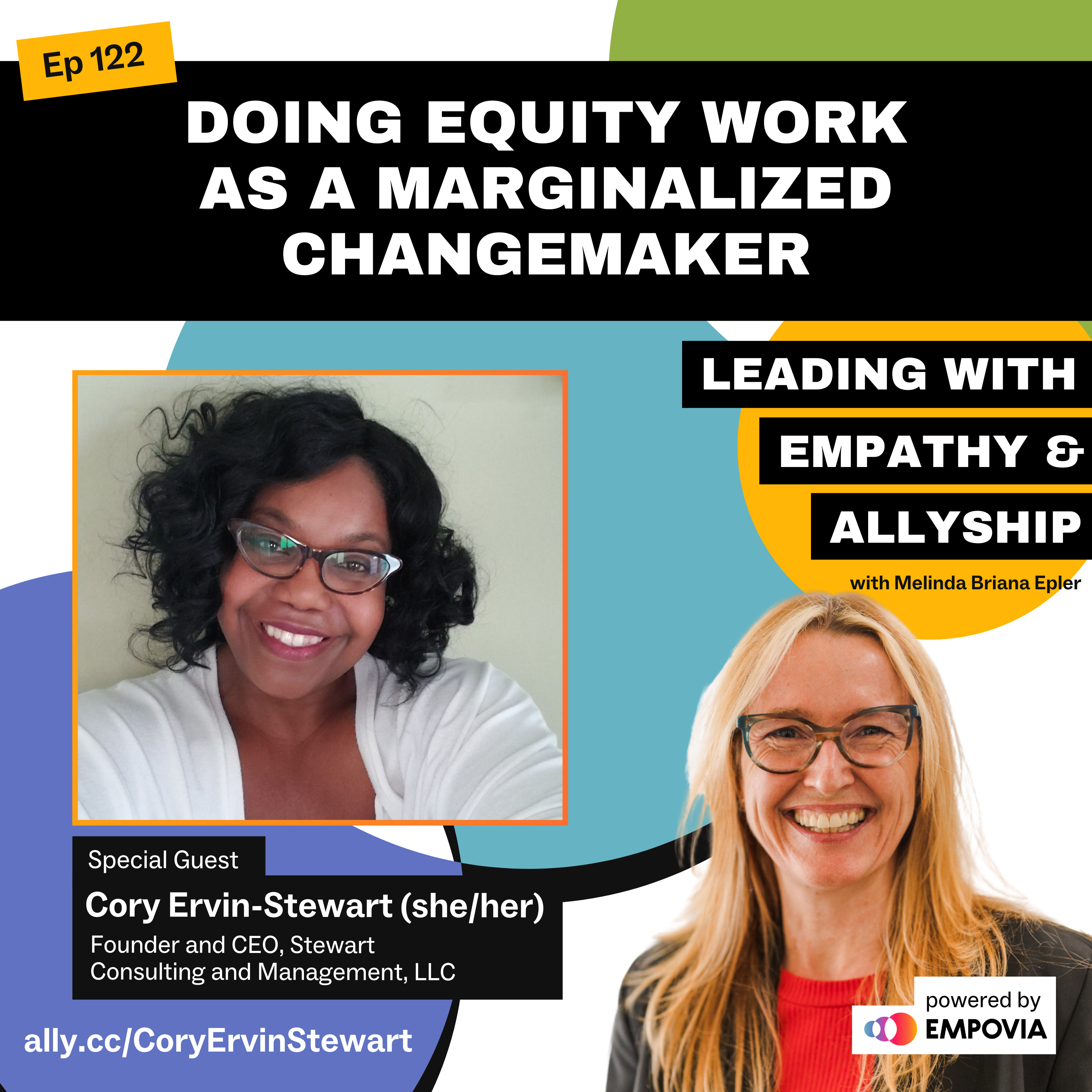
| 44 min
What does it take to maintain confidence and resilience while engaging in equity work? How can self-grace and allyship help underrepresented changemakers?
In Episode 122, Cory Ervin-Stewart, Founder and CEO of Stewart Consulting and Management, LLC, joins Melinda in a candid conversation on navigating the challenges of equity work as a marginalized changemaker. They share personal insights from their experiences in interracial relationships and discuss the importance of self-reflection and self-care practices to address the harmful effects of marginalization. They also explore ways allies can support and advocate for individuals engaged in equity work.
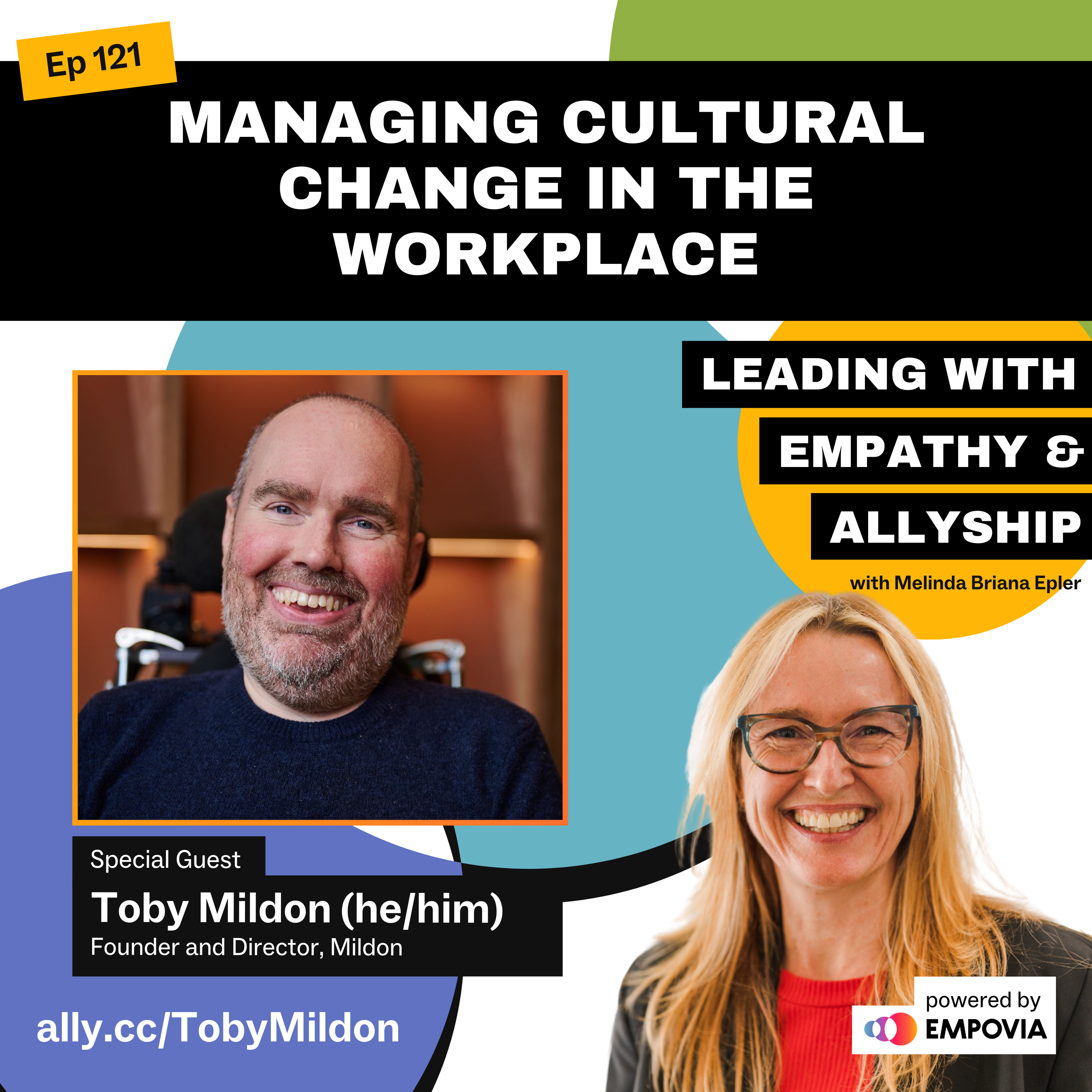
| 42 min
What are the strategies for managing cultural change? How can we measure the impact? And what are the emerging trends that may have an influence? In Episode 121, Toby Mildon, founder & director of Mildon, joins Melinda in an action-oriented discussion on creating organizational culture change. They explore various change management models and strategic frameworks leaders can implement to drive DEI initiatives and measure their impact across teams. They tackle the importance of DEI practitioners taking a human-centered approach to problem-solving and using data to identify and address significant issues in the workplace. They also share insights on emerging DEI trends and the future of diversity, equity, and inclusion in business.

| 46 min
What does 10 years of work in DEI look like? How do you transform an industry? And why are we changing our name to Empovia? In episode 120, Melinda Briana Epler, Founder & CEO of Empovia and Wayne Sutton, Co-Founder & Advisor of Empovia, kick off season 10 with a reflective conversation on a decade of DEI work across various industries, including their impactful work in building inclusive tech ecosystems. They discuss Empovia’s mission to empower inclusive innovation and the launch of a new accessible eLearning platform that provides individuals with actionable steps, tools, and frameworks to create positive change.
About the Host
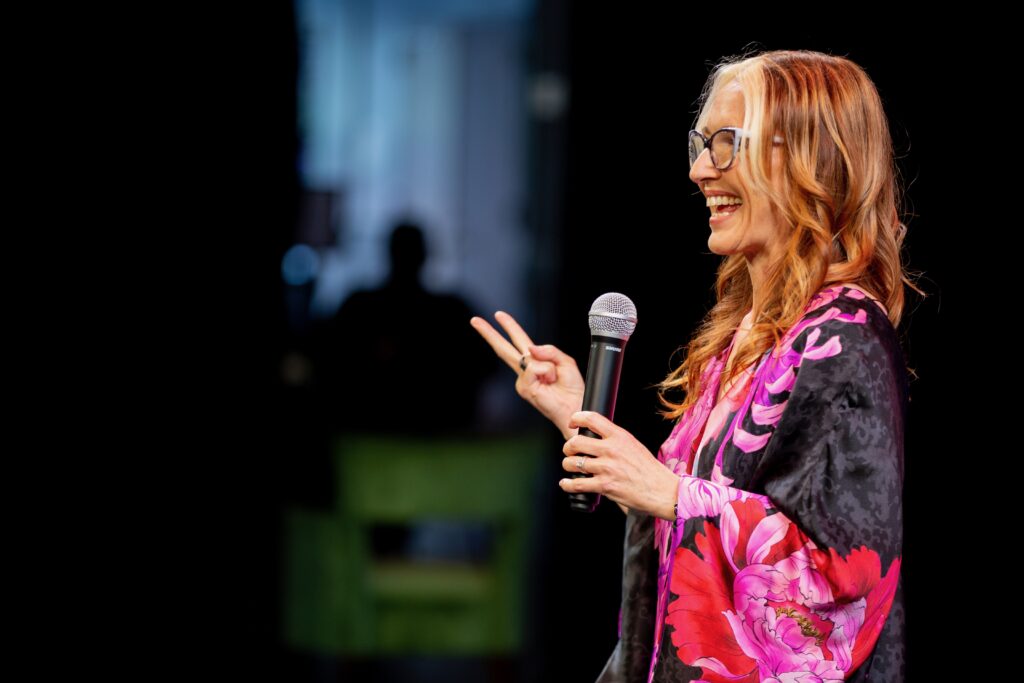
Melinda Briana Epler
(she/her)
As CEO of Empovia, Melinda is a strategic diversity, equity, and inclusion advisor for executives, entrepreneurs, investors, and activists around the world. Melinda is the author of How to Be an Ally (McGraw-Hill), a TED speaker, an award-winning documentary filmmaker, and a former marketing and culture executive who speaks and writes about diversity, inclusion, empathy, and allyship.
Meet the Co-Producers








